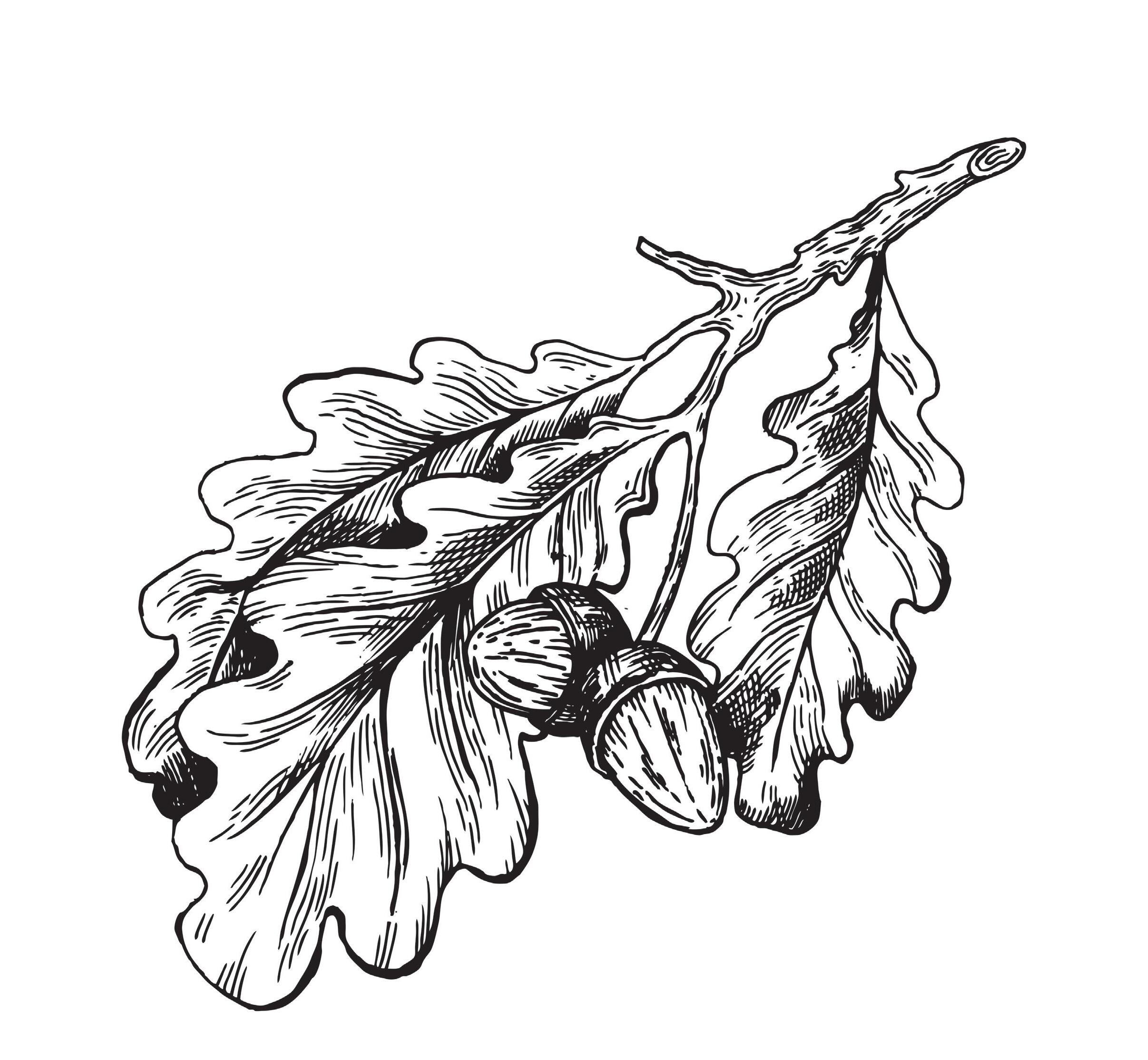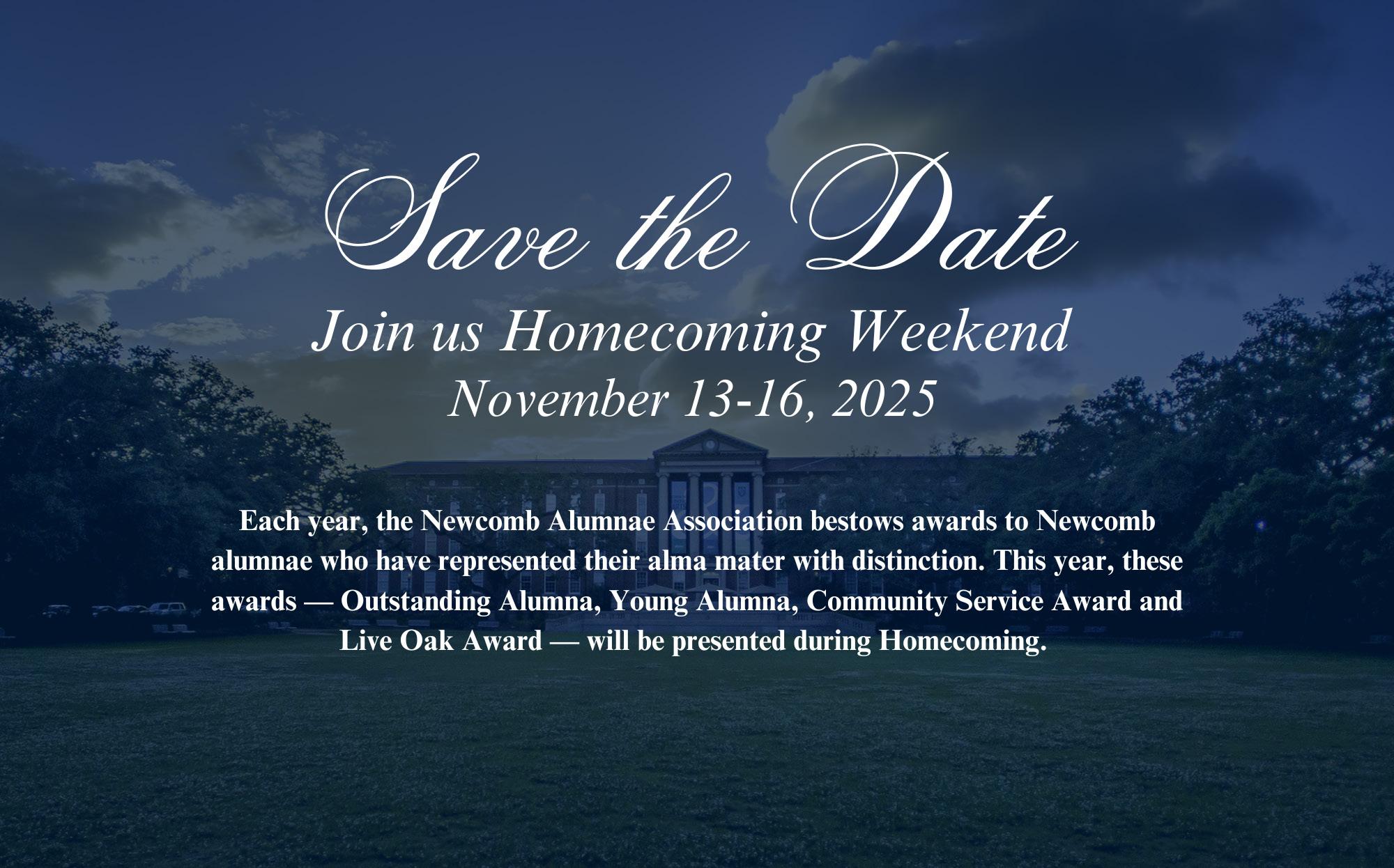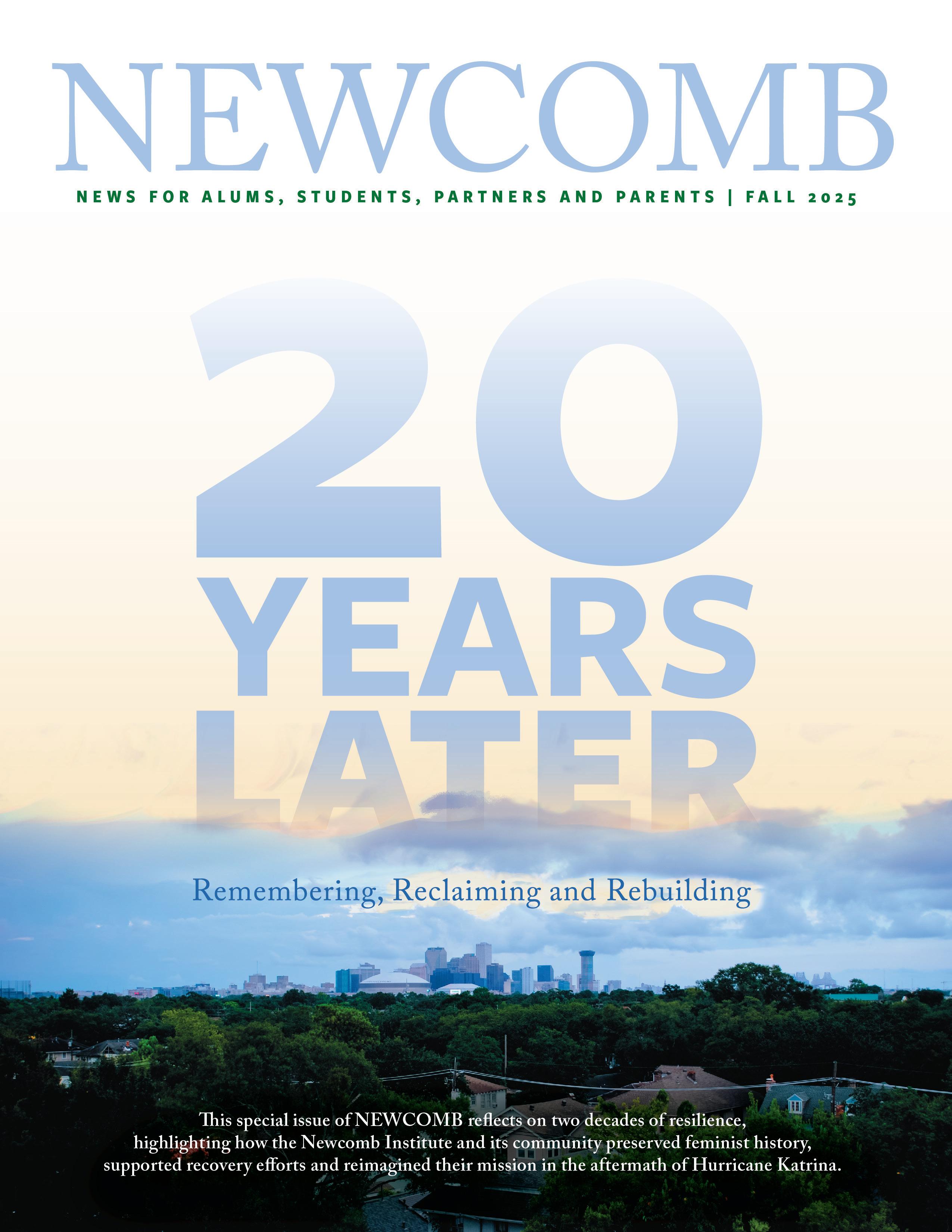
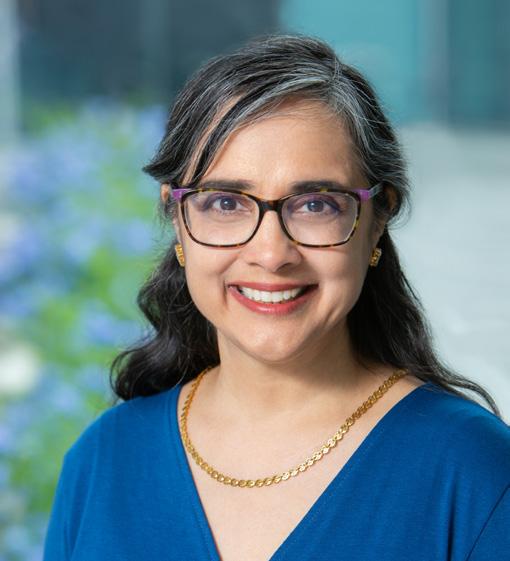



Executive Director
Dear Friends,
As we mark the 20th anniversary of Hurricane Katrina, this special edition of Newcomb magazine offers a blend of personal stories, research insights, and forwardlooking analysis to reflect on Katrina’s legacy and the ongoing work that continues in its wake.
While preparing this issue, we acknowledged the wide range of emotions and memories Katrina evokes. For those who
lived through the disaster, it stirs painful and traumatic recollections. For others, it’s a time to reflect on how far we’ve come since August 29, 2005. It’s one of those events where you remember exactly where you were when it struck — or still find yourself wondering how you got through it. At Newcomb Institute, we are deeply proud of the collective recovery efforts made by so many, and how they achieved it together, in the best way they knew how.
In this issue, we highlight the efforts of the “Dirty Dozen,” a group of alumnae who bonded over a shared mission to volunteer and rebuild houses in New Orleans. Their initiative not only helped restore homes but also fostered deep, lifelong friendships. We also feature alumna, Allison Shapiro Dandry (NC ’03, G *06, B *16), who, inspired by the devastation, shifted her career path to create a foundation dedicated to providing community support through hot meals for those in crisis.
We reflect on the resilience demonstrated by our students, many of whom were in college at the time. They share how experiencing Katrina firsthand shaped their lives and careers, and how the disaster solidified their commitment to making meaningful contributions to their communities.
Through data-driven research, we explore the link between climate disasters and the increased risk of domestic violence in our city and state. These studies underscore the need for targeted response efforts and initiatives to address the most pressing challenges faced by our most vulnerable populations.
We are especially grateful to Beth Willinger, former executive director of what was once known as the Newcomb College Center for Research on Women, for sharing a personal account of how the Newcomb Archives survived the floodwaters. The Newcomb Archives, which have grown in significance since Katrina, now
serve as a vital resource, with enhanced protective measures in place to preserve the history of Newcomb College and the legacy of women in the Gulf South.
What we know for certain is that women were — and remain — at the heart of New Orleans’ resilience after Hurricane Katrina. But rebuilding and continuing to thrive takes the efforts of all of us, working together, to ensure the success of our community for years to come.

Sincerely, Anita Raj,
PhD Executive Director, Newcomb Institute,
Tulane
Professor, Celia Scott Weatherhead School of Public Health, Tulane University
Nancy Reeves Dreux Chair of Women and Public Health



Executive Director
Anita Raj, PhD
Managing Editor
Toria Smith
Editor
Beena Thannickal
Graphic Designer
Tara Brown (SOPA ’20)
Contributors
Julie Henriquez Aldana, PhD
Charles Buchanan
Bernadette Floresca
Lillian Foster (SLA ’27)
Rebecca O’Malley Gipson (SOPA ’21)
Elyse Harrison
Maggie Herman (PHTM ’15)
Emily Kreller (SLA ’26)
Mary-Elizabeth Lough
Anita Raj, PhD
Jessica Scully
Mary Sparacello
Susan Tucker, PhD
Beth Willinger, PhD
Photography
Carrie Chrisco
Allison Shapiro Dandry (NC ’03, G *06, B *16)
Cheryl Gerber
Kenny Martinez
Rebecca O’Malley Gipson (SOPA ’21)
Rick Olivier
Tamara Reynolds
Julie Qiu (SLA ’o7)
Newcomb Archives and Nadine Robbert Vorhoff (NC ’41) Collection
Tulane University
NEWCOMB is published by Newcomb Institute of Tulane University.
Address all inquiries to Newcomb Magazine
Newcomb Institute | Tulane University
Malkin Sacks Commons, Suite 301 43 Newcomb Place, New Orleans, LA 70118
Phone: 1-800-504-5565
NEWCOMB is an annual production of the Newcomb Institute and the Newcomb Alumnae Association. To print a PDF version, visit newcomb.tulane.edu
NEWCOMB is supported by income from interest-bearing endowed funds at the Newcomb Institute, including the Newcomb Alumnae Periodical Fund, established through the kindness of Ann Hodge Macomber (NC ’47).
The H. Sophie Newcomb Memorial College Institute (Newcomb Institute) continues the legacy of the first coordinate women’s college in the United States. Newcomb Institute at Tulane University is a preeminent academic leader in the Gulf South focused on cutting-edge gender equity research, training the next generation and creating change with action.
special issue of NEWCOMB reflects on two decades of resilience, featuring stories of how Newcomb Institute and its community preserved feminist history, supported recovery efforts and reimagined their mission in the wake of Hurricane Katrina. From archival activism to community leadership, we honor the past while looking ahead.
Cover features a sunset view of downtown New Orleans, photographed from the uptown campus of Tulane University on July 24, 2025. Photography and design by Rebecca Gipson (SOPA ’21).
To make a gift, visit giving.tulane.edu/nci


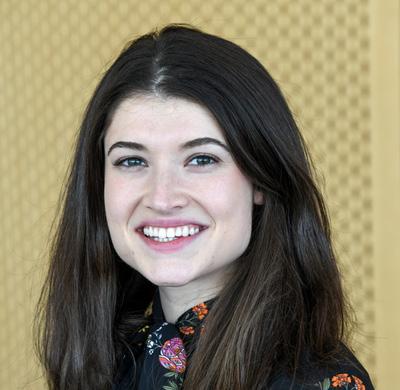
Dear Fellow Alums,
This year marks the 20th anniversary of Hurricane Katrina — an anniversary that calls us to remember, to reflect and to honor the strength and resilience of our Newcomb community.
Over the past several months, I’ve spent time listening to alums who lived through those harrowing days in August 2005.
Many have shared stories of evacuation and uncertainty, of loss and rebuilding, of returning to a changed New Orleans. What I’ve heard most often is not just sorrow, but strength. Again and again, Newcomb alums rose to the moment — caring for loved ones, organizing mutual aid, rebuilding homes and institutions and speaking up for a better, more equitable city.
Katrina was a defining moment. It marked the end of Newcomb College as a coordinate college of Tulane, a loss that still stirs deep feelings for many. And yet, it also marked the beginning of something new: the founding of Newcomb Institute. Created to honor and carry forward the values at the heart of the Newcomb experience — leadership, service, feminist learning, and community — Newcomb Institute has, over the past 19 years, supported thousands of students in their personal and academic growth. It is not a replacement for what was lost but a legacy in motion.
I am one of those students. Newcomb Institute invested in
me, challenged me and helped me find my voice as a leader. It gave me the confidence to step into public service and pursue a career in policy. Through Newcomb Institute, I found community, mentorship and purpose — and I feel deeply connected to the spirit of Newcomb and the generations of women who came before me.
At the same time, we recognize that legacy and loss can coexist. For many alums, Newcomb College was not just a school but an identity. While the Newcomb Institute continues its important work, we know there is still yearning for deeper connection to the history, rituals and sense of belonging that Newcomb College once provided. Your memories, your stories and your continued involvement help us honor that past while shaping the future.
Today, we continue to grow and evolve as a community. Whether through book clubs, Newcomb Networking Night, city-based meetups, our beloved Under the Oaks ceremony or other initiatives, we are finding ways to
gather, to reflect and to support one another.
As we reflect on the 20 years since the storm, I invite you to share your stories — of hardship, of healing and of how Newcomb shaped the way you moved through that time. We want to honor your experience, learn from it and carry it forward. It’s through this intergenerational community — one rooted in compassion, strength, and shared purpose — that I’ve come to better understand what it means to be a Newcomb alum.
Whatever your path since graduation, the Newcomb Alumnae Association is your home. A space of memory and momentum. A space where your story matters.
Warmly, Maggie Herman (PHTM ’15) President Newcomb Alumnae Association
Maggie K. Herman (PHTM ’15)
President
Andi Schippert Richardson (NC’99)
Immediate Past President
Tammy Thaggert, MD (NC ’91)
Vice President of Alumnae
Julia Ann Broussard (SLA ’10)
Vice President of Students
Chelsea Balch Cipriano (SLA ’10, PHTM *11)
Secretary
Heather Yanak (NC ’97)
Treasurer
Amie E. Hurst Adams (NC ’92)
Tara M. Auclair (NC ’96)
V. Claire Breedlove (NC ’05, SW *21)
Allison Hillman Buchalter (NC ’92 )
Kelsey R. Casano (SLA ’15 )
Kim Frusciante (NC ’05 )
Sam Burns Goldstein (NC ’04 )
Lauren E. Gaines (SLA ’20, SoPA *23)
Isabella F. Johnson (SSE ’19, SSE *20)
Rachael Kennedy Kuntz (NC ’98)
Sharan Lieberman (NC ’99, L *02)
Alyssa Dausman Lovelace, PhD (NC ’97)
Clare E. Owensby (SLA ’11 )
Jasmine M. Robinson (SSE ’09, SCS *12 )
Lauren M. Wethers (SLA ’15, SLA *16)
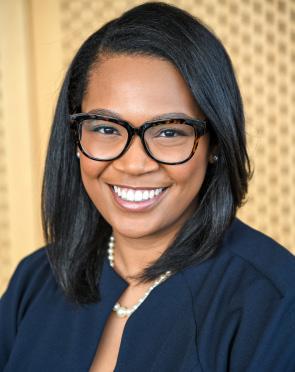
Senior
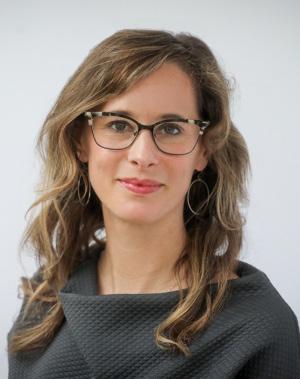
Lindsey Purcell Director of Development, Individual Giving
By Mary Sparacello
WhenHurricane Katrina devastated New Orleans, a dozen Newcomb College alumnae felt called to help. It all began when Cheryl Josephs Zaccaro (NC ’69), a retired occupational therapist, signed up with Habitat for Humanity in February 2006. Moved by the scale of the need in New Orleans, she returned that December — and brought along some of her Sigma Delta Tau sorority sisters.
What began as a single week of service became a yearly tradition.
Rachelle Galanti Parker (NC ’69) remembers how unusually chilly that first December, 2006, in New Orleans felt. Many of the women hadn’t reunited in years, but they joined forces and rolled up their sleeves to rebuild together. “We came together, and honestly, it became a team effort,” said Parker, now a retired elementary school principal from New York City.
The group included mostly alumnae from the class of 1969 (with a few from 1971), representing different schools and majors. They came from across the United States and worked in various careers, including teaching, social work, law, communications,
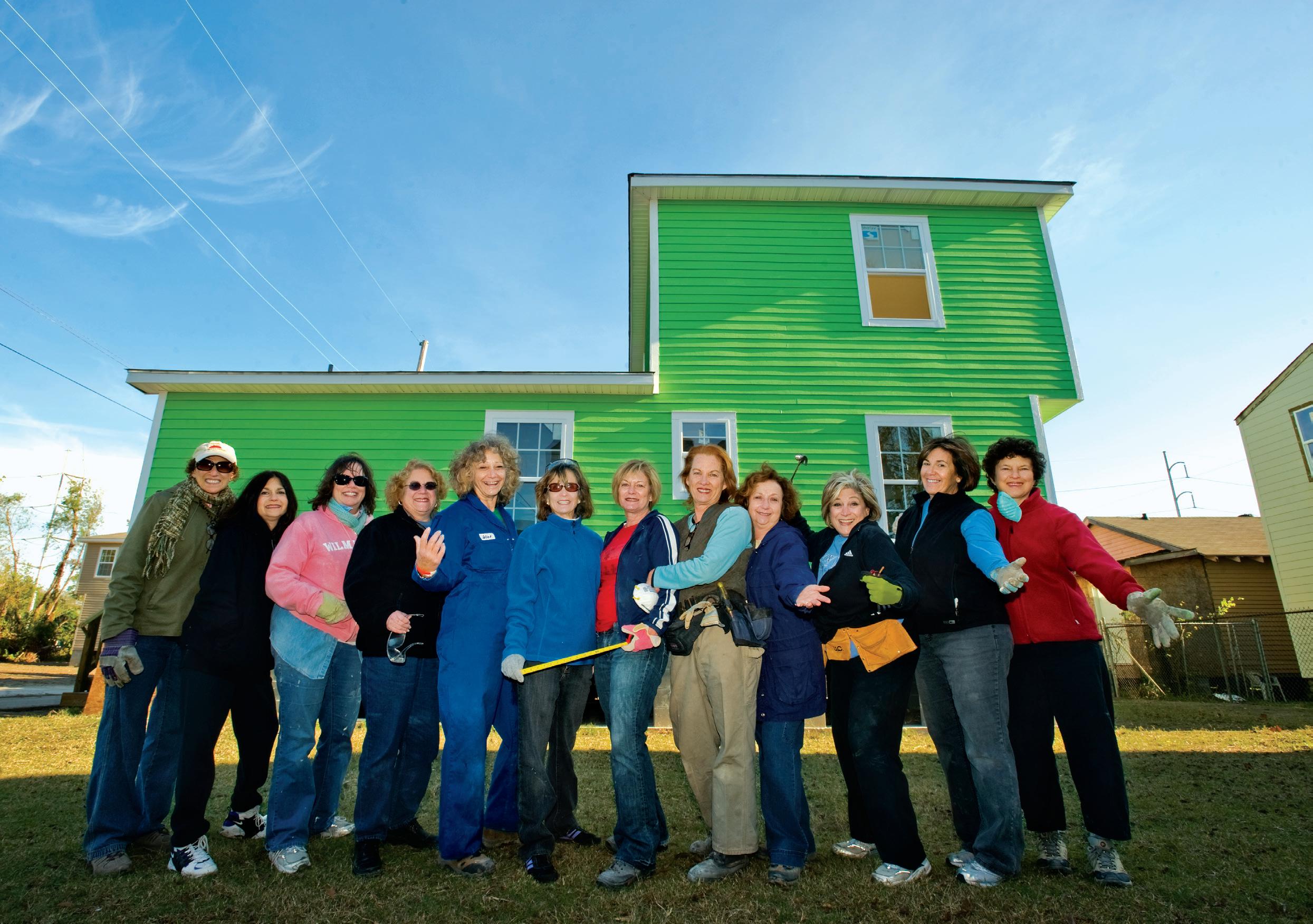
–Rachelle Galanti Parker (NC ’69) “
I have never been a person who’s done physical work around houses. But that was, for me, so exciting. I learned to paint. I learned to get up on roofs and climb ladders.
finance and marketing. Some still held full-time jobs, while others had retired. They were on different paths with distinct personalities, but they came together for the greater good.
Their efforts not only supported the city’s recovery but also rekindled lifelong friendships. “This reawakened our love for the city,” said Janis Dropkin Smythe (NC ’69), now a retired commercial music producer living in Florida. “Some of the women I hadn’t seen between graduation and Katrina — now I see them all the time.”
The New Orleans that the women arrived at that first December when they volunteered — more than a year after Hurricane Katrina — was in full recovery mode, with many New Orleanians still displaced, living in other cities or in FEMA trailers. Entire neighborhoods were still deserted and showed visible standing floodwater marks.
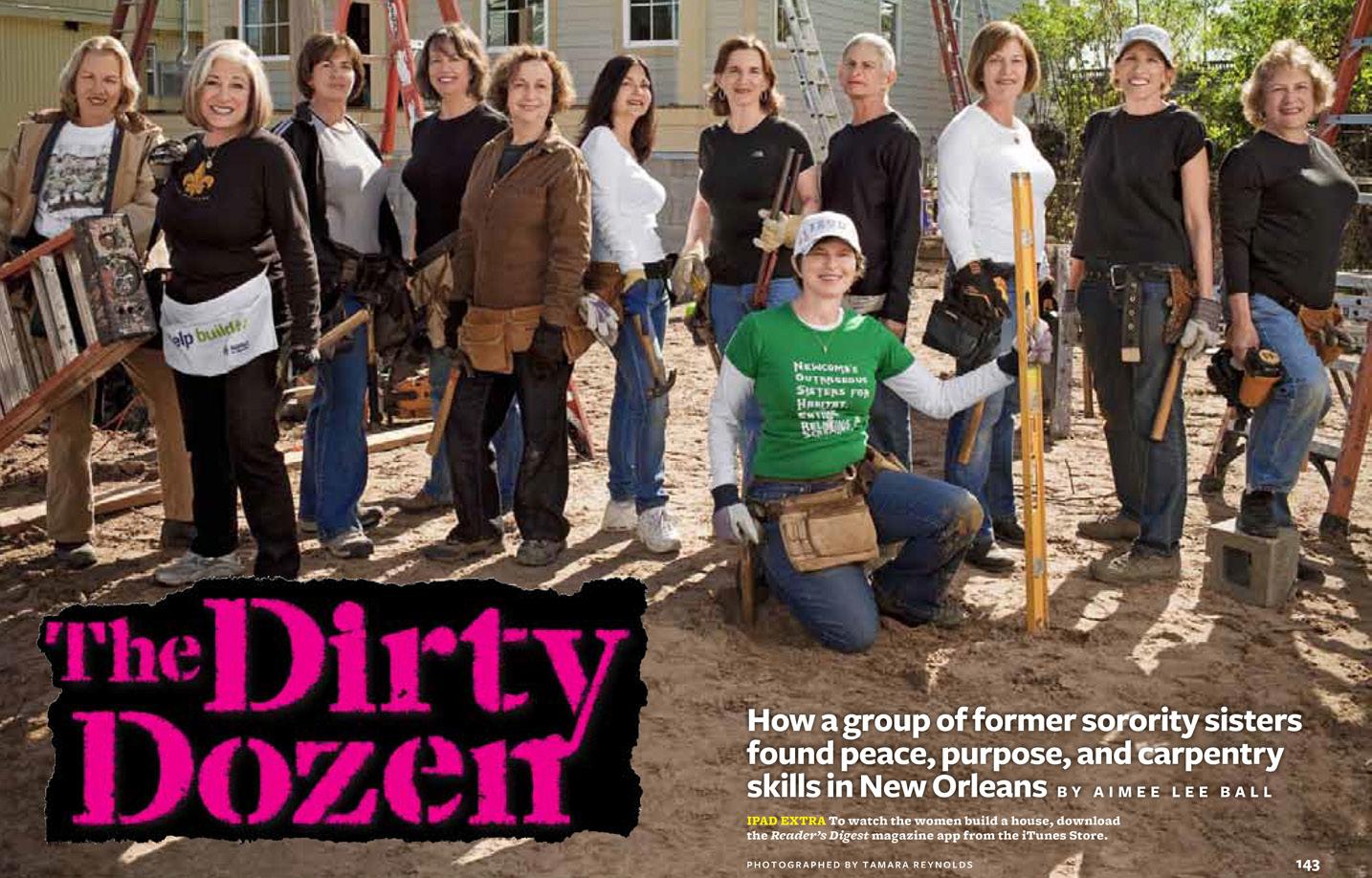
Under Habitat for Humanity’s training, the Newcomb alumnae pitched in fully: hammering nails, sawing wood, spackling walls, building chain-link fences, installing siding and cabinets and more.
Before 2006, Parker said she had little experience with house construction, which made the physical labor deeply meaningful. “I have never been a person who’s done physical work around houses. But that was, for me, so exciting. I learned to paint. I learned to get up on roofs and climb ladders.”
They became known as the “Dirty Dozen,” a nickname coined by a journalist in a 2011 Reader’s Digest article that chronicled their work. Their dedication and spirit caught national attention, earning them a spot on “The Queen Latifah Show” in 2013.
The first Habitat home they worked on belonged to Kewanda Baxter, a single mother of three whose house in New Orleans East had been destroyed by Katrina. Now living in Musicians’ Village in the Upper Ninth Ward, Baxter became a friend. The alumnae have stayed connected with her for 19 years, gathering for dinners when they’re in town, and Carolyn “Puddin” Brown Cox (NC ’71) has kept the bond strong: if Baxter needs support — repairs to her kitchen, tutoring for the children — Baxter reaches out to Brown, who rallies the alumnae network to help.
Shala Carlson (NC ’93), a member of the Newcomb Institute Director’s Advisory Council and Habitat for Humanity International’s senior director of brand and content strategy, is inspired by the group’s long-time dedication, which she says is essential to the survival of cities that experience disaster.
“It’s easy in the immediate aftermath [of a disaster] because you see it everywhere, and you want to stand up and do something. But these are people who have committed over the long term to keep coming back. I love that they love New Orleans enough to want to come back and do this, and that Habitat could provide the forum for them to do that in a really meaningful way.”
The recovery of New Orleans after Hurricane Katrina would not have been possible without the help of volunteers, like the Dirty Dozen, who came from across the country and around the world. From gutting homes to rebuilding entire neighborhoods, volunteers played a vital role in helping the city rebound. Most of the alumnae are now in their late 70s, and while they may spend less time wielding hammers, they continue to return to New Orleans regularly — supporting local businesses, catching up over long meals, and deepening friendships that began more than 50 years ago. Their commitment to the city — and to each other — remains as strong as ever.
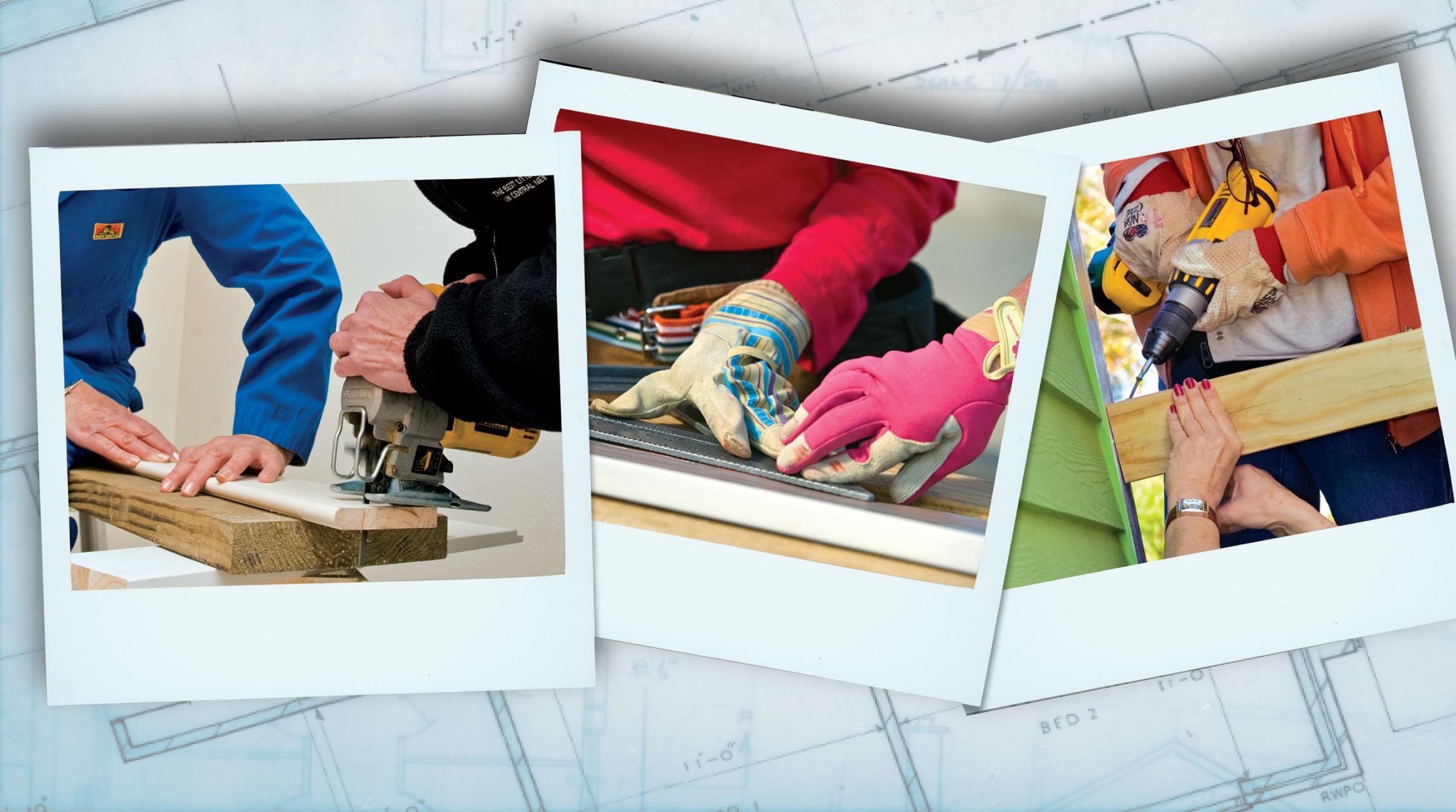
Their shared history, forged in Newcomb’s all-women dorms and sorority life, grew even stronger through the experience of giving back. “It definitely deepened and enriched my friendships,” Parker said. “We love each other, and I have to say that it was Newcomb College that created that bond.”
Smythe said that giving back sparked something lasting: many of the women now visit New Orleans more often, not just for the volunteer trip. She herself comes several times a year. “It’s almost like a second home. It’s become more a part of my life than it was before Katrina.”
For Parker, too, her connection to New Orleans and Newcomb has grown stronger. She became a member of Newcomb Institute’s Director’s Advisory Council four years ago, and she hosts Newcomb students and alumnae in her New York City home. “I love New Orleans more.” She now has another personal tie to Tulane — her grandson is a rising sophomore.
Plans are already underway for another return in 2026 — a testament to the friendships they’ve rebuilt and the lasting foundation of love they’ve laid for the city.
Caption for image on page 4: Amy Goldberger, Sandy Daum Berman, Janis Dropkin Smythe, Linda Lewis-Moors, Carol Nathan McKegney, Sydney Fleischer Camp, Sharon Graber Purcel, Cheryl Josephs Zaccaro, Marilyn Zwick Storch, Carolyn "Puddin" Brown Cox, Debbie Brown Britt, and Rachelle Galanti Parker take a break from the construction of a Habitat for Humanity house on Ferry Place in December 2008. It was the group's third rebuilding trip to the city.

By Jessica M. Scully
WhenHurricane Katrina devastated New Orleans neighborhoods 20 years ago, newspaper pages and television screens were full of scenes of the immediate damage. But the hurricane’s harms went far beyond the short term.
Within a few years, researchers realized Katrina had contributed to a less visible but very serious and sometimes deadly issue: domestic violence. It continues to be a major problem in Louisiana, and tragically the state has among the country’s highest rates of death from domestic violence.
“Hurricane Katrina illuminated the magnitude of the impact natural disasters and extreme weather events have on our communities, both socially and economically,” said Anita Raj, PhD, executive director of Newcomb Institute at Tulane University.
Research since Katrina both locally and globally has found a link between adverse climate events and domestic violence. In 2010, Tulane University’s Celia Scott Weatherhead School of Public Health and Tropical Medicine professors found higher rates of domestic violence among survivors shortly after the hurricane.
Raj, a professor in the Celia Scott Weatherhead School of Public Health and Tropical Medicine, examined domestic violence from a state and local perspective through the 2023 Louisiana Violence Experiences Survey (LaVEX). The study examined the extent and nature of violence in Louisiana, including domestic violence, and how it affects individuals and communities, addressing the gap in data on violence.
The LaVEX study revealed how common domestic violence is in Louisiana and the cost associated with it, with more than one in five Louisiana adults who saw their mother physically abused by a partner when they were a child. It has furnished essential information that’s helped advocates secure better resources for survivors, and it has also provided useful information which can assist further research on violence and serious climate events.
The findings from LaVEX prompted Raj to delve into the connections between adverse climate events and domestic violence. One contributing factor may be higher-than-normal temperatures. “Heat is agitating, and we all get irritated when it’s hot,” she said. “Higher temperatures can make domestic violence incidents more likely and exacerbate them. What starts as pushing can lead to a woman feeling more threatened, or a child is threatened, and she calls the police,” she said. Raj notes that research indicates that pushing or shoving can escalate to more violent attacks.
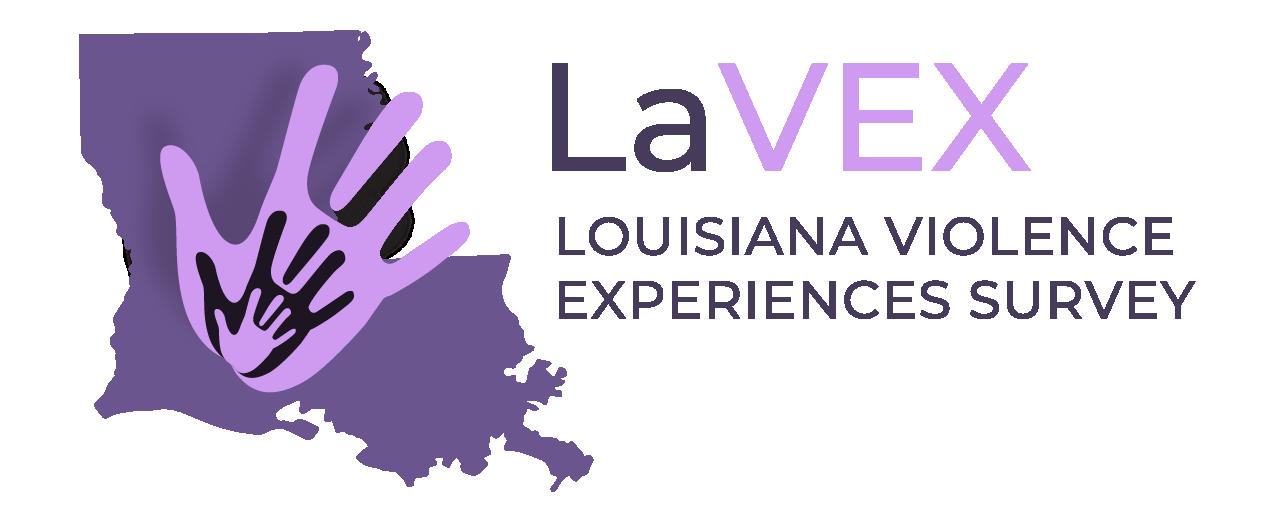
Extreme weather events can be major disruptions, and certain experiences can be associated with added stressors, including economic stress. For example, Raj noted that heavy rains are

common in the state. If heavy rains cause flooding, getting to work, school, or other destinations can be stressful. And if the rains lead to power outages, then that can cause financial stress.
“When the power goes out, there goes all your food. It may have cost hundreds of dollars, and people don’t have the funds to replace it,” she said.
Adverse climate events can create other sources of stress, Raj said. People may be isolated in their homes without enough food or water to weather an emergency. In extreme events like Katrina, they may be displaced for months or years from their neighborhoods and support systems and in unfamiliar surroundings.
“By themselves, heat and stress shouldn’t make someone lash out at a partner. But when taking out anger on someone else has been normalized, heat and stress make that more likely, and that seems to be the case for many families in Louisiana,” she said.
In a 2023 article co-authored by Raj, she analyzed domestic violence 911 calls in New Orleans from January 1, 2011, to July 1, 2023. Her findings showed a steady increase in calls every year from April to August, coinciding with hotter months that brought more rain and frequent power outages. These periods also experienced temperatures and rainfall above historical averages.
In a new article published in JAMA Network Open this August, Raj’s study reveals that these domestic violence calls surged during extreme heat events, with the most significant rise, 7 percent, occurring during heatwaves lasting five days or more.
“We continue to see adverse climate events correlated with increases in domestic violence for our city, and it’s something we have to recognize, think about, and address,” Raj said.
In 2026, Raj and other researchers at the Institute will study calls in southeastern Louisiana to a social services resources line and a suicide and crisis line during extreme heat and rain.
“With all of our research, our goal is to democratize data. Once we collect it, we make it freely available to everyone,” she said. “We want to provide information that’s useful to Louisiana. Ultimately, we hope this work helps support preparedness and response efforts and identify areas of greater need.”
Louisiana’s safety net for domestic violence survivors has historically been poorly funded and resourced, said Mariah Wineski, executive director of the Louisiana Coalition Against Domestic Violence, which is a community partner of the Institute.
The Coalition has tracked requests the state received for shelter but couldn’t meet, Wineski said. It found over 2,500 unmet requests each year.
“That’s terrifying when you think of the situation that somebody is in and the amount of bravery it takes to even make a phone call, just to find that no help is available,” she said.
Wineski had long worked with another advocate for survivors, Charmaine Caccioppi, executive vice president and chief operating officer of the United Way of Southeast Louisiana, and another one of Newcomb Institute’s community partners, on getting state funding for survivor services.
To support their case, Caccioppi asked Raj if she could calculate how much domestic violence costs the state annually. Raj and her research team determined it was a staggering amount: $10.1 billion in medical expenses, lost productivity and criminal justice costs.
“That calculation validated our point that if the state didn’t make these investments, the increased need would just fall on the shoulders of local governments and the federal government,” Caccioppi said.
The state government recently renewed $7 million in annual funding for domestic violence services for a third year. That has meant major improvements for survivors, according to Wineski. Existing shelters have been renovated with family rooms and more beds, five new shelters have been built and 11 outreach offices offering a range of services for survivors have opened around the state.
For Raj, providing the information that helped make those improvements possible was “truly one of the things I’m most proud of in my career,” she said. “It’s my sweet spot when we can produce the data people need to fight for resources for these issues.”
By Mary-Elizabeth Lough, PhD

Allie Shapiro Dandry (NC ’03, G *06, B *16) is proud of her philanthropic work with the Krispy Krunchy Foundation.
Carewas always on the menu for Allison Shapiro Dandry (NC ’03, G *06, B *16).
She came to Newcomb College with a history of volunteering under her belt and a plan to head to medical or veterinary school after graduation. At Newcomb, she swiftly found herself in a community of like-minded peers.
Shapiro Dandry completed her BS in neuroscience in 2003, continuing on for her MS in the field. When Hurricane Katrina made landfall in 2005, she was able to evacuate to California but the devastation of the storm changed everything.
“Katrina changed a lot for me. I didn’t end up going to medical school. I totally changed what I wanted to do. You want to get out and see the world and [after Katrina] I really just wanted to come back and make New Orleans better,” recalled Shapiro Dandry. She described her path as having been a winding one. While she didn’t end up becoming a doctor, her journey led her to a career that was profoundly impactful — both personally and professionally. Today, she remains dedicated to making New Orleans a better place.
The storm impacted her family’s business as well. Her father, Dan Shapiro, was an owner and executive vice president of Krispy Krunchy Chicken. When the storm hit, most of the stores were lost. The family was ultimately able to keep Krispy Krunchy operational through the kindness of vendors and even strangers. It was an impactful moment — one that helped set the brand, and later her, on a new course.
“It inspired us,” said Shapiro Dandry. The kindness and generosity they experienced transformed into a powerful source of motivation for her and her family, prompting Krispy Krunchy Chicken to develop a food truck program that could swiftly mobilize to bring hot meals to communities affected by natural disasters including hurricanes, tornadoes and fires.
Krispy Krunchy now had the capacity to mobilize their food truck and provide thousands of hot meals a day to families in the wake of a disaster, staying up to two weeks if needed and going directly to where support is needed most. In addition to natural disasters, the organization delivered more than 20,000 free meals to communities affected by the COVID-19 pandemic.
“We could get into what Katrina taught us about what not to do, but we just looked at it and thought, ‘You know what — what can we do to be better?’”
Shapiro Dandry joined Krispy Krunchy in 2011 as director of communications and technology and in 2023 became executive
“ This foundation isn’t just an extension of our family’s values — it’s personal for me. I grew up understanding the importance of community investment, and this foundation is an opportunity to directly influence meaningful change in the city we love.”
director and board president of the Krispy Krunchy Foundation, leading its transition to an independent, New Orleans-centric nonprofit.
This July, Shapiro Dandry and her family took their commitment to the community to the next level. After raising nearly a million dollars collectively through their private and business efforts, the family officially launched the Shapiro Family Foundation. Their new foundation aims to create lasting positive change throughout New Orleans by addressing disparities in hunger relief and education access and equity. The foundation builds partnerships with local nonprofits that have deep connections to the community, helping to expand their reach, strengthen their programs and ultimately create lasting positive change throughout New Orleans.
Shapiro Dandry will also serve as the foundation’s executive director. “This foundation isn’t just an extension of our family’s values — it’s personal for me. I grew up understanding the importance of community investment, and this foundation is an opportunity to directly influence meaningful change in the city we love.”
Though Shapiro Dandry’s career is altogether different than what she first envisioned, she credits Newcomb as an essential part of her journey. Today she remains deeply connected through her ongoing work as a member of the Newcomb Alumnae Association Board of Directors.
“The education was wonderful but also learning from my cohort and those around me, Newcomb grads and Newcomb students, was wonderful. The people that you meet through [Newcomb] are some of the most understanding and caring. I know that I graduated with a better understanding of togetherness and giving back from a lot of the service learning projects, the forward thinking of professors, and some of the discussion topics.”
“[At Newcomb] you learn more about who you want to be — not even a career — what kind of person you want to be. Newcomb really helped shape that in me.” It’s a quality that Shapiro Dandry sees thriving at Newcomb Institute.
“Obviously, we’re in a new world, but there is still that sense of understanding, of wanting to learn and grow and figure out how we can be of best assistance. What I saw and what I see now are still the same vein of togetherness and giving back.”
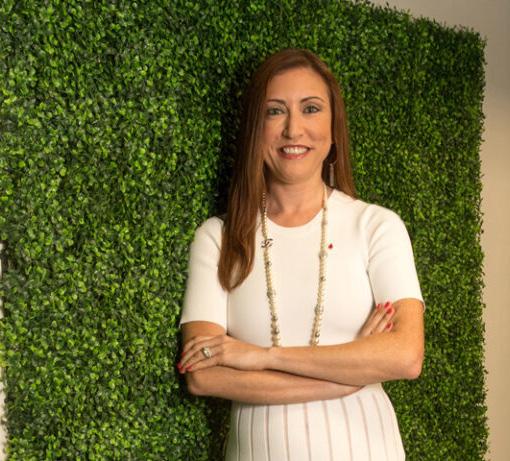

By Beth Willinger, PhD and Susan Tucker, PhD
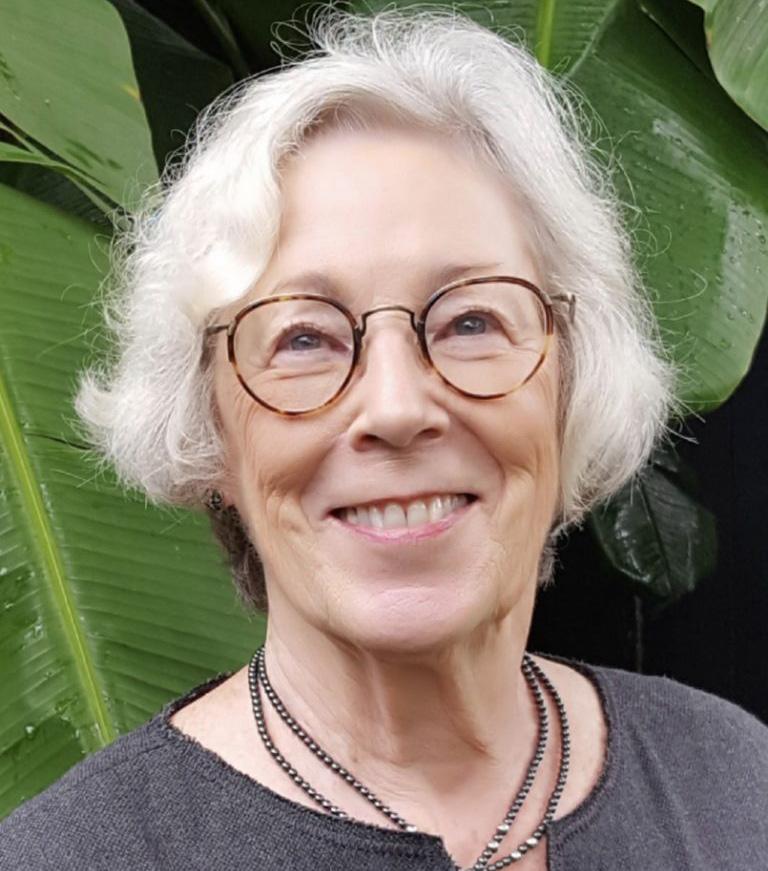
Beth Willinger, PhD, executive director of Newcomb College Center for Research on Women from 1982-2007, shares her first-person account of saving the Newcomb Archives in the days after Hurricane Katrina, with reflections from Susan Tucker (NC ’72), archivist from 1989 to 2015.
OnSeptember 8, 2005, with the help of a neighbor, I made my way to Caroline Richardson Hall across a flooded, eerily quiet campus in a pirogue. Time was short because the pass into the city allowed for a stay of only five hours. I quickly grabbed my computer from my office, observed that the second floor showed no visible damage and then reluctantly unlocked the door to the first floor Seltzer-Gerard Reading Room and Newcomb Archives. Before evacuating, we had hung plastic sheeting over bookcases and removed materials from bottom shelves. It was immediately evident that no amount of planning could have foreseen the damage caused by the rush of water following Hurricane Katrina.
Susan made her way to campus on September 11, also a trip limited by city pass regulations. By then, the water was no longer deep but little fish swam in the remaining flood water on Newcomb Place. Going into the Reading Room,
Susan found what I had seen: shelves toppled, water-soaked books and boxes and mold beginning its run up the walls. The Katrina stench was pervasive. We began then to ask for help, writing to the National Endowment for the Humanities (NEH) for a Disaster Recovery Grant.
The Newcomb Archives were established in 1989 with a grant from the National Historical and Preservation Society to preserve the history of Newcomb College as the first coordinate college for women in the United States. Then Congresswoman Lindy Boggs, (NC ’35), was instrumental in our securing the grant. In the 15 years leading up to Katrina, Susan and other archivists had written our collection development policy to emphasize materials on the history of women at Newcomb College and Tulane University, the
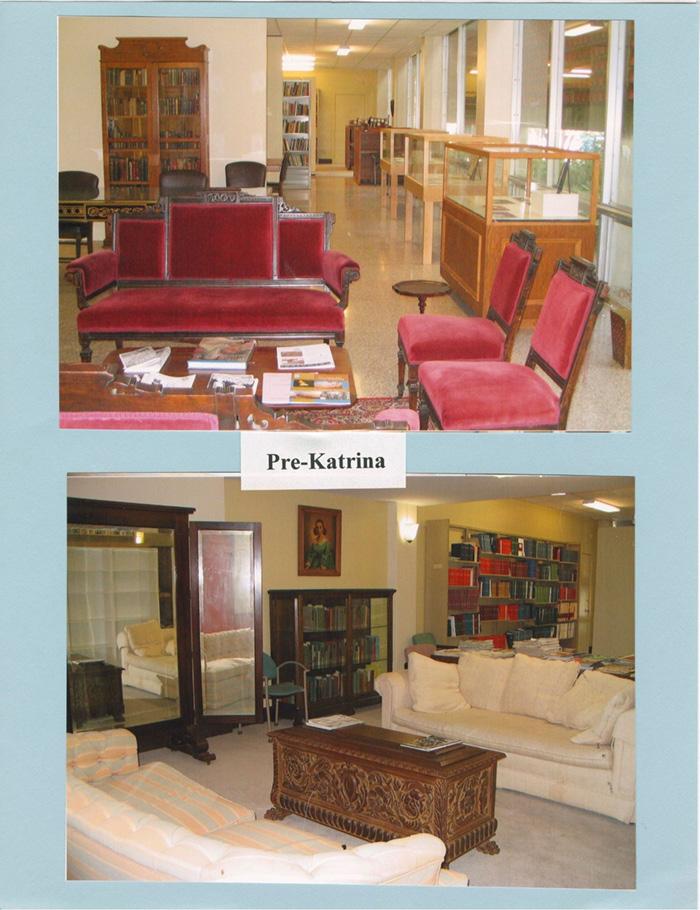
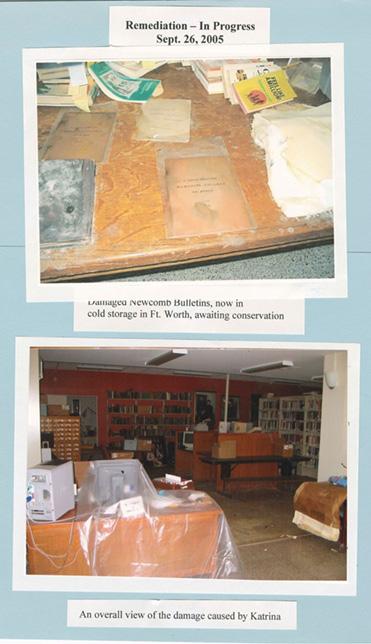

education of women in the American South and women activists in the state.
Some of the collections about these subjects were the ones we had to lift from the wet floors. By October 6, when Uptown was opened to residents, Susan was allowed to work alongside the University-contracted property restoration company, Belfor, in removing everything from the Reading Room. At least three huge yellow pipes poured air into the building, but all was dark and still mold grew everywhere. Susan and some 30 men removed and wiped down every book and box showing any damage or wetness. Some materials were sent to storage in New Orleans, others to be freeze dried and pressed in Texas. I spent a day at Belfor’s Technical Service Center in Fort Worth
identifying materials that were valuable enough to warrant the next stage of intensive treatment. The majority of those documents and materials were recovered and came back to us in February 2006.
While the storm brought a new realization of the fragility of paper, it also highlighted the need for and importance of feminist research and activism. We received overwhelming support from so many individuals and groups including the Zale Foundation, National Endowment for the Humanities (NEH), the Southern Archivists Association, Southeastern Library Association and student volunteers from the University of Michigan. Donations to the archives increased.
Our Katrina Research Group published “Katrina and the Women of New Orleans,” a collection of reports relating to the status of women, domestic violence, LGBTQ+
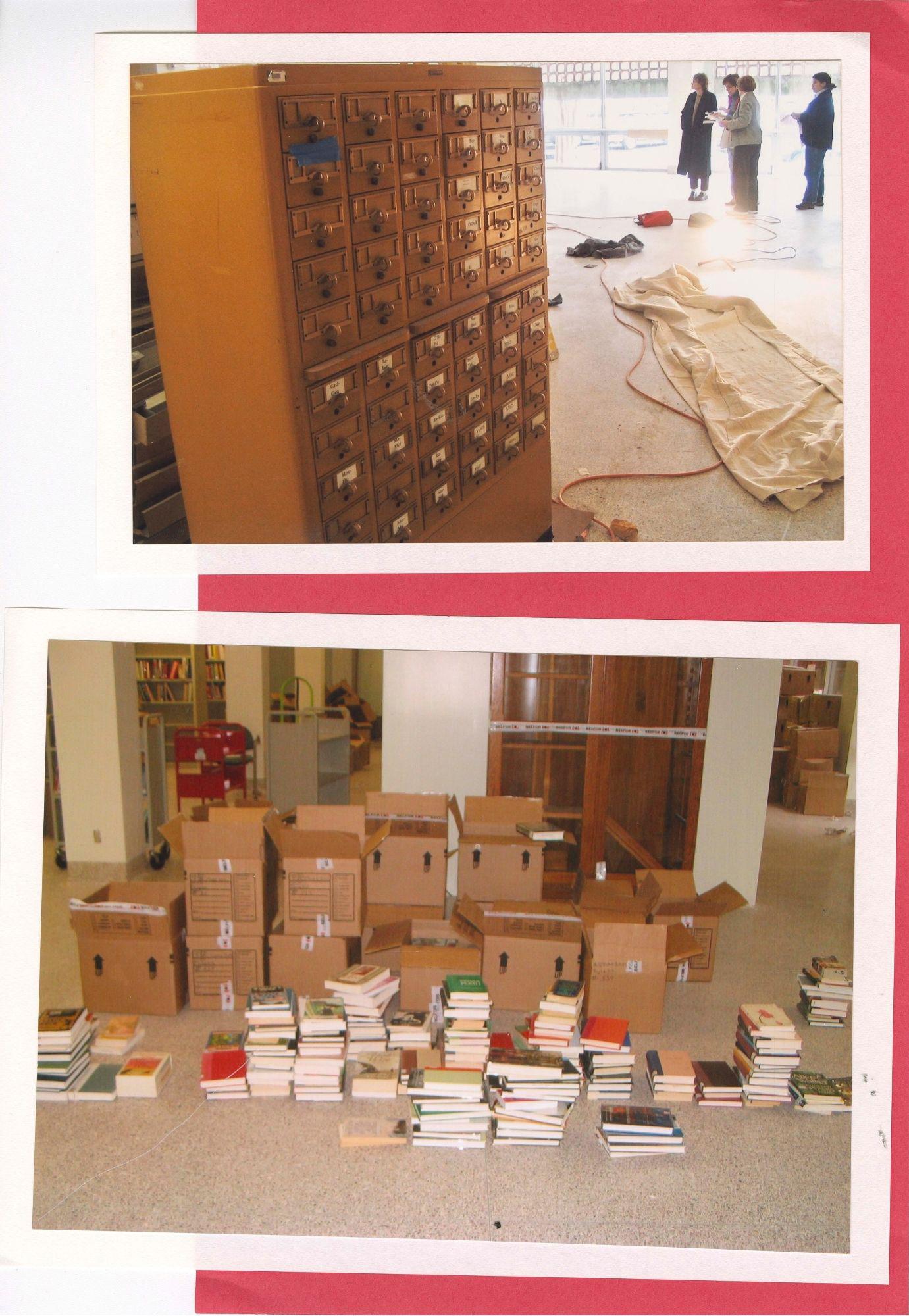
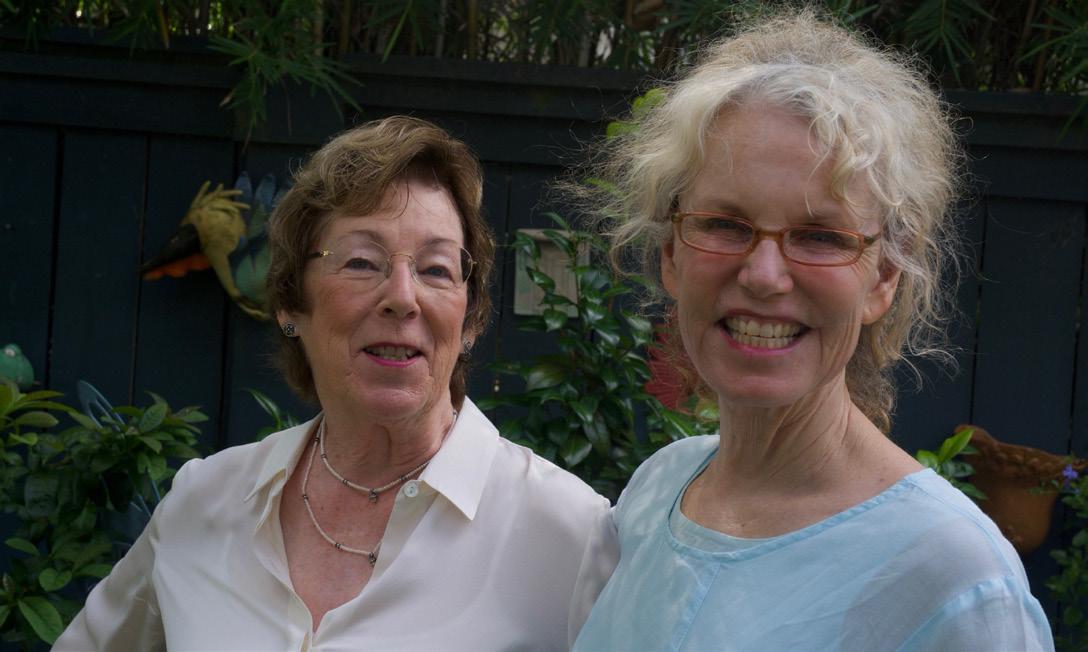
considerations, housing, health and power. City-wide efforts such as Women of the Storm and Levee.org showcased the leadership of women in disaster recovery. Their papers, now in the archives, have allowed others to study a different approach to disaster recovery and leadership.
There followed more building renovations and disaster planning that could serve as models for others. For example, Susan’s grant to the NEH provided for a new HVAC system to better control the temperature of the holdings, while the University invested in a new roof. Then with the closing of Newcomb College in 2006, interest focused on the history of Newcomb College and its alumnae, making these collections even more valued.
In many ways, we’ve thought of the creation of Newcomb Institute as representative of the acorns that both disappeared and emerged from Katrina. My time at Tulane ended in 2010 and Susan’s in 2015. We have watched
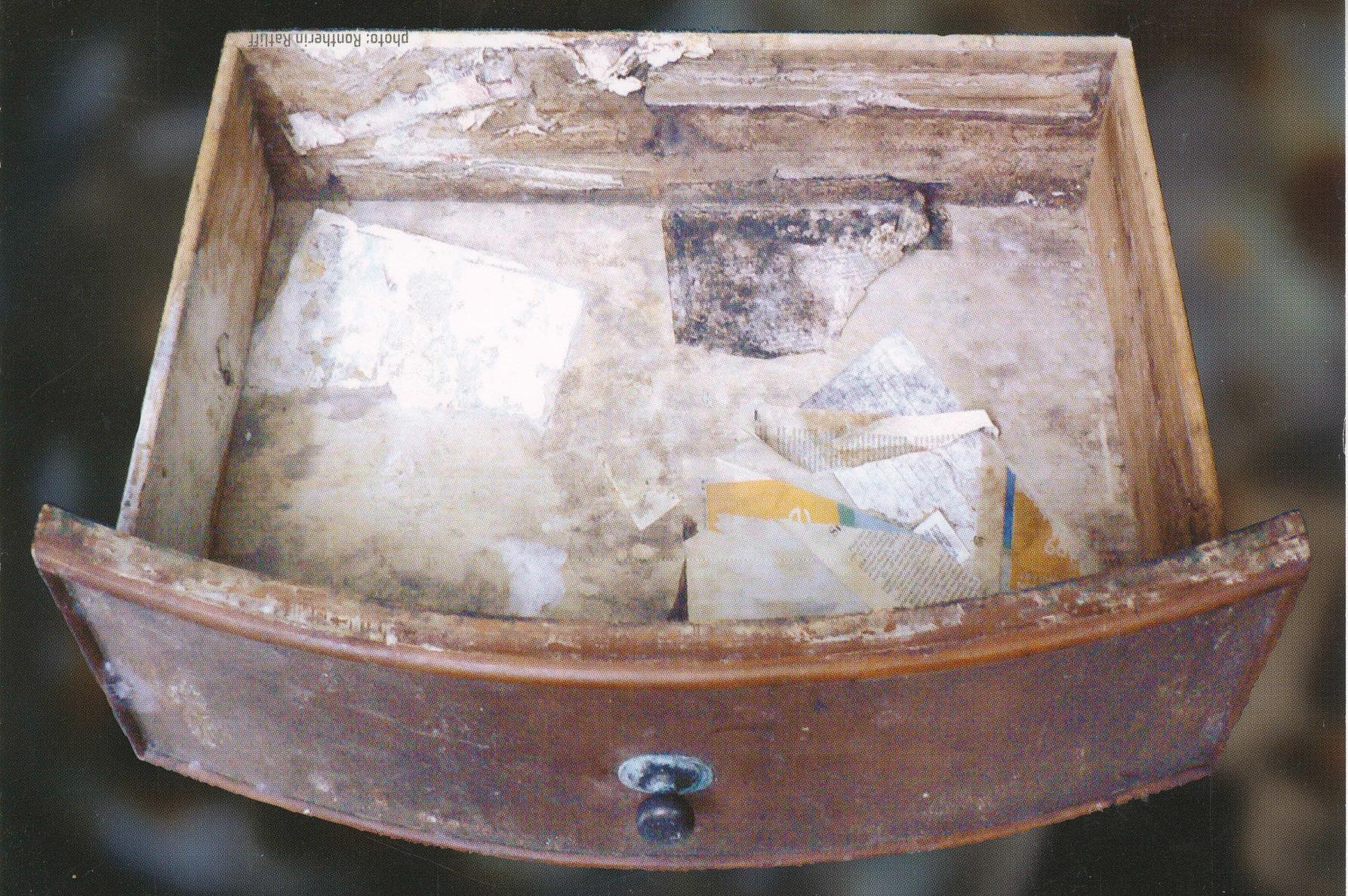
with admiration how Newcomb Institute has expanded definitions of equity from some of those issues made more apparent in the aftermath of Katrina: intimate partner violence, childcare, women’s economic insecurity, leadership and reproductive health. Like the flood water that came suddenly and receded slowly, the concerns and barriers women face today will lessen only from a commitment to justice such as that demonstrated by Newcomb Institute.
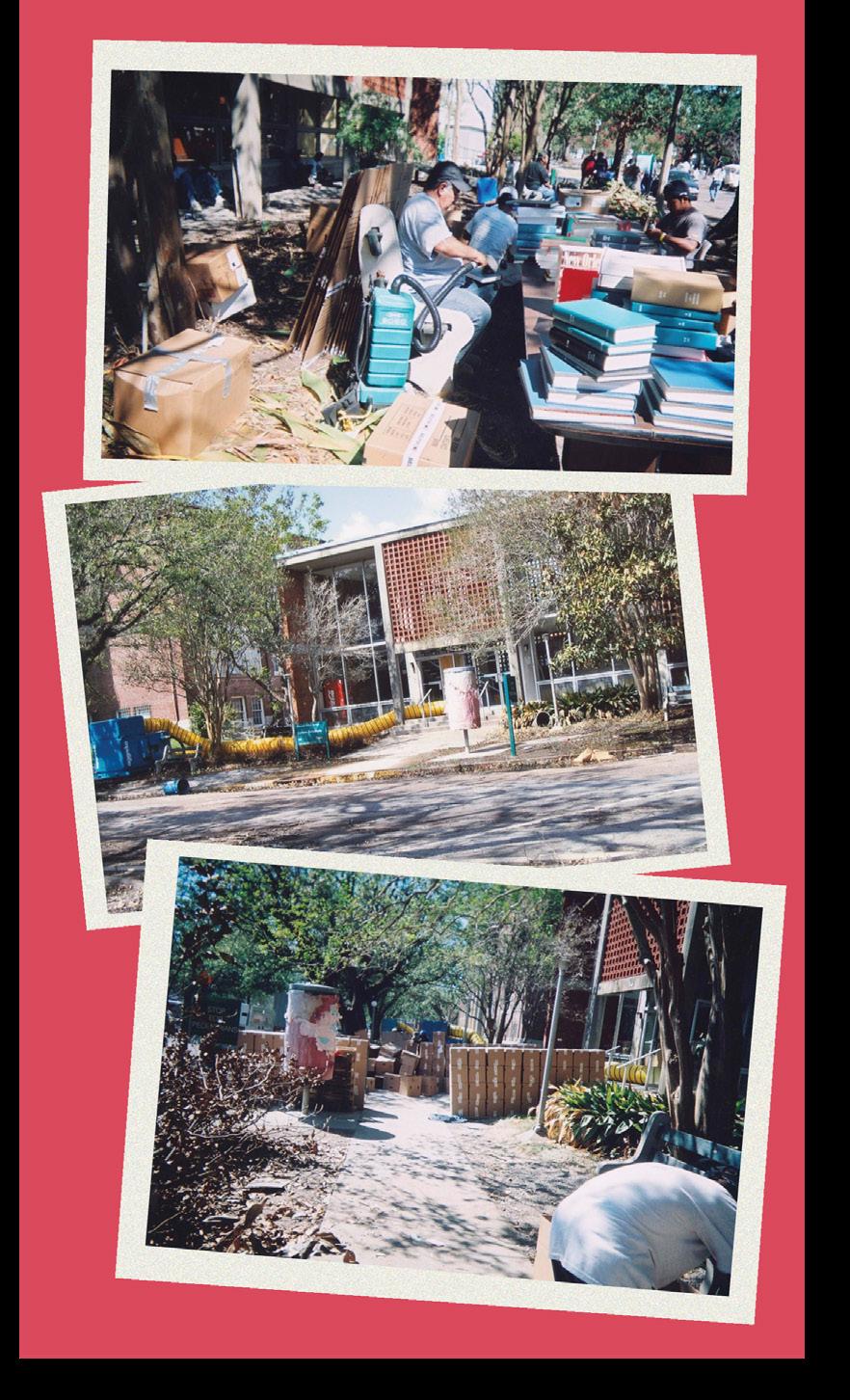
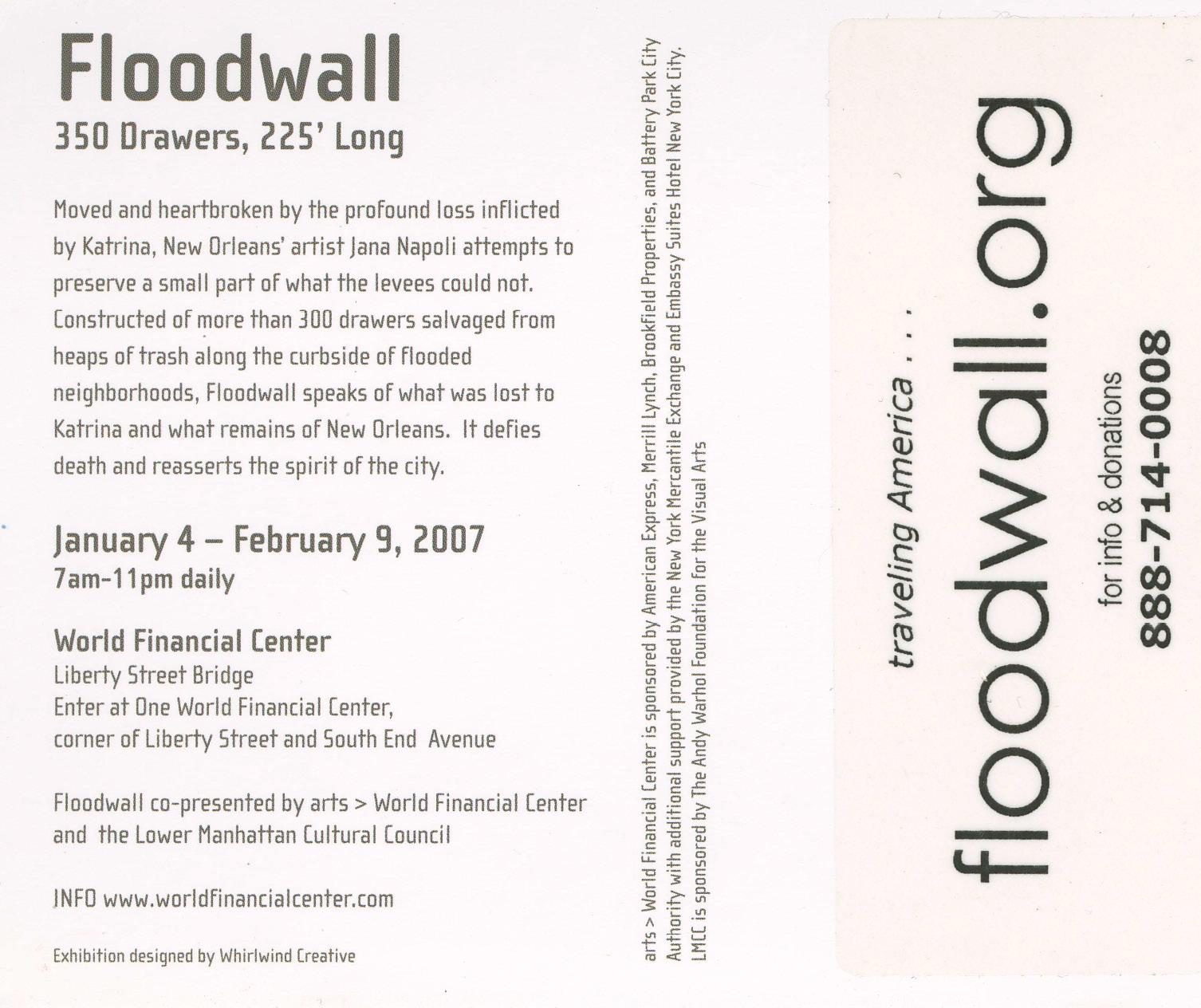

By Bernadette Floresca (SOPA *21)
Bernadette Floresca (SOPA *21), who is the head of archives management and strategies today, outlines the archives’ purpose and provides an overview of its collections.
Newcomb Archives, established in 1989, serves as a repository for diverse materials, including papers, records, photographs, scrapbooks, oral histories and digital files, and also a small, non-circulating special collections library focused on women’s education, sexuality, feminist zines, culinary history and more. All collections are acquired with the goal of documenting the work of past and future gender equity leaders and fostering community engagement. Our focus is always evolving and growing to align with the mission and needs of Newcomb Institute as it travels into the future while maintaining a connection to women’s history in the Gulf South. Many collections found in the Newcomb Archives focus on the historical efforts of local second-wave feminists’ work to protect and advocate for reproductive rights and justice, prevent gender-based violence, and strengthen feminist civic and community engagement through development of leaders and community members as change agents.
The Newcomb Archives Reading Room is located on the third floor of the Malkin Sacks Commons in a beautiful room filled with natural light and space for researchers using archival collections and students seeking a space for concentration and quiet study. The Reading Room
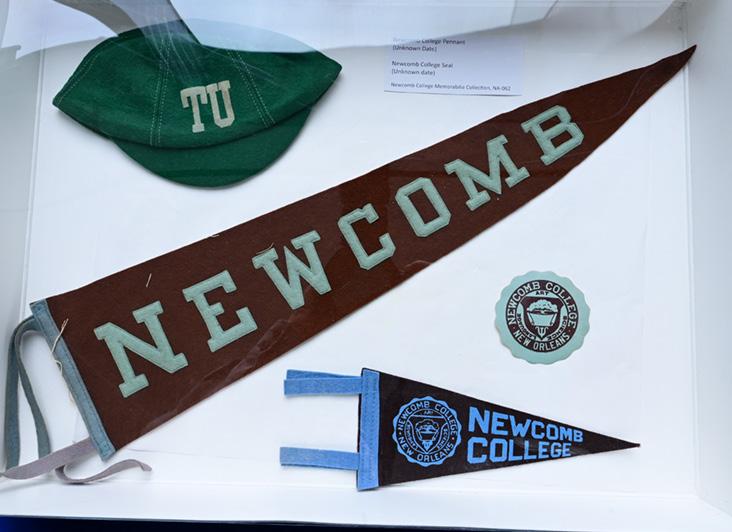
creates access and supports the research and activities of Newcomb Institute. The collection offers primary source materials to students, faculty, staff and administrators, and encourages scholarly and community-based research. Newcomb Archives, in partnership with other special collections and libraries, continues to provide educational support such as research instruction and archival training for students interested in memory-keeping and a more behind-the-scenes approach to research.
What sets Newcomb Archives apart from other archives and special collections is its origin as a feminist-led initiative in the 1980s, aimed at building a community resource to support Newcomb College’s Women’s Studies and Research Center. Its approach to collection development was ahead of its time, utilizing inclusive and ethical practices before they became widespread in the field. Newcomb Archives continues this feminist approach, and in 2024, in partnership with Tulane University Special Collections, produced Tulane University’s first "Inclusive and Reparative Archival Descriptions Guide."
While Newcomb Archives continues to house Newcomb College’s foundational records, it is also dedicated to preserving, expanding access to and broadening the narrative of gender equity in the Gulf South through ongoing community engagement and ethical collection development.
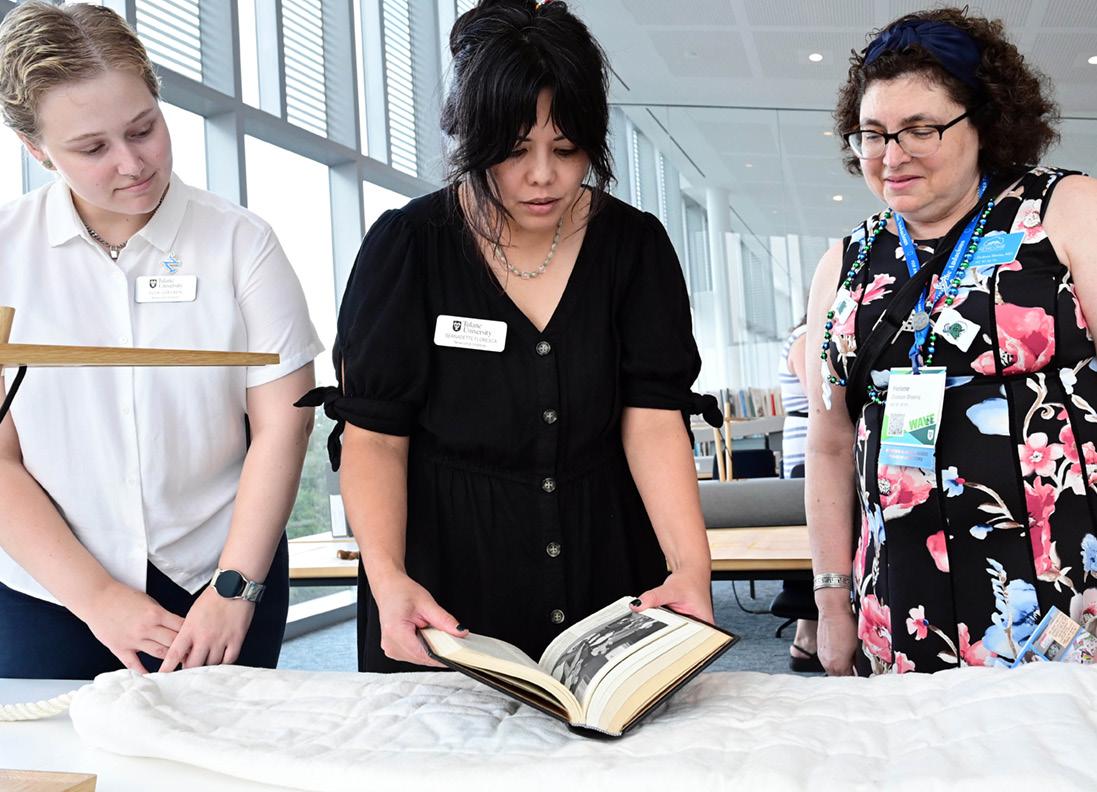
Along with its vast collection of second-wave feminists’ works that focus on social and reproductive justice, the Newcomb Archives also contain several collections that document the history of Hurricane Katrina.
These include:
1. Hurricane Katrina Collection (NA-098)
2. Levees.org records (NA-027)
3. Diana Pinckley papers (NA-135)
4. Women of the Storm records (NA-020)
5. Patricia “Patsy” Freeland papers (NA-401)
6. Parr, Leslie (Sugar Cane) papers (NA-421)
7. Dora Bonquois Ellis Papers (NA-104)
8. Newcomb Women’s Stories from the Storms: Hurricanes Research Project 2006 (NA424)
9. Phyllis Parun papers (NA-202)
10. Citizens for 1 Greater New Orleans (NA-045)
11. Beth Willinger papers (NA-067)
12. Montine McDaniel Freeman Collection (NA-412)
13. Gulf Coast Womyn’s Festival booklet (NA-334)
14. Newcomb College Office of the Dean Records (NA-008)
15. Box 2: Charity Hospital, 1947-2011 (NA-490)
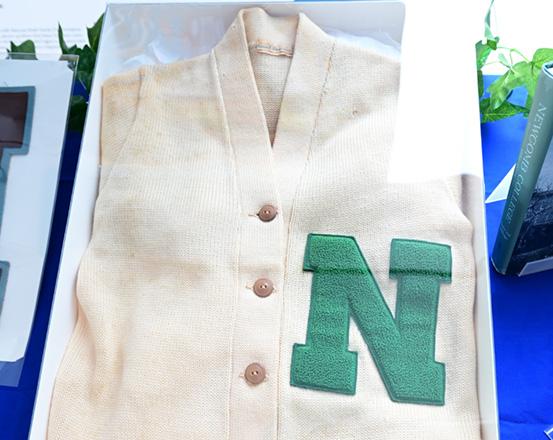
For more information about Newcomb Archives collections, scheduling an appointment or hours of operation please contact newcombarchives@tulane.edu.
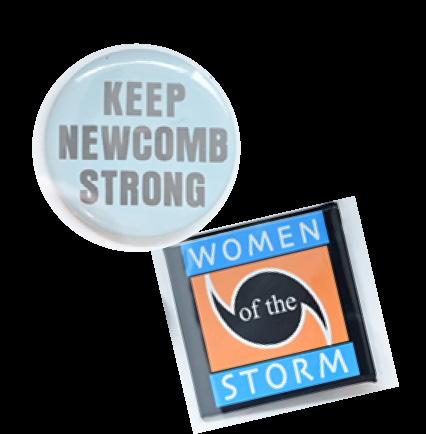
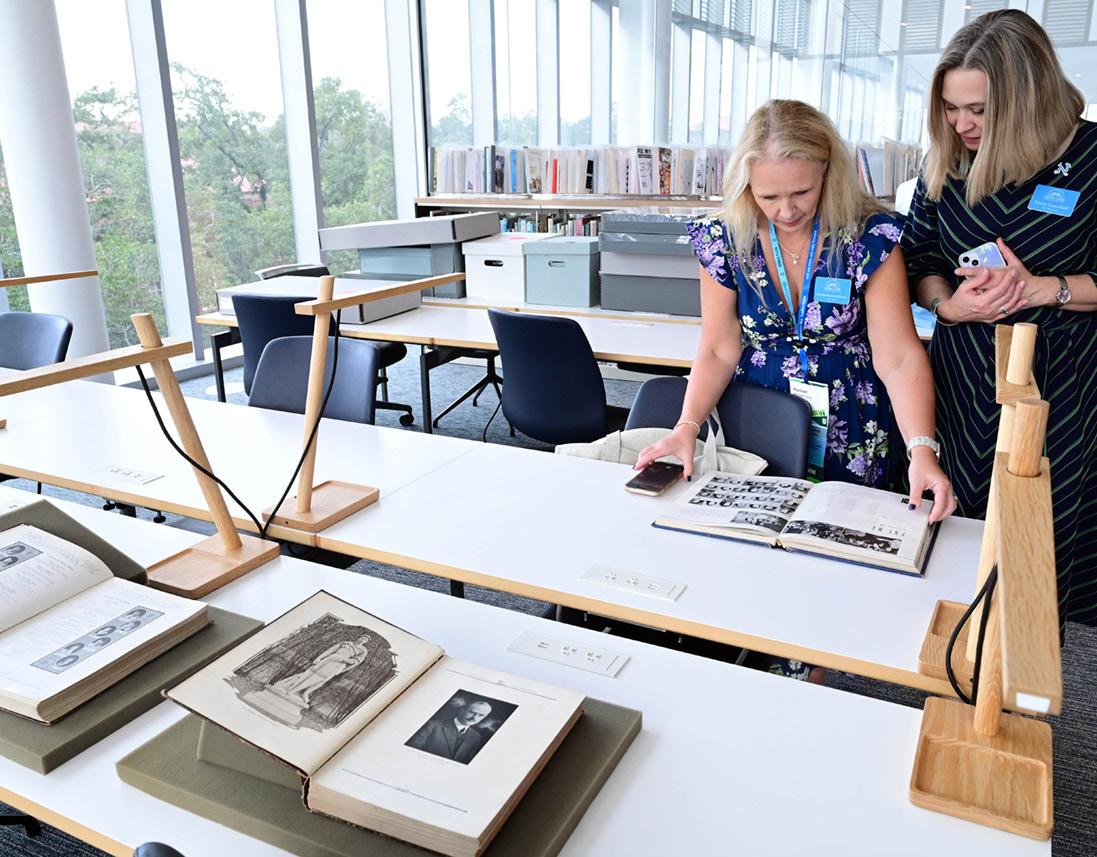
Acouple of months after Katrina, Julie Qiu (SLA ’07, *08) and her roommates were given 24 hours to pack a minivan with belongings before the landlord evicted everyone from the apartment building. Some people would take that as a sign to leave for good, but Qiu never considered it.
“Rebuilding my community felt akin to rebuilding myself,” Qiu said. She recalled feeling isolated in the fall of 2005 while attending a university in her hometown of Memphis, Tennessee. But in New Orleans, “I didn’t need to create context for difficult emotions [because] we were all going through it together.”
After graduating with bachelor’s and master’s degrees in English literature, Qiu taught in China and worked in New York City and Delaware. In 2019 she returned to New Orleans, where she said she feels whole. Experiencing Katrina “opened a level of compassion and empathy I wanted to pursue in all parts of my life,” she explained. “I wanted to surround myself with people who cared.” As Newcomb Institute’s program manager for community engagement, Qiu takes inspiration from the ways local neighborhoods looked after residents and led rebuilding efforts after the storm. Trusting community leaders leads to social transformation, she said. “Community engagement empowers . . . people to address their community needs as they know best.”
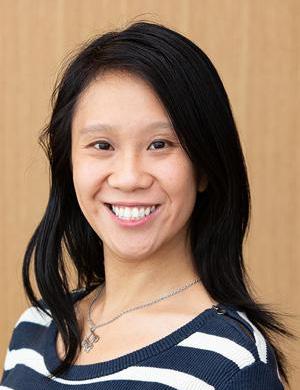
By Charles Buchanan
“Katrina is 100 percent responsible for my career choice,” said Meredith Beers, PhD (PHTM ’11, *16), Tulane University’s associate director for emergency preparedness and response, who initially had planned on becoming a trial attorney. She was an orientation team leader setting up for move-in day when the campus evacuated, and she spent that fall volunteering with Tulane’s administration, which had relocated to Houston near Beers’ family home. She answered phones, made copies and “learned so much that semester about leadership, decision making and how to recover from an unprecedented disaster,” she recalled.
Inspired by that experience, Beers graduated with degrees in English and environmental science and ultimately earned a doctorate focusing on disaster management. In 2018 she joined Tulane’s crisis response team, leading efforts targeting hurricanes and the COVID-19 pandemic. Her current role spans emergency management and crisis communications, and involves building relationships with campus and government partners. “My experiences as a student . . . are foremost in my mind when I develop preparedness plans for the university,” Beers said. “[They] also give me the lens of what my parents experienced, which helps me as I develop materials for parents and when I talk to them before, during and after storms.”
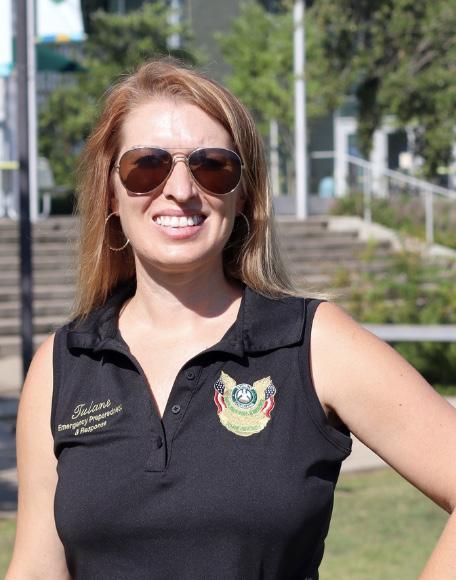
Betsy Lopez (SLA ’10, SW *18) was a high school senior in Jefferson Parish, Louisiana, when Katrina hit, but the experience of weathering the storm with her family — their evacuation was cut short, and for a week they shared a loaf of bread and leftover cookie cake — shaped her years at Tulane. In 2006, accepted into one of the university’s smallest incoming classes, she joined the service-learning program in its first year to rebuild her home region. “I needed to be part of the community, not just take from it,” said Lopez, who was an environmental sciences major.
Following graduation Lopez worked with nonprofits to rebuild local public schools, train advocates to support children and protect vital records. Discovering that all her jobs pointed back to lessening the hardships that accompany disasters, Lopez returned to Tulane for a master’s degree in disaster resilience leadership. Currently she is manager for crisis and grants management with Deloitte & Touche in New Orleans. Her work focuses on hazard mitigation in communities nationwide.
Lopez also shares her expertise and experiences as an adjunct professor in Tulane’s Disaster Resilience Leadership Academy. One key lesson for students: “True disaster resilience requires community engagement, humility and a commitment to listening and learning from those directly affected.” Otherwise, programs may not reach individuals who need support the most, she said.
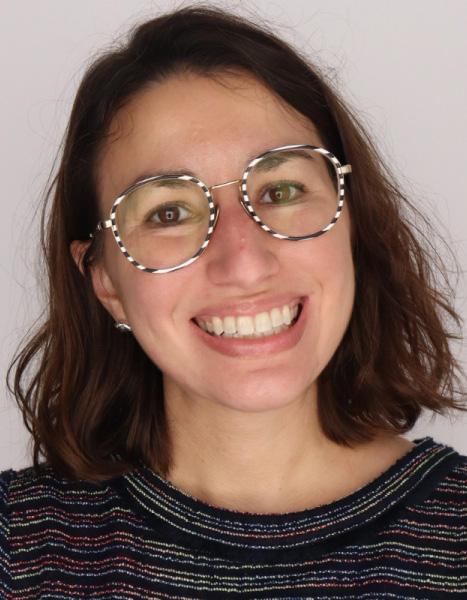
Lauren Lee Pettiette Schewel (NC ’09) had just set up her firstyear dorm room when suddenly she found herself back home in Shreveport, Louisiana, and then in Virginia for a semester. But amid that upheaval, she understood how fortunate she was. “[My friends and I] were trying to figure out our education while other people were without food, missing family members . . . and drowning and dying. I realized that educational opportunity and stability was a privilege” — and one dependent upon basic needs being met, she said.
That lesson guided Schewel, an English-creative writing major, to law school and a career blending education, advocacy and justice. As director of alumni engagement for HeartShare St. Vincent’s Services, a New York nonprofit supporting children and families, she leads a network for people who have aged out of foster care. The first-of-its-kind initiative cultivates “lifelong belonging, value, well-being, stability and purpose” to help alumni face lingering trauma that may limit their opportunities, she explained. Schewel, who lives in Durham, North Carolina, also is board chair for the LIFE Skills Foundation, a nonprofit assisting youth transitioning into adulthood without family or social support, and is an advocate for people with disabilities.
Now a former member of the Newcomb Alumnae Association Board of Directors, Schewel recalled feeling heavy pressure as a student to help restore New Orleans. However, the experience “encouraged me to find my passion for equity, my joie de vivre and kindness in myself and in others,” she said. “There were so many wrongs that happened in Hurricane Katrina,” Schewel said. “[It] made me realize that I need to speak up.”
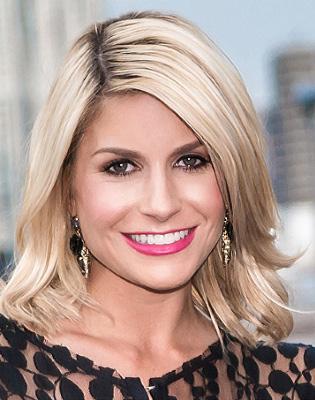
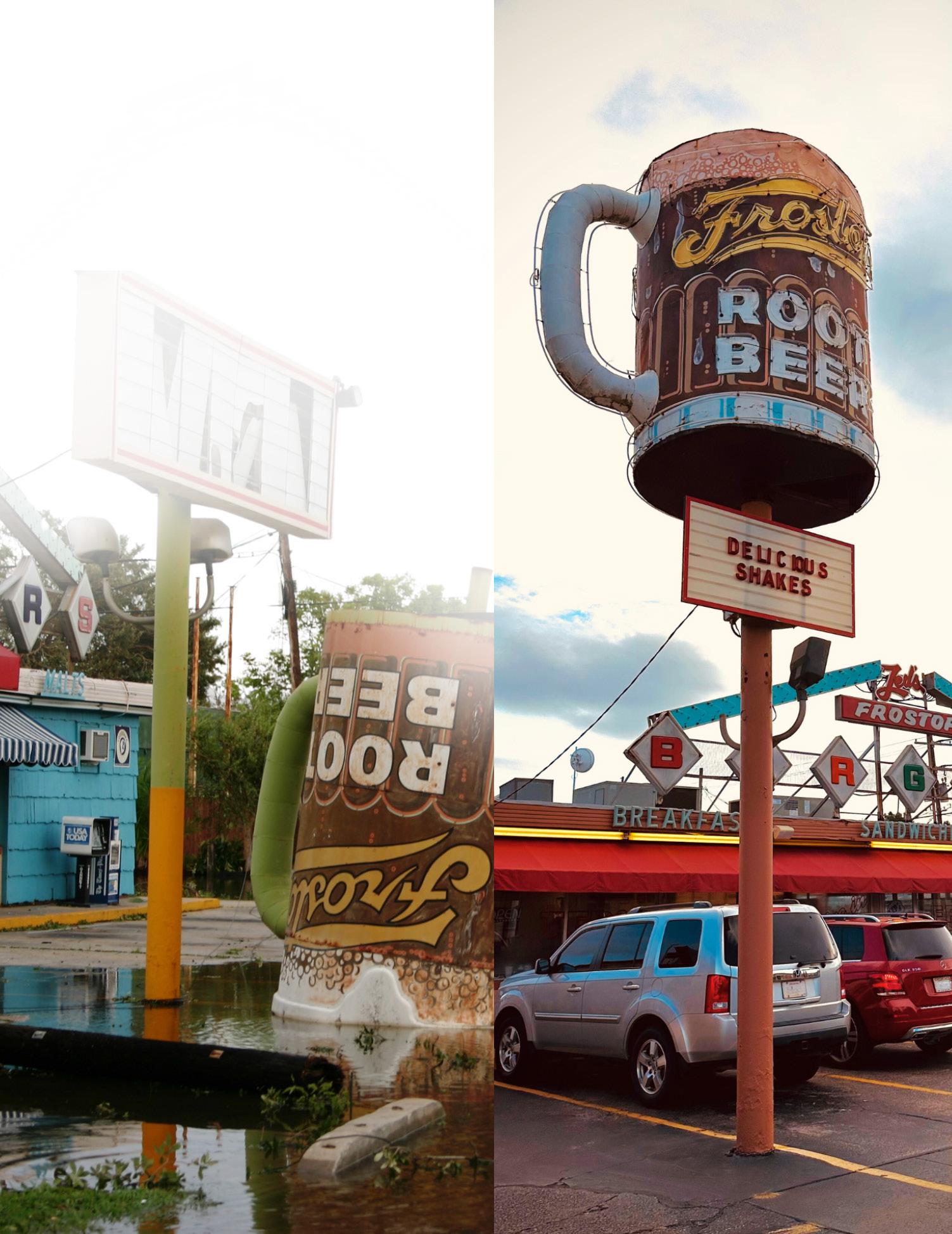
By Emily Kreller (SLA ’26) and Toria Smith
Newcomb Institute received Sexual Trauma Awareness and Response’s (STAR) 2024 Champions of Change award.
STAR is a leading nonprofit that is dedicated to supporting survivors of sexual trauma, improving systems response and creating social change to end sexual violence.
STAR’s annual Champions of Change awards honor individuals and groups who have shown steadfast dedication, empathy and support for survivors of sexual assault and trafficking, making a significant impact on their lives. All of the recipients have gone the extra mile in their efforts to continuously promote a culture of healing and empowerment, fight sexual assault, raise awareness, provide essential resources and advocate for a society free from the stigma and trauma linked to this widespread issue.
“We are honored to be recognized among so many amazing individuals and organizations who are truly agents of change, and this is so much more meaningful to us in that we were nominated by one of our valuable community partners, the Louisiana Foundation Against Sexual Assault,” said Dr. Anita Raj, executive director of the Newcomb Institute. “This award validates that Newcomb Institute’s research is making an impact, but more importantly that we are able to work
collectively with advocates and providers to make a true difference within our communities.
“Our research gives us critical insights — not only to better support sexual assault survivors but to advocate for muchneeded funding for public health programs focused on violence prevention with a particular emphasis on youth. Adolescence and young adulthood are stages where we see an alarming rise in violence, and early intervention can make a significant difference,” said Dr. Raj.
“Sexual violence, including harassment as well as assault, is ubiquitous, and increases women’s risk for social, economic and mental health concerns, yet we continue to see these abuses ignored or excused,” Dr Raj said. “Those affected by sexual trauma need to be supported, protected and respected. With improved public awareness of these issues and an increase in resources to support survivors, we can accelerate progress and create change.”
Newcomb Institute, along with the other award recipients, was honored at the Champions of Change Gala on November 6, 2024, in Metairie, Louisiana.
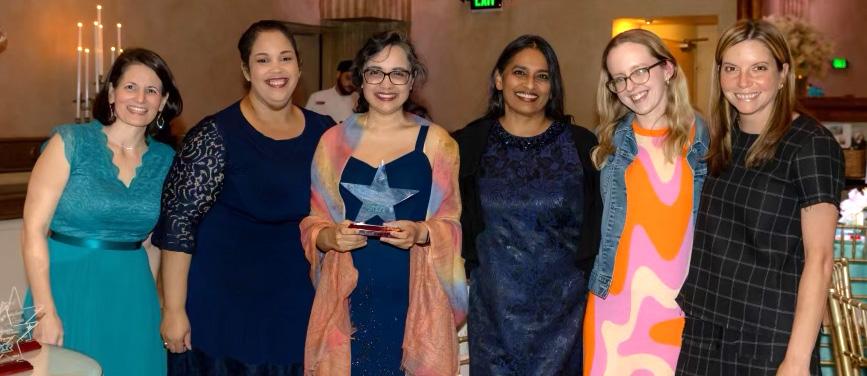
This list of peer-reviewed publications includes some of our most impactful research from the 2024-2025 academic year.
Are Traditional Honour Ideologies Associated with Fertility Goals and Contraceptive Use? Findings from a CrossSectional Study with a National Sample of Women and Men In Uganda
African Journal of Reproductive Health, July 2025
Arnab K. Dey, Kalysha Closson, Jarrod E. Bock, Ryan P. Brown, Pamela Kakande Nabukhonzo, Wilson Nyegenye, Anita Raj
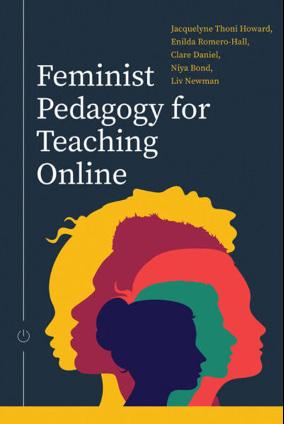
Feminist Pedagogy for Teaching Online
Athabasca University Press, June 2025
Jacquelyne Thoni Howard, Enilda RomeroHall, Clare Daniel, Niya Bond, Liv Newman
Moving Past a Legacy of Controlling Women: Key Frameworks to Center Women and Girls’ Choice and Agency in Sexual and Reproductive Health Measurement
Studies in Family Planning, July 2025
Christen Dehlendorf, Karen Hardee, Evelyn Opondo, Anita Raj
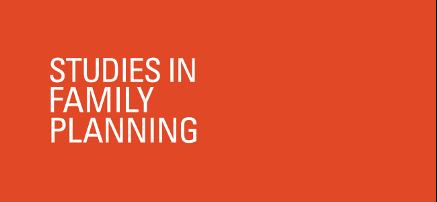
“I’m No Longer Afraid”: A Qualitative Investigation into the Impact of an Academic Course on Undergraduates’ Perspectives About Sexual Violence
American Journal of Sexuality Education, June 2025
Sydney Mei Sheffield, Jessica L. Liddell, Katherine M. Johnson, Alyssa M. Lederer
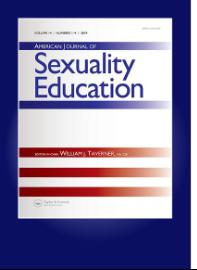

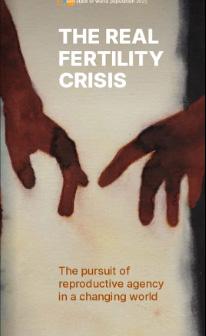
The Real Fertility Crisis: The Pursuit of Reproductive Agency in a Changing World
Published by UNFPA, June 2025
Amanda Chatata, Nyovani Madise, Monika Mynarska, Anita Raj, Agnese Vitali, Rebecca Zerzan
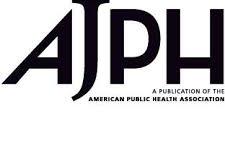
In Unity There Is Strength: Songs of Kinship: The Northwest Indian Women's Circle Statement of Purpose, 1981. Journal of Women and Social Movement
June 2025
Amanda Johnson
Medical Providers Require Support and Training for Legislative Testimony about Abortion and High-Risk Pregnancy Care
American Journal of Public Health, May 2025
Clare Daniel, Grace Riley, Anita Raj, Cecilia Gambala
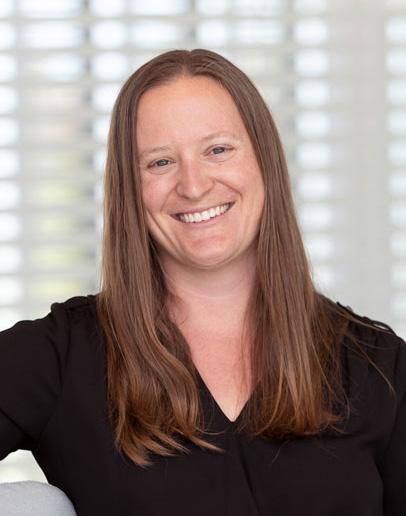
To Curb the Proliferation of Crisis
Pregnancy Centers, End State Grant
Funding
American Journal of Public Health, May 2025
Clare Daniel
Contested Narratives: A Qualitative Analysis of Abortion Testimonies in Louisiana Legislature Frontiers in Global Women’s Health,
April 2025
Martha Silva, Jeni Stolow, Micki Burdick, Amy Mercieca
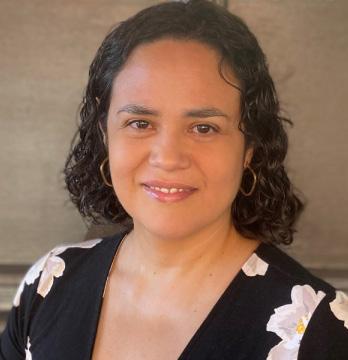
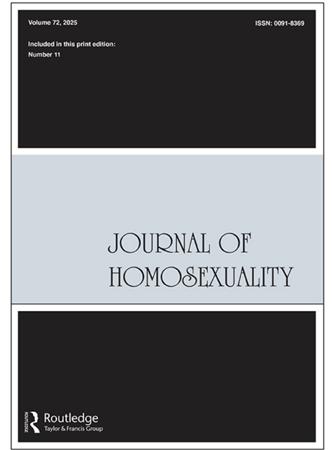
Recommendations for Measuring
Intimate Partner Violence and Relationship Equity Among Queer and Trans Young Women and Non-Binary
Youth in British Columbia Canada
Journal of Homosexuality, May 2025
Kalysha Closson, Tadiwa Nemutambwe, Zoë
Osborne, Gem Y. Lee, Colby Hangle, Stevie
Thompson, Anita Raj, Angela Kaida
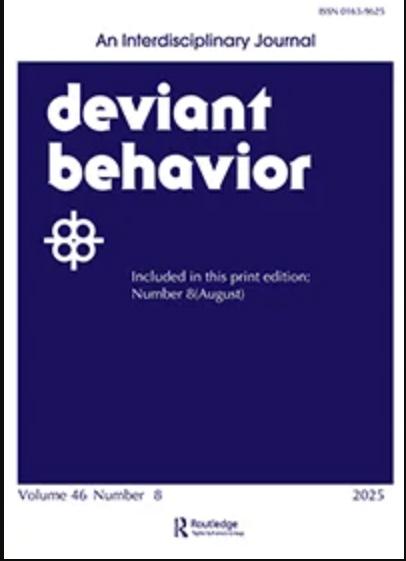
College Students Explain Unsafe Sex: Methodological and Theoretical Contributions to Kaptein and van Helvoort’s Model of Neutralization Techniques
Deviant Behavior, February 2025
Lisa Wade
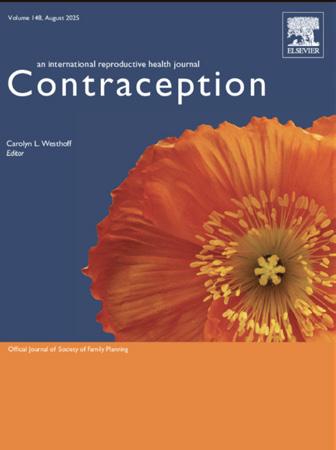
Psychometric Evaluation of the Desire to Avoid Pregnancy Scale in India
Contraception, May 2025
Sarah Averbach, Nicole E. Johns, Shweta
Tomar, Marielle E. Meurice, Namratha
Rao, Mohan Ghule, Anita Raj
Four-Year Follow-Up of CHARM2, an Effective Family Planning Intervention, on Number and Sex of Births: Findings from an RCT in Rural India
Dialogues in Health, April 2025
Anita Raj, Nicole Johns, Florin Vaida, Ghule, Mohan, Namratha Rao, Jay G. Silverman
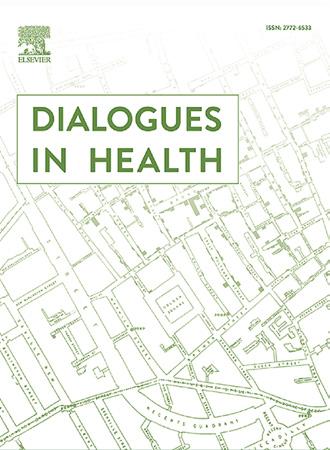
Gender Equity within Fertility Change: Is India an Exception? International Journal of Population Issues, February 2025
Kuriath Sebastian James, Ava Attia

Contraceptive Decision-making and Its Association with Contraceptive Use among Married Adolescent Girls in Niger
Reproductive Health, 2/21/2025
Jay G. Silverman, Shweta Tomar, Mohamad I. Brooks, Sani Aliou, Nicole E. Johns, Sneha Challa, Holly Baker Shakya, Sabrina C. Boyce, Anita Raj
A Feminist Scholars Collective Supporting the Growth and Dissemination of a Digital Guide: A Collaborative Autoethnography
The Journal of Electronic Publishing, January 2025
Enilda Romero-Hall, Clare Daniel, Jacquelyne Thoni Howard, Niya Bond, Liv Newman
Validation of a Family Planning SelfEfficacy Measure with Married Women in Bihar, India: Findings from the Bihar Integrated Family Planning Survey
Contraception: X, November 2024
Nandita Bhan, Edwin Elizabeth Thomas, Lotus McDougal, Priya Nanda, Tanmay Mahapatra, Aritra Das, Sweta Kumari, Kalysha Closson, Abhishek Singh, Anita Raj
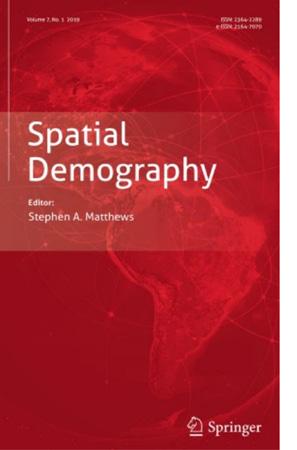
Patriarchy, Fertility and Excess Female
Child Mortality in India
Spatial Demography, January 2025
Abhishek Singh, Kaushalendra Kumar, Lotus McDougal, Praveen Kumar Chokhandre, Ajeet Kumar Singh, Ashish Kumar Upadhyay, Kuriath Sebastian James & Anita Raj
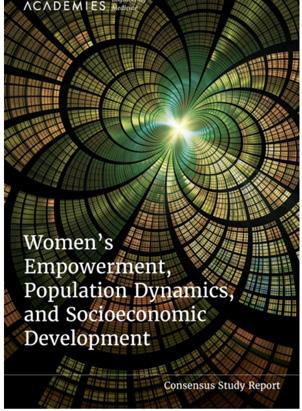
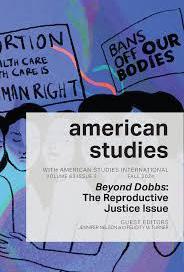
Hedging: University Responses to the Overturning of Roe in Abortion-Ban States
American Studies with American Studies
International, December 2024
Clare Daniel, Kimala Price
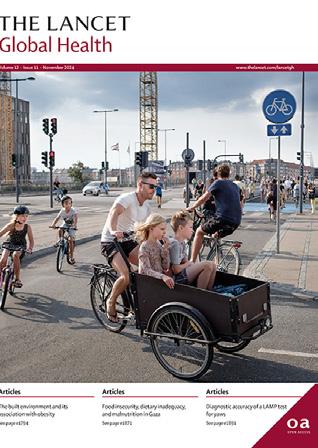
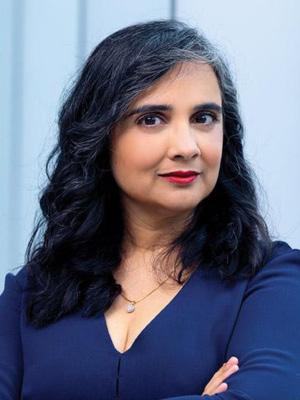
Women’s Empowerment, Population Dynamics, and Socioeconomic Development
National Academies of Science, Engineering, and Medicine, November 2024
Anita Raj, Susan C. Scrimshaw, et al.
Rapid Surveys on Violence against Women in Crisis Contexts: DecisionMaking Guidance Based on the UN Women Rapid Gender Assessment
Surveys on Violence against Women During COVID-19
The Lancet Global Health, November 2024
Raphaëlle Rafin, Nabamallika Dehingia, Juncal Plazaola-Castaño; Anita Raj
A grand total of $345,818 in direct funding was awarded to faculty to support their research, work with undergraduate and graduate students and special initiatives in the 2024-25 academic year.
❧ Fall 2024: 25 grants awarded, totaling $103,745
❧ Spring 2025: 20 grants totaling $92,073 awarded, including $25,625 in grants from the Skau Fund for Art and Music
❧ Spring 2025: 5 grants totaling $150,000 awarded to support graduate students who had lost federal funding support
By Lillian Foster
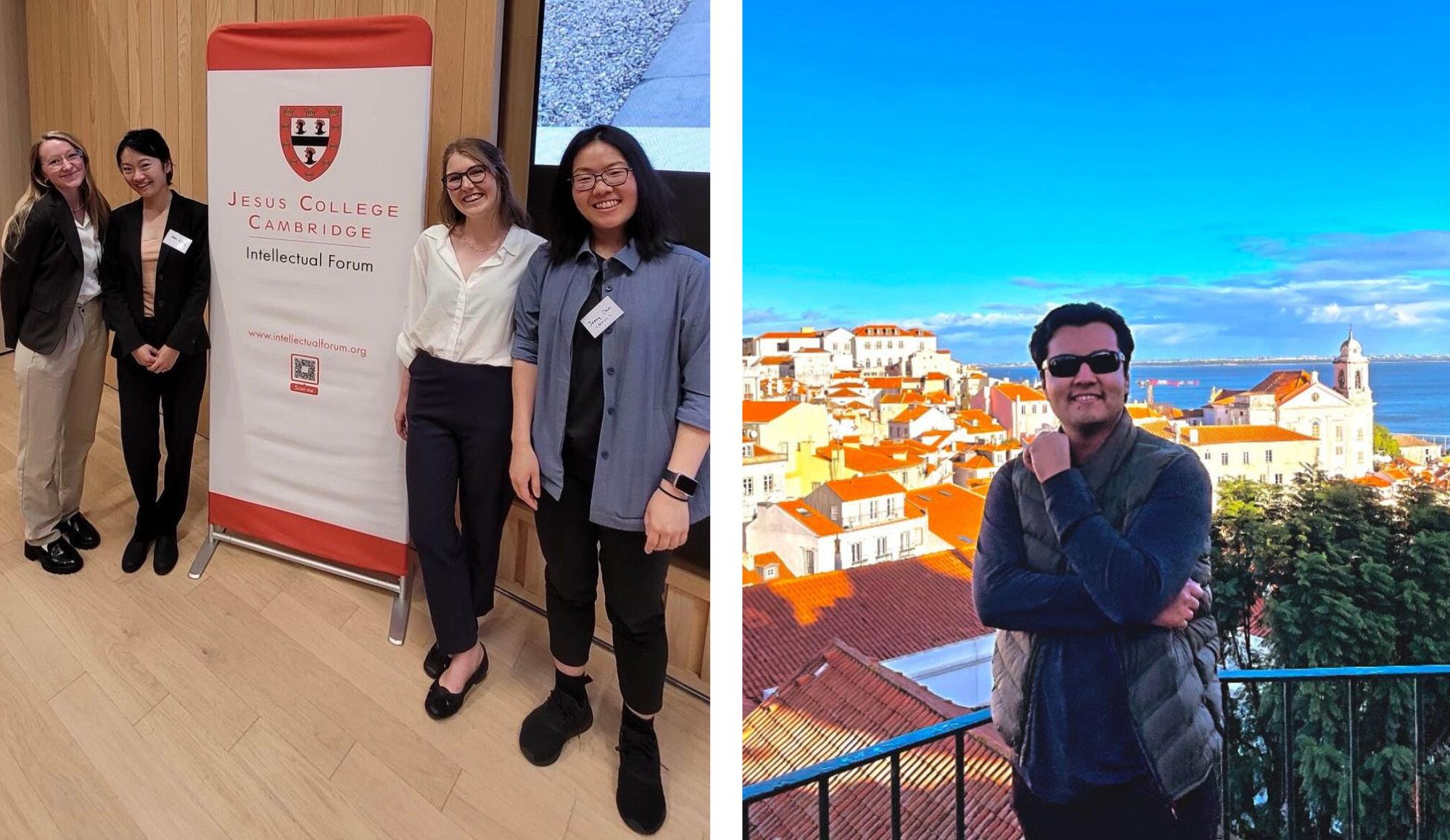
Every semester, Tulane University students have the opportunity to apply for Newcomb Institute student research grants. To support its mission of pioneering groundbreaking academic research, the Newcomb Institute funds gender-equity-based undergraduate student research, conference travel and community engagement.
Faye Tobin (SLA ’5, B ’25) , a senior at Tulane majoring in digital media production and business management, utilized Newcomb Institute funding to support her capstone film. Tobin used her experiences as a woman in comedy to curate her capstone film, which took place at an open mic night.
“The world of my film is comedy [...] but the themes are
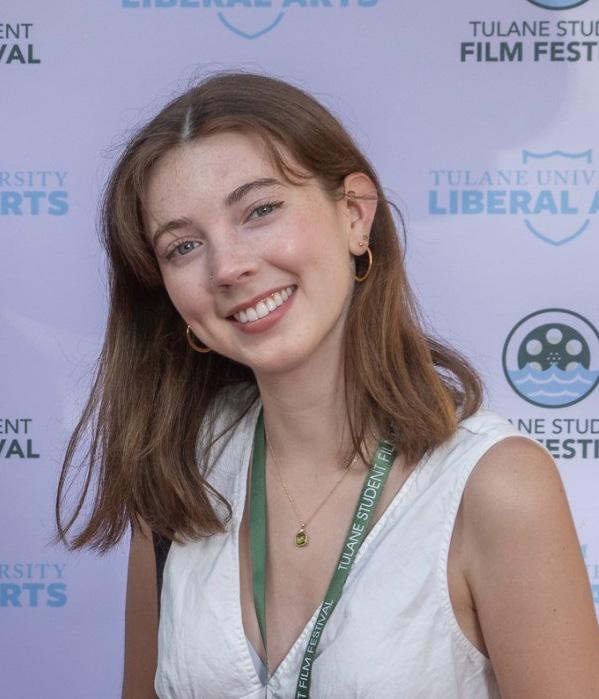
feminist and encourage women to do something in a maledominated field even though it can be scary. If you do it, it’s not even guaranteed that you’ll get an applause or any sort of validation, but when I’ve done things that put me out of my comfort zone, it is an empowering experience,” said Tobin. Tobin used the grant to compensate the cast and crew and to cover filming location costs. “I was very grateful for everyone who helped, and I wanted to pay them for their time because they were creating my vision,” said Tobin.
Tobin’s film premiered at Prytania Theatre on May 14, 2025.
“I hoped, first and foremost, that [the audience] would laugh because it’s a comedy, but second of all, I hope they take away that uncomfortable experiences are normal and natural,
and there’s so much value that you can take from putting yourself out there,” said Tobin.
Nicole Smith-Vaniz (PHTM ’25), a senior at Tulane majoring in public health, found value in placing equity at the forefront of the narrative surrounding social Artificial Intelligence (AI) policy. Using Newcomb Institute funding, Smith-Vaniz attended the August 2024 Social AI: Policy Futures workshop at the University of Cambridge.
“It made clear [to me] that the development of AI is a very interdisciplinary field that everyone can contribute to in their own way. It was a worry of mine that because I didn’t have a computer science background, I wasn’t going to be able to make an impact. To know that I was still able to contribute in my own way was really relieving,” said Smith-Vaniz.
Using her knowledge of the public health industry, SmithVaniz highlighted disparities that occur in the implementation of medical AI systems.
“AI is built by taking in data and training itself to answer questions, depending on the model. If the information it’s taking in is riddled with prejudice, it’s going to spit out something with prejudice,” said Smith-Vaniz. “A big problem that the Centers for Disease Control and Prevention is working on is that, historically, straight white males have taken the focus of health studies. A lot of our health data is only fit to be applied to that demographic and shouldn’t be extended to everyone because everybody is different.”
In August 2023, Cristian Toro Meza (SLA ’25) used Newcomb Institute grant funding to conduct four weeks of research in Portugal. The Latin American studies senior engaged with secondary sources not previously available to him to deep dive into Queen Marie Ana of Austria’s transformation of Portuguese culture.
Using his background in music and his knowledge of Latin American studies, Toro Meza investigated Queen Marie Ana’s distinctive impact on music and Portugal’s global connectivity.
“[Queen Marie Ana] modernized the country and introduced opera. There are some operatic works produced in Portugal and important composers who have not been given the opportunity to have a platform,” Toro Meza said.
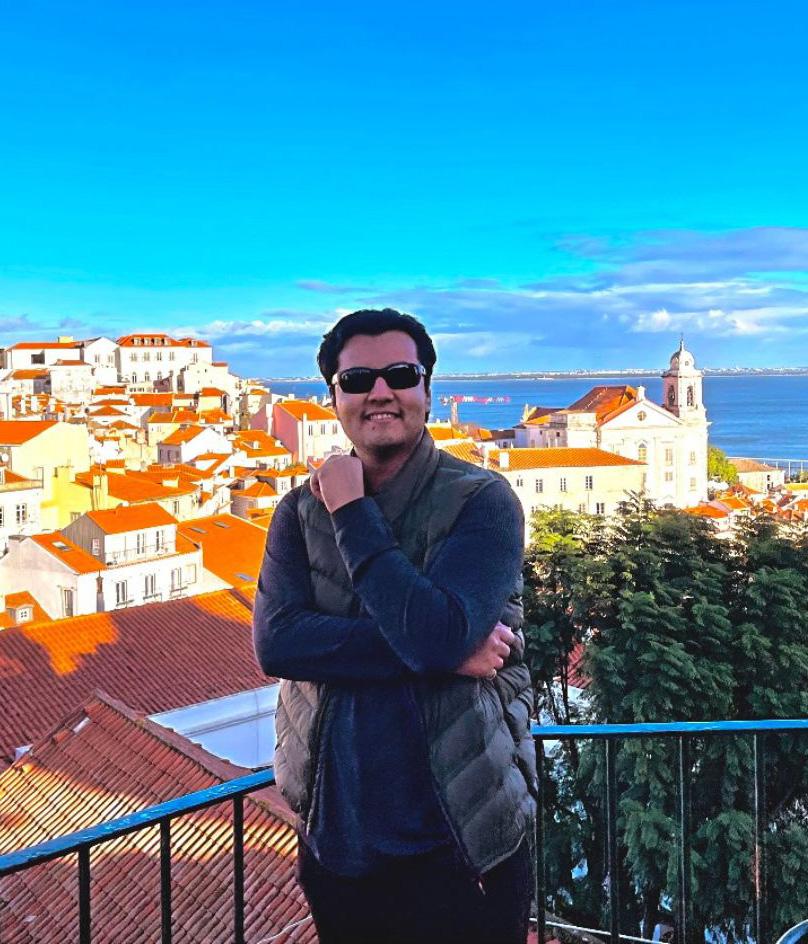
After being awarded a second grant from the Newcomb Institute in Fall 2024, Toro Meza utilized Rio de Janeiro’s library to study how European-dominated psychiatry in early twentieth-century Brazil generated damaging stereotypes and harmful misinformation about women’s health.
“This idea of women being hysterical has roots in this historical discourse, attributed nowadays to men not understanding the symptoms of women because they are not experiencing them,” said Toro Meza.
Toro Meza hopes to earn a master’s degree and a PhD in Latin American studies while expanding on his research, including his undergraduate honors thesis about the U.S. military intervention of Cuba in 1898.
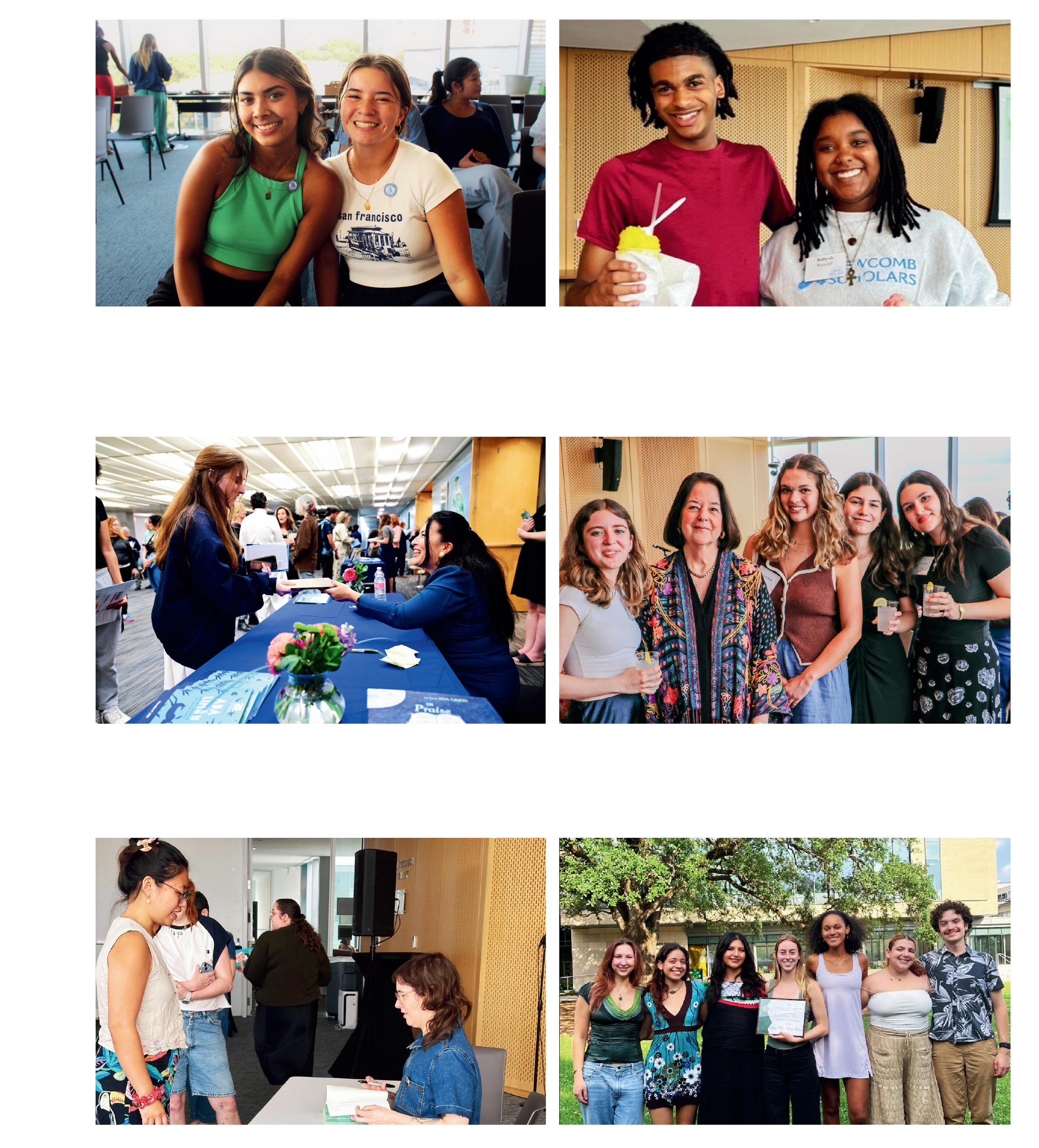
In August 2024, the Newcomb Peer Mentoring pairs participated in the
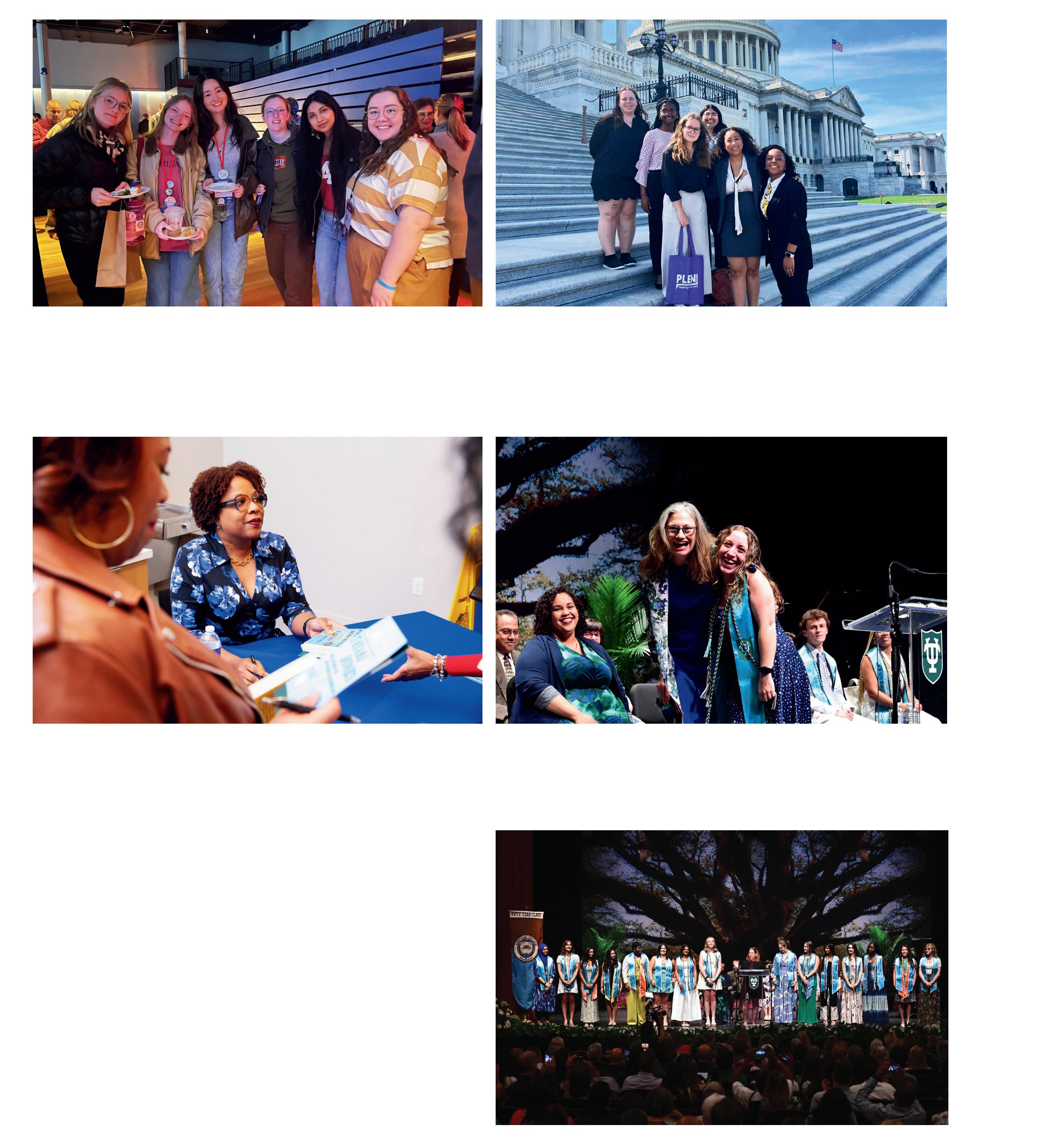
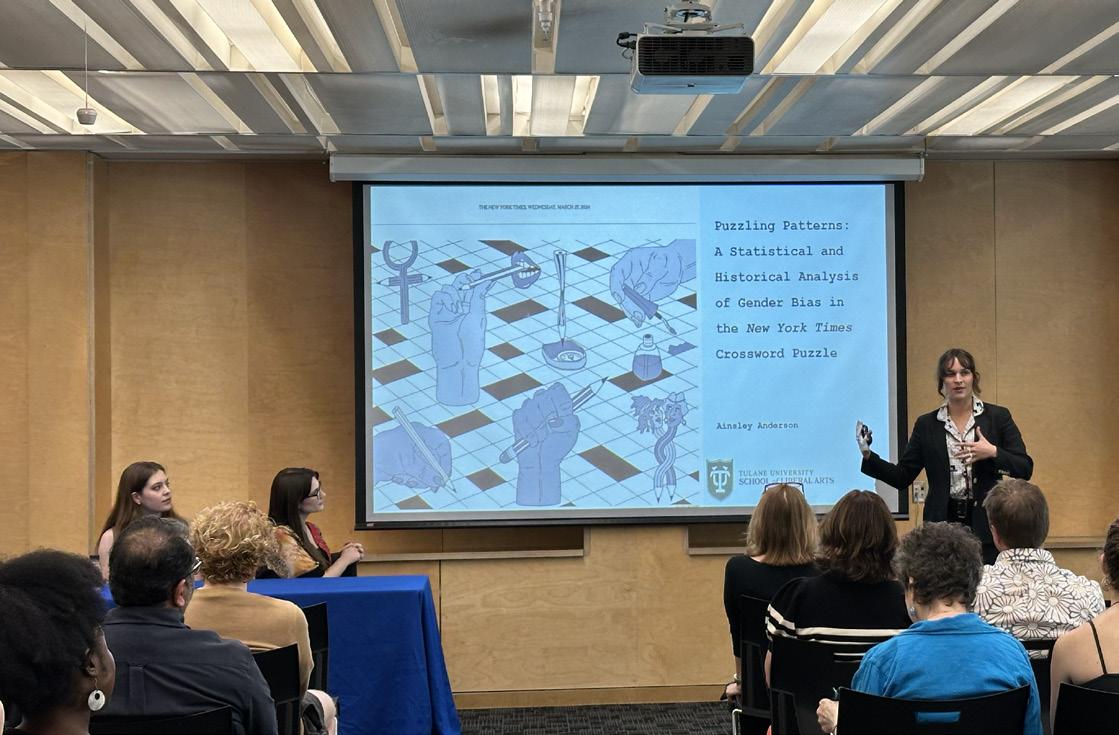
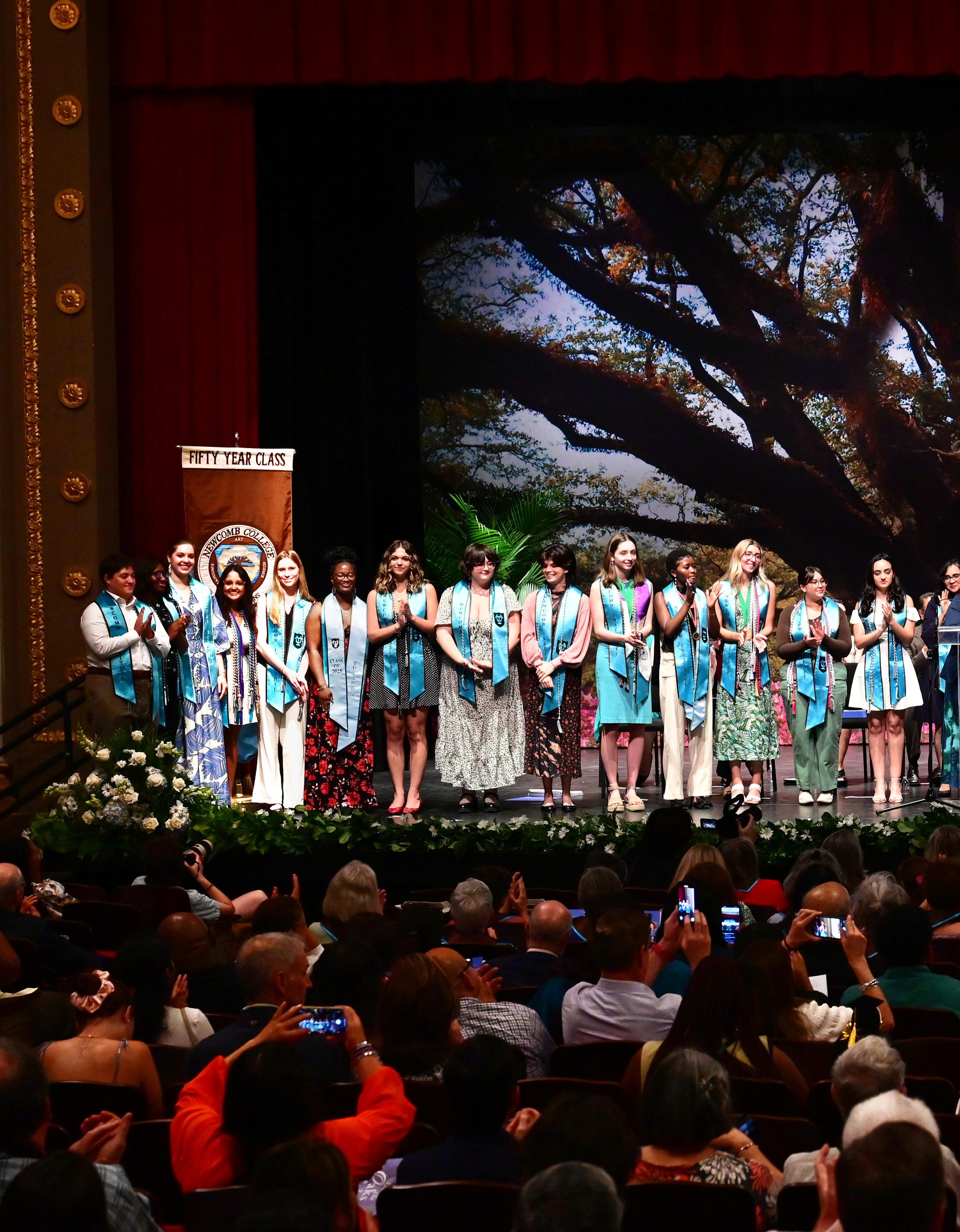
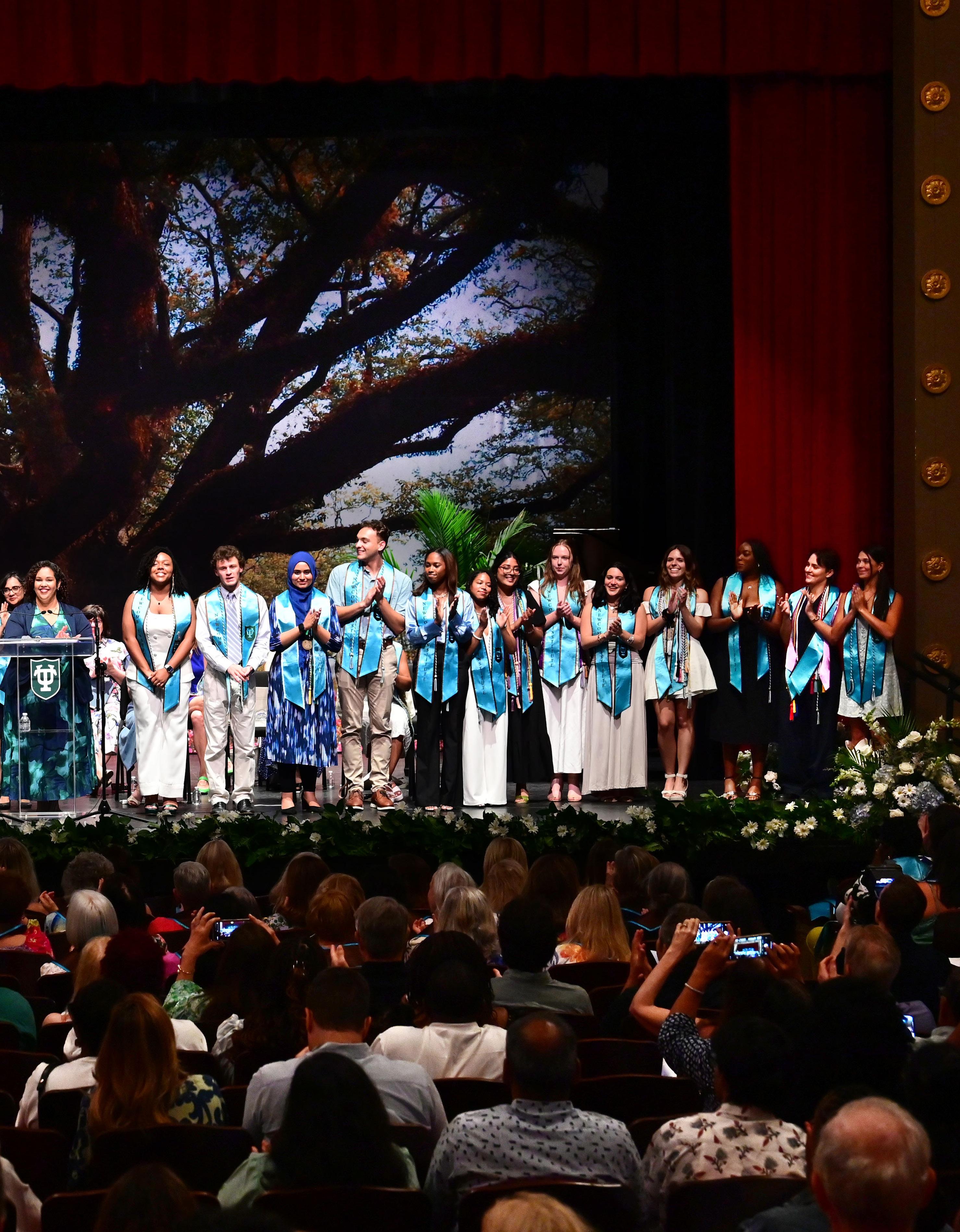
By Lillian Foster (LA ’27)
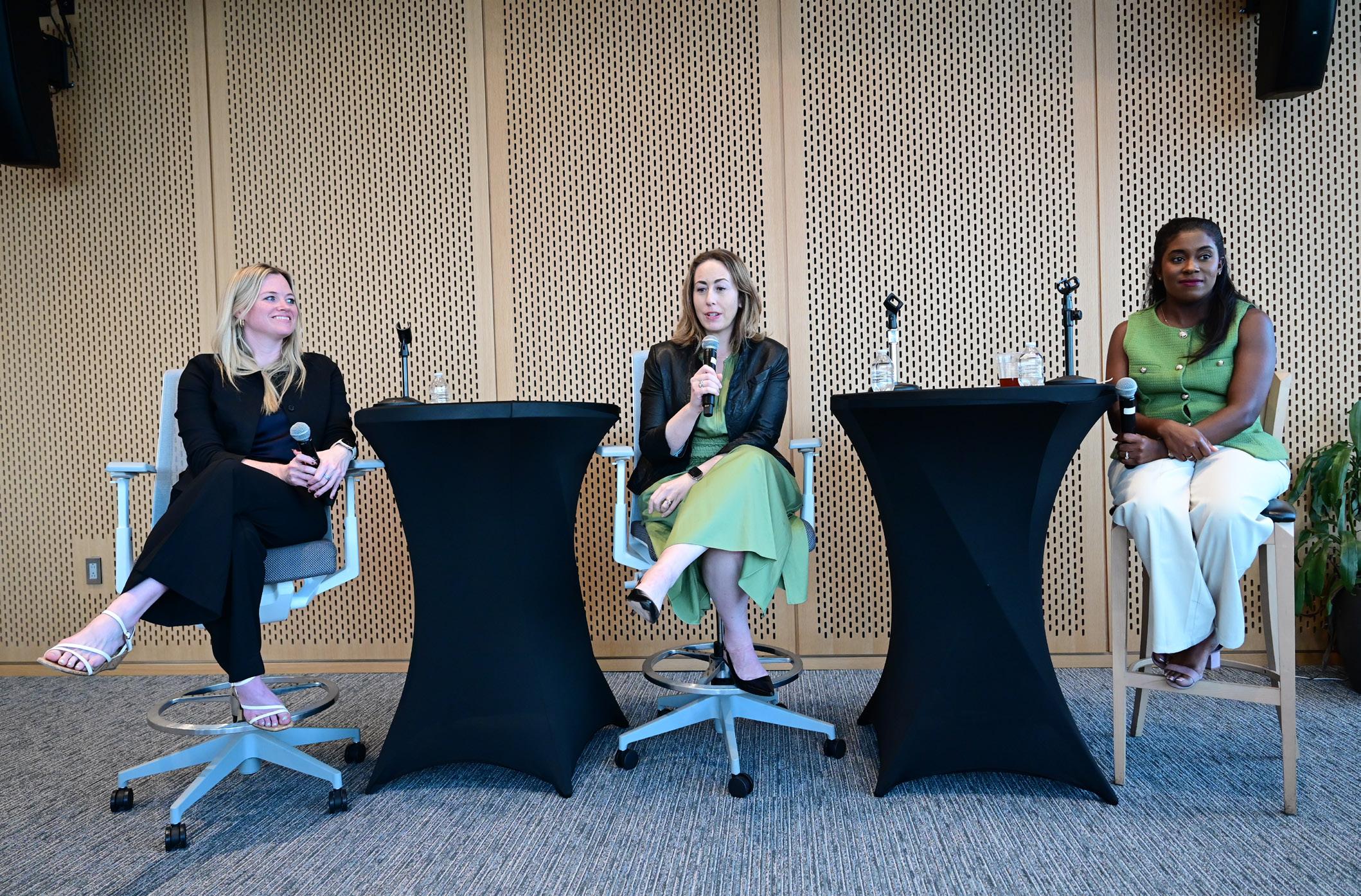
The New York Times journalists Elizabeth Dias and Lisa Lerer discussed their national bestselling book, The Fall of Roe: The Rise of A New America, at Newcomb Institute on April 10 as a part of its 13th annual Conceiving Equity event featuring the Roe v. Wade lecture.
The authors addressed compelling questions about their book, which delved into the political and religious forces behind the anti-abortion movement and exposed eyeopening unknowns from within the White House and the epicenters of reproductive activism.
“Our book braids together two main storylines. We do the investigation into the anti-abortion movement, which is a largely conservative Christian movement that had been working for 50 years and escalating over this last decade to overturn Roe [...] and then also what was going on with abortion rights activists and Democrats during this time,” said Dias, the national religion reporter for The New York Times. “We saw this story that was about the power of belief and the power of denial [so we began] thinking about the psychology of how our politics works and the effect that it has on people.”
Lerer, a national political reporter for The Times, explained that the abortion rights movement has historically based its political campaigns on two- and four-year election cycles, while anti-abortion activists tend to formulate strategy on a generational timescale.
“The abortion rights movement [...] historically has had the philosophy that, if they elect more people who support abortion rights, which now are largely Democrats, they will get into office [...] and abortion rights will be safe. The antiabortion movement comes from a really different place. This is a movement that’s rooted in Christian theology. [...] They compare their movement to a civil rights struggle for the lives of what they see as unborn people,” Lerer said.
Lerer also commented that denial in both the Democratic and Republican Party played a major role in the overturning of Roe v. Wade. “Voters simply did not believe that Roe, which was this thing that had been enshrined in American life for two generations, could just disappear. For many voters, it felt like a battle of the past,” Lerer said.
Dias and Lerer traveled to about 15 states and interviewed around 350 people from different backgrounds to get a deeper look into the politics and narratives surrounding the right to an abortion. Between being at a South Dakota Planned Parenthood clinic while the final abortion at the center was performed and spending time at a Catholic antiabortion facility at the very moment that Roe v. Wade was overturned, the authors got an intimate look at the views of real women experiencing pregnancy-related difficulties.
“We never want to lose sight of what’s actually happening. One of the things that we noticed in those stories was just how similar the struggles were of so many of these women, no matter where they ended up going to seek help and the kinds of decisions that they made,” Dias said.
According to Lerer, abortion rights activists are fighting two fronts as they attempt to keep states from passing more restrictive abortion laws while, in tandem, forming a longterm strategy to restore the federal right to an abortion.
“How long would it take to build back some kind of federal right [to an abortion]? Nobody knows. It’s an unanswerable question, but nobody’s saying one year —
we’re talking 10 years, 20 years, and maybe even 50 years. At the same time, they have to fight these state and local battles. [...] They’re working to prevent more states from passing more restrictions and more bans,” Lerer said.
The Fall of Roe: The Rise of a New America was published in June 2024. Dias and Lerer are still working at The New York Times and covering stories on anti-abortion activism, the conservative Christian political movement, elections, and political power.
The Roe v. Wade lecture is part of Newcomb Institute's annual Conceiving Equity event, which also features poster presentations from Newcomb Institute Sexual and Reproductive Health and Rights interns.
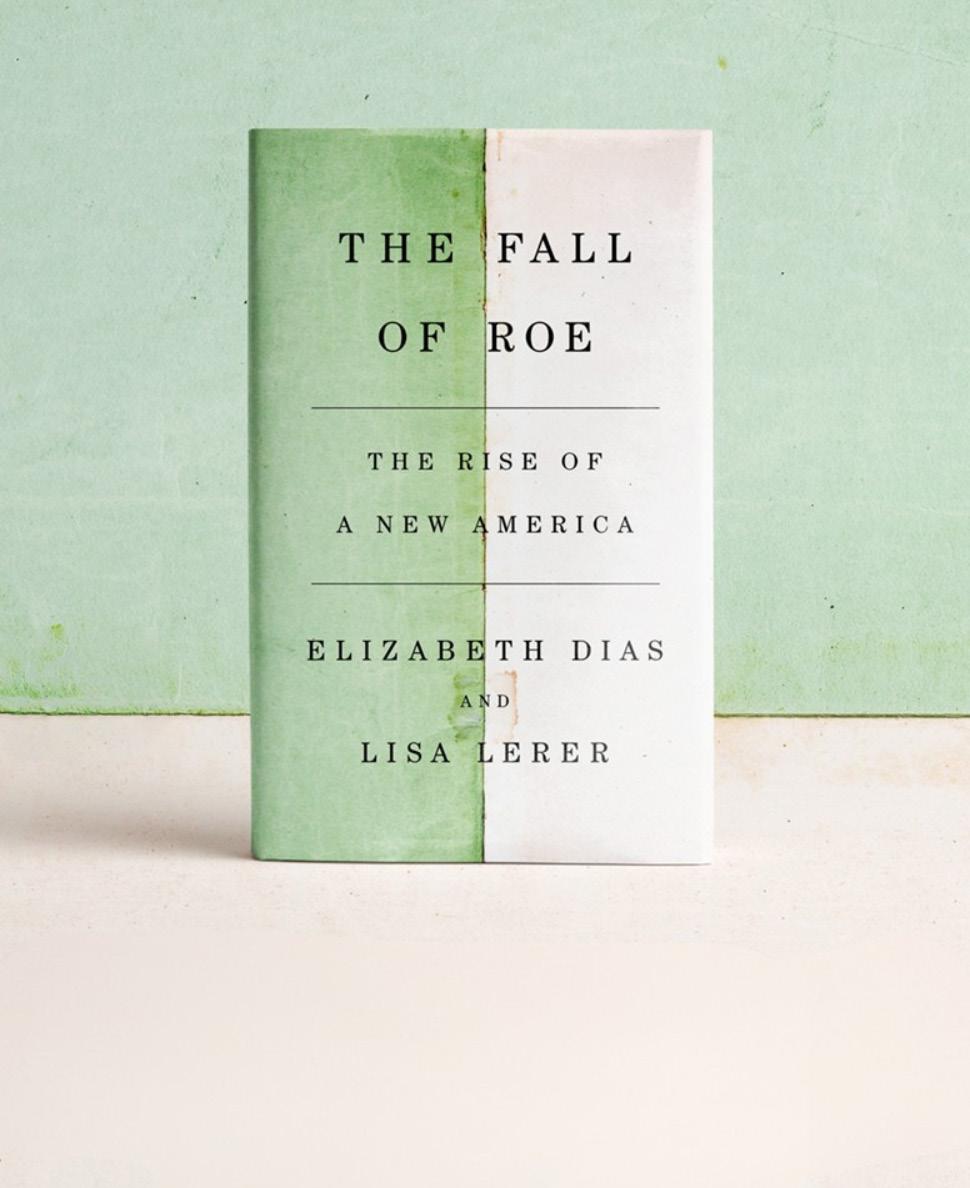
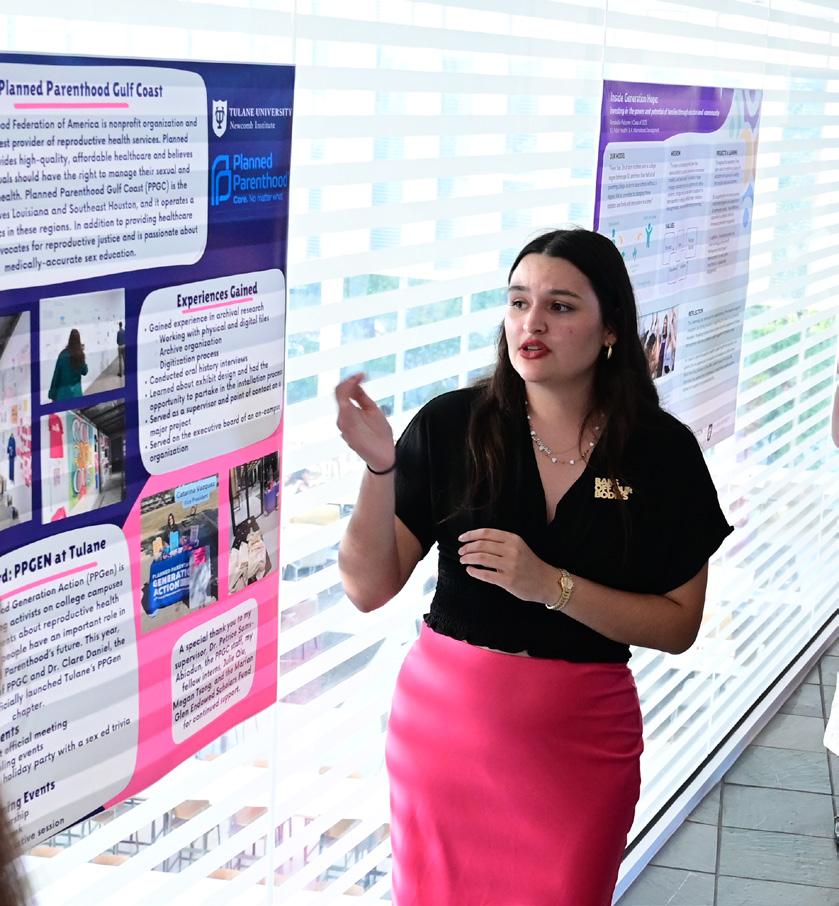
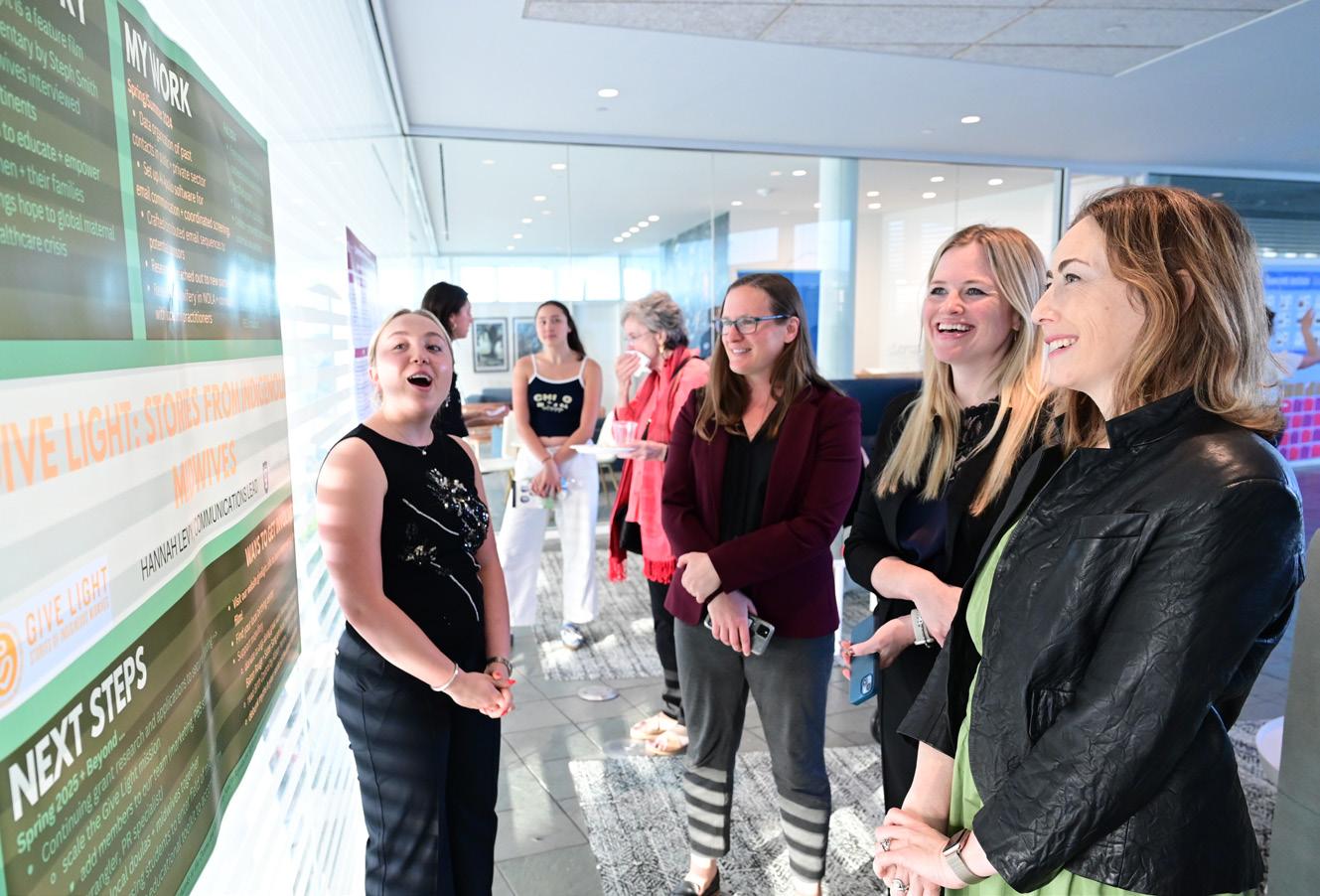
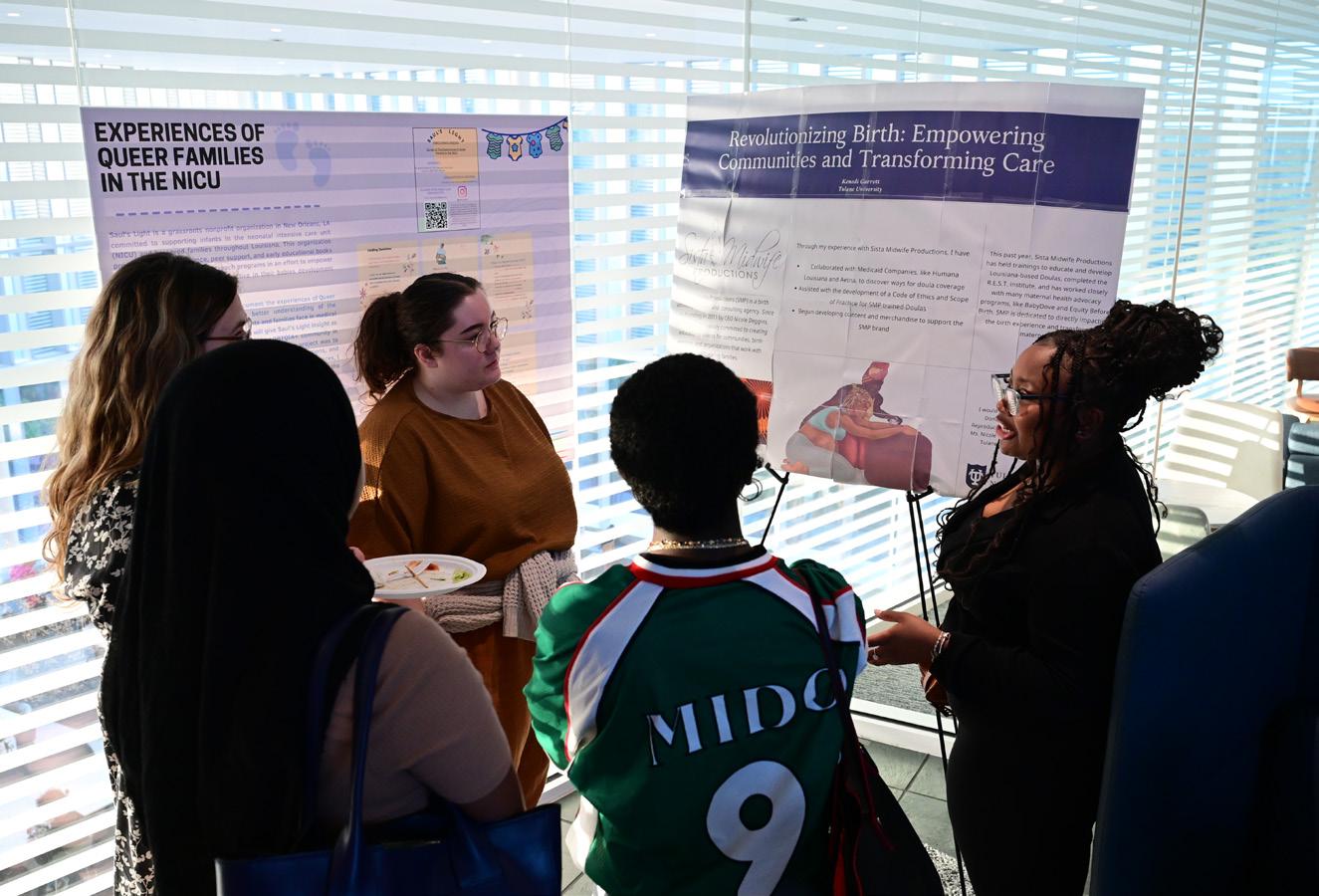
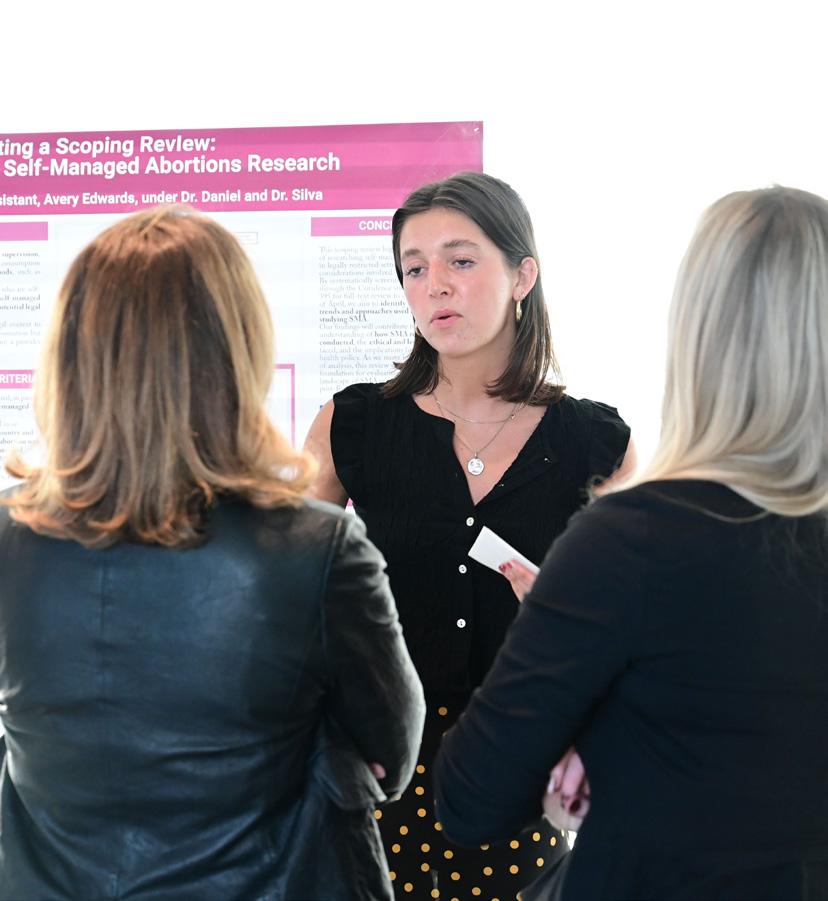
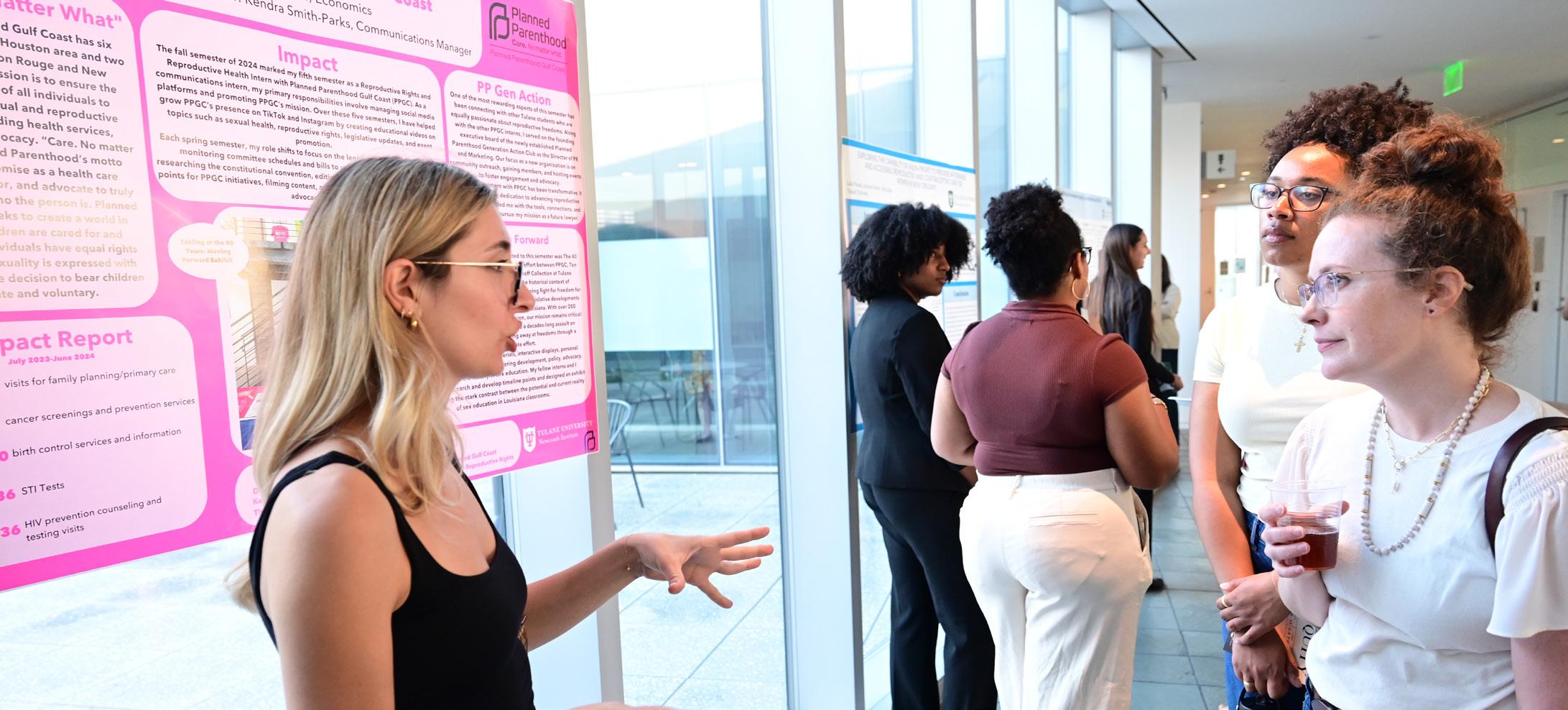
Sexual and Reproductive Health and Rights interns presented research posters of their work with local organizations during the Conceiving Equity event.
By Lillian Foster (LA ’27)
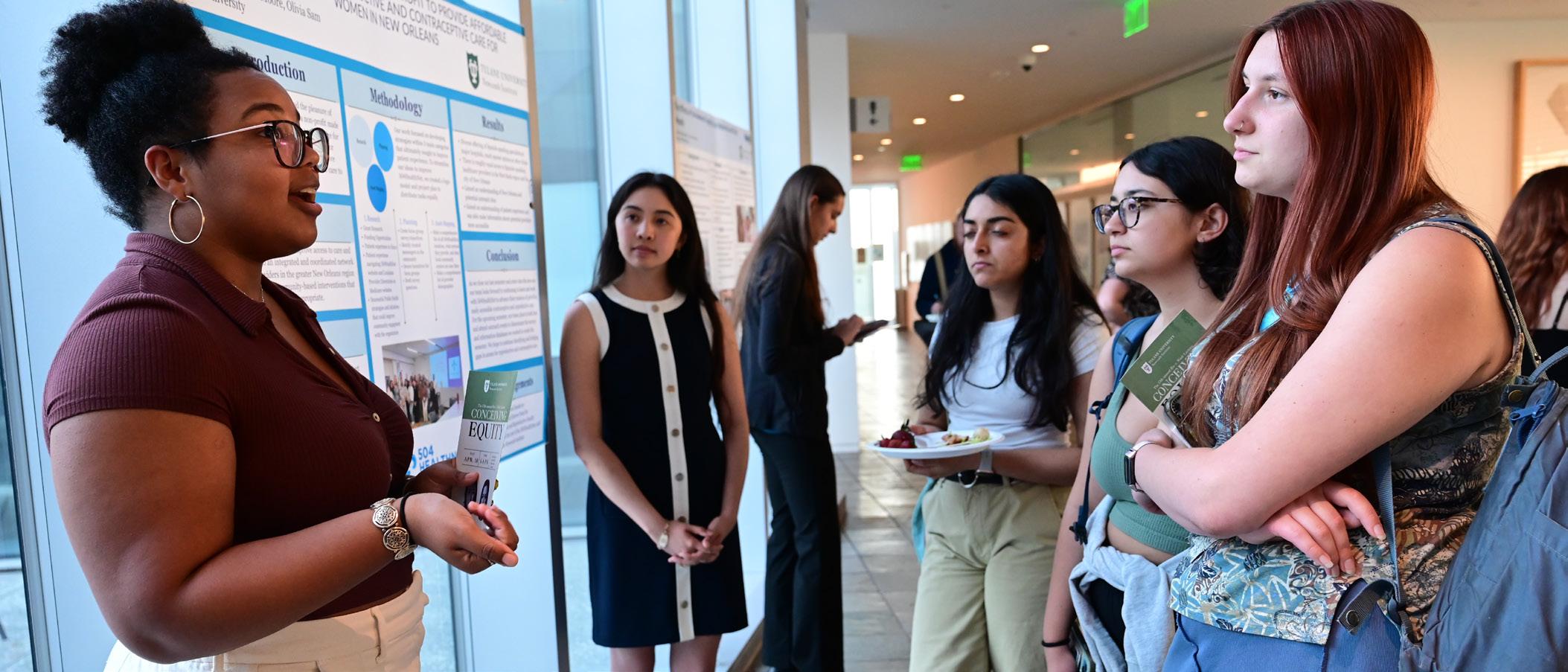
Autumn Moore (PHTM ’26) speaks to fellow Newcomb students about her internship at 504HealthNet during the Conceiving Equity event.
Justbefore the Roe v. Wade lecture, Sexual and Reproductive Health and Rights interns at Newcomb Institute presented research posters of their work at local community-based organizations. The program provides students with the opportunity to develop valuable skills and knowledge while working with local nonprofits. Poster presentations showcased students’ internship experiences and analyzed their impact on equity across the Gulf South.
Hannah Levy (SLA ’26), a junior, has interned with New Orleansbased cinematographer Steph Smith, who directed Give Light: Stories from Indigenous Midwives, since January 2024. Working under Smith, Levy conducted research on traditional midwifery and reached out to companies such as Delta Air Lines for sponsorship.
“Everyone at Newcomb Institute is great. We do intern meetings where I get to meet other people, which I really enjoy because we don’t really run in the same circles. I get to hear about others who are passionate about the same things as me that I wouldn’t otherwise meet on campus,” Levy said.
Give Light: Stories from Indigenous Midwives features firsthand accounts of midwives from across the globe. The award-winning documentary has been screened internationally, along with education sessions to boost awareness about midwifery and birthing experiences.
Similarly, sophomore Kenedi Garrett (PHTM ’27) interned with Sista Midwife Productions, a New Orleans-based nonprofit that works to increase the number of Black birth workers, support expectant families and generate a positive shift in the way individuals view midwives and doulas.
“This was my first internship ever, and Newcomb Institute made it so easy for me to get involved with my boss and the rest of the Institute staff. They’ve helped me broaden my knowledge on what reproductive care and reproductive justice looks like,” Garrett said.
While at Sista Midwife Productions, Garrett developed a code of ethics and scope of practice regarding doula reimbursement and aided in the process of sourcing Medicaid reimbursement for doula services.
Newcomb's internship program offers internship opportunities for students each semester and summer term.
The Newcomb Institute Sexual and Reproductive Health and Rights program is made possible by the Donna and Richard Esteves Fund for Reproductive Rights and Reproductive Health and the Bonnie and William Chapman Fund for Reproductive Health.
By Elyse Harrison & Toria Smith

Eachyear, the Newcomb Alumnae Association (NAA) honors Newcomb College and Tulane University graduates who have made exceptional achievements in their industries, contributed to their communities, and shown overwhelming dedication to their alma mater. These alumnae have represented Newcomb with distinction since their graduation, and all alumnae are invited to celebrate their achievements during Wave Weekend. The Awards Reception will be Friday, November 14 at 4 p.m.
This year’s recipients are:
Newcomb Alumnae Association Outstanding Alumna Nghana Lewis, PhD (NC ’94)
Dr. Nghana Lewis graduated magna cum laude from Newcomb College with a Bachelor of arts in English in 1994. She is currently a professor of English and Africana Studies, faculty affiliate of the School of Law, and adjunct professor with the Department of Psychology at Tulane. She also serves as a state district judge with Louisiana’s 40th Judicial District Court.
Dr. Lewis’s cross-sectional research and teaching interests include Black literary & cultural studies, Black women’s health, and juvenile justice. She is the author of Entitled to the Pedestal: Place, Race, and Progress in White Southern Women’s Writing, 1920-1945 (2009) and Black Women’s Health in the Age of Hip Hop & HIV/AIDS: A Narrative Remix (2025); she is also a founder and co-organizer of the Black Women’s Health Conference Task Force at Tulane University, which biennially convenes the Black Women’s Health Conference.
In 2021, Dr. Lewis launched the Literacy Clinic, a court-based preventionintervention program that supports literacy education for adults and youth involved in Louisiana’s criminal and juvenile legal systems and for families with children enrolled in Louisiana’s resourcechallenged elementary public schools. With funding from the Murphy Institute, she established the Political Economy and Access to Justice Judicial Education Seminar (PEAJJES) in 2022, to provide judges an academic framework for examining and formulating best practices for strengthening America’s justice system.
A proud native of Lafayette, Louisiana, and current resident of St. John the Baptist Parish, Dr. Lewis has devoted her professional life to the state of Louisiana through sustained advocacy, community-based research and program development. She has mentored and guided the career developments of hundreds of students, who are now educators, lawyers, doctors and public servants. For her leadership and contributions to her community, Dr. Lewis has received numerous awards and recognitions, including the Roddy Richard Lifetime Achievement Award, the Pro Bono Hero Award, an NAACP Award for Education and Representation and the Community Award from the School of Liberal Arts at Tulane.
Newcomb Alumnae Association Community Service Award
Dr. Abby Spencer, MD (NC ’98)
Dr. Abby Spencer serves as professor and vice chair for education in the Department of Medicine and as director of the Academy of Educators at Washington University School of Medicine in St. Louis. Dr. Spencer graduated summa cum laude and Phi Beta Kappa with a
BS in behavioral neuroscience from Tulane University and received her MD from the University of Pittsburgh School of Medicine. She completed her primary care internal medicine residency at the New York Presbyterian Hospital, Weill-Cornell Medical Center and subsequently completed a fellowship in general internal medicine with a concentration in women’s health and earned a master’s degree in medical education from the University of Pittsburgh. Dr. Spencer enjoys caring for patients in the inpatient and primary care setting with a particular interest in women’s health.
Dr. Spencer has dedicated her career to developing curriculum, building teams, mentoring, coaching, leading educational programs and developing others in medical education. She has delivered over 200 invited faculty development/educational courses and workshops locally, regionally and nationally. She has won numerous national awards for her teaching, educational scholarship, mentorship, sponsorship and leadership including the Society of General Internal Medicine (SGIM) National Brancati Leadership and Mentorship Award, SGIM National Scholarship in Education Award, Accreditation Council for Graduate Medical Education (ACGME) Parker J. Palmer Courage to Teach Award, American Medical Women’s Association (AMWA) Inspire award, the inaugural Washington University Advancing Women in Academic Medicine LEAD award and the national Association of Program Directors in Internal Medicine (APDIM) Dema C. Daley Founders award for leadership and innovation in medical education. In 2025, Dr. Spencer was recognized as a Fellow in AMWA for her advocacy and community service in supporting women in medicine. She completed the Executive Leadership in Academic Medicine (ELAM) fellowship in 2022, serves on the editorial board for the Journal of General Internal Medicine and the AMWA Board of Directors. Dr. Spencer has held leadership positions in many national organizations across academic internal medicine including founding SGIM TEACH faculty, councilor for the Association for Program Directors in Internal Medicine (APDIM) and currently serves as Association of Chiefs and Leaders of General Internal Medicine (ACLGIM) LEAD course director and on the ACGME Internal Medicine Review Committee as vice chair. Her greatest professional joys are mentoring, teaching, sponsoring and developing others.
Newcomb Alumnae Association
Young Alumna Award
Franziska Trautmann (SSE ’20)
Over 10 million more pounds of glass would be in landfills if not for Franziska Trautmann and her team at Glass Half Full. Started in the backyard of a college fraternity house in New Orleans, Glass Half Full recycles glass into sand for coastal restoration, disaster relief, new glass bottles and more. Trautmann, a Carencro, Louisiana native, graduated with a degree in chemical engineering from Tulane University. This gave her the skills necessary to help lead a research team backed by the National Science Foundation, conducting novel research on the use of recycled glass sand for coastal restoration. They have completed five coastal restoration projects, restoring thousands of meters of coastline and counting. In her spare time, Trautmann makes educational TikToks on topics ranging from
recycling to climate change to wastewater treatment. Her page has garnered over 300,000 followers and millions of views.
Alumnae
’72)
Andrea Ricards Lapsley has dedicated her career to expanding access to literacy and public education through libraries, both locally and globally. From early on, she learned the value of philanthropy and community from her parents. Giving of time and treasure has always been part of her life. The importance and value of education and literacy have always been forefront. A former banking and nonprofit executive, she led development and programming for the Houston Public Library for over two decades, where her award-winning initiatives, like the Power Card Challenge, brought over 300,000 new patrons to the system.
She currently serves as the president of the Texas Library and Archives Foundation (TxLAF) supporting the Texas State Library and Archives. She has been on the board since 2016 and president since 2018. Skilled in marketing, PR and fundraising, she has increased the Foundation’s membership and development opportunities. She currently is an executive board member of United for Libraries, a division of the American Library Association (ALA), where she serves as their division councilor to ALA Council, the governing body of the 46,000 member organization. She has been a member of ALA since 1989 and has held several positions, including president of the Library Leadership and Management Association. She has served on multiple unit and ALA committees, award juries and presidential task forces.
Lapsley has served in leadership roles with the American Library Association and currently leads the Texas Library and Archives Foundation. She began her library career at the Houston Public Library System where she worked for 20 years as the assistant director of marketing and development overseeing all library programming, development and public relations/communications. She created the One Book One Community program for Houston. She worked extensively with their Friends of the Library group and the library board. Prior to her library work, she worked for the United Way of the Texas Gulf Coast, the Houston Chamber of Commerce and Fannin Bank. Her advocacy helped secure over $200 million in state funding to support Texas libraries and archives.
Traveling extensively in South Africa brought her in contact with a rural primary school, Zwelisha, after the end of apartheid. Recognizing the need for books and materials for the students’ success, she raised funds to build a library. The library is stocked with books she had donated or bought. Today the library has more than 25,000 books and is used by 1,400 students and the community. Now in her 29th year of support, she continues to travel there annually.
Lapsley also gives back to the Newcomb community by organizing alumnae book clubs. Through every chapter of her work, Andrea has used the power of books to build stronger, more connected communities.
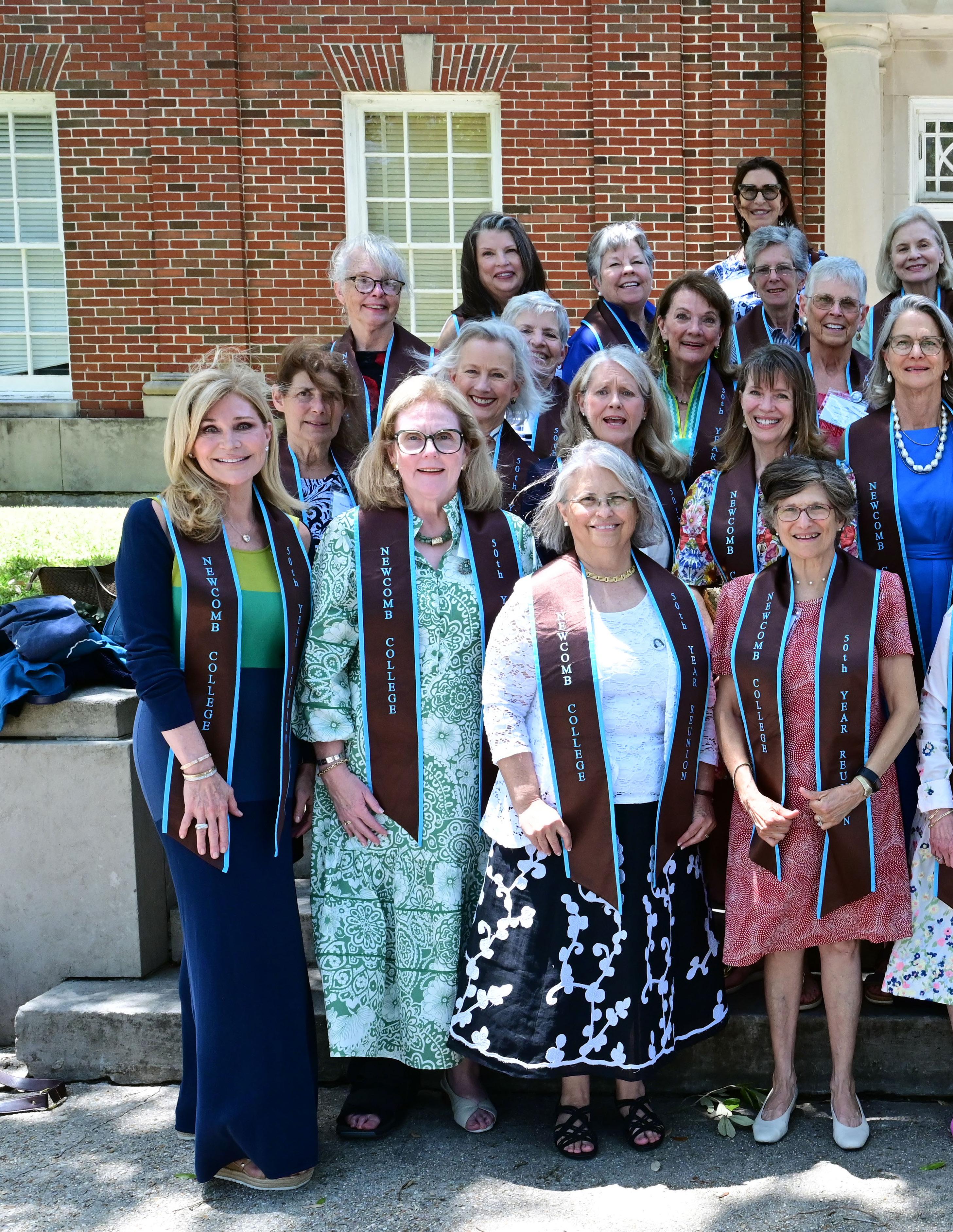
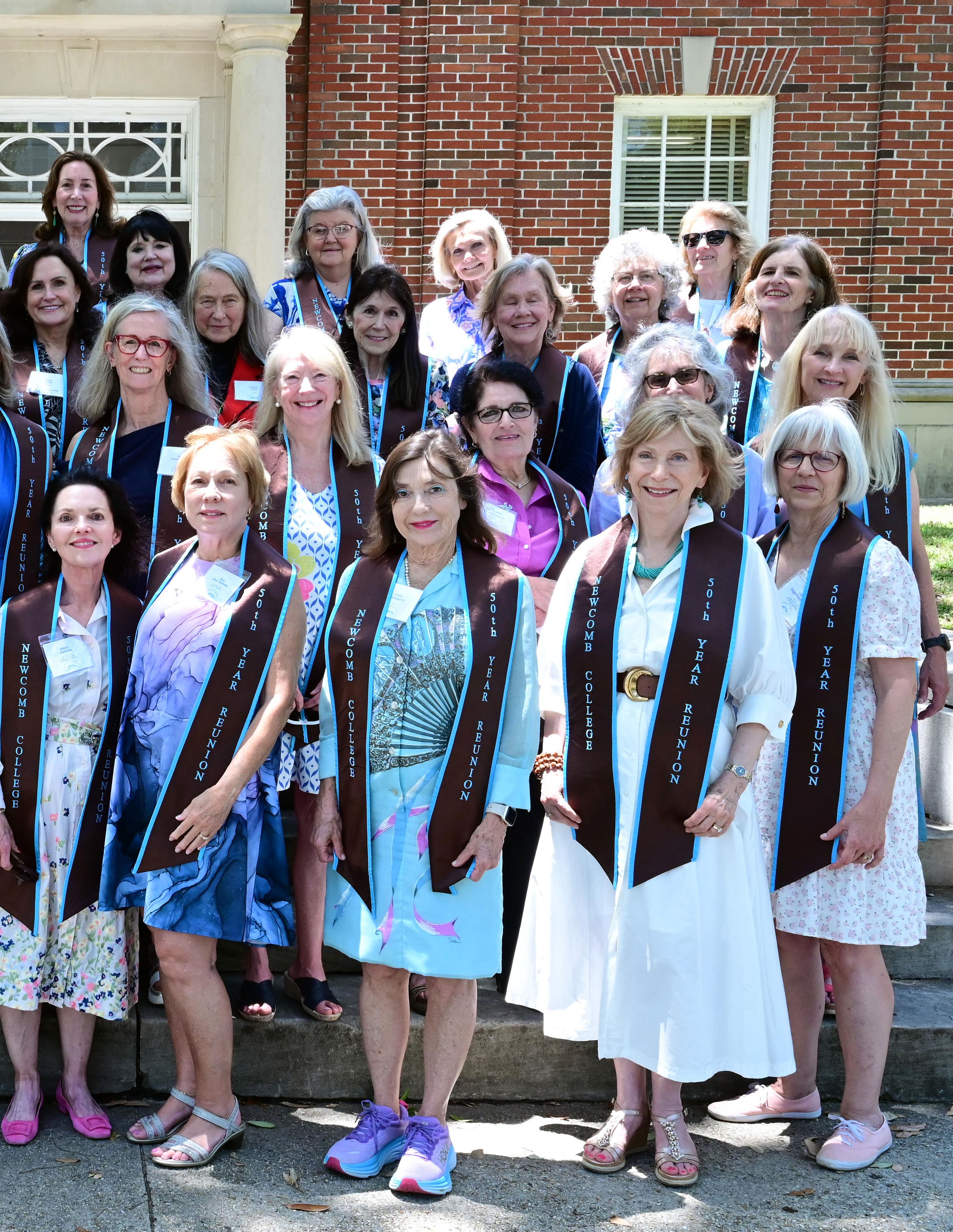
We appreciate the financial support of alumnae, parents, and friends. We proudly announce the donors to Newcomb Institute, including those that have made gifts to the Newcomb Alumnae Association, during the 2024-25 fiscal year. Thank you for your support. The Newcomb monies benefit today’s Newcomb Institute programs. Funds functioning as endowment and true endowments support the Newcomb Institute. Those amounts are now valued at approximately $66.3 million and generate $ 2.7 million for programs each year. The Newcomb Foundation Board ensures that the Newcomb Institute spends that money wisely. Named endowments support a variety of other activities, including lecture series, research grants, and the Newcomb Archives.
Donna and Richard Esteves have donated $3 million to Tulane University’s Newcomb Institute for the Donna and Richard Esteves Fund for Women’s Reproductive Rights and Reproductive Health, to which they have already given $1 million since establishing it in 2016. In honor of their generosity — and in recognition of Donna Esteves’ past service on the university’s President’s Council and the Newcomb Institute Director’s Advisory Council — Tulane is naming an academic wing, featuring three seminar rooms and the Institute’s administrative offices in the Malkin Sacks Commons, after the couple.
Laurel Adam
Jackson Adams
Parker Adams
Anissa Allbritton and Jack Allbritton
Vanann Allen
Sabina Altman
Kathryn Anderson and Larry Anderson
Bethlehem Andrews
Elsa Angrist
Anonymous Donors
Mary Arnold and Michael Arnold
Gina Arons and Ronald Siegel
Alpna Arora
Natasha Arora
Shaan Arora
Jeanne Ashley
Ava Attia
Teresa Auch and Michael Auch
Tara Auclair
Claire Avegno and Timothy Avegno
Lacey Baker
Rebecca Baker
Leslie Balch and Anthony Cipriano
Leland Baldwin and Robert Barnes
Françoise Le Gall and Jeffrey Balkind
Barbara Banner and Spencer Michlin
Lynn Barton and David Barton
Mary Bates and Nicholas Panayotopoulos
Claudia Baumgarten
Cynthia Beaird and Williard Beaird
Alison Bedell
Elizabeth Bellino and Peter Towns
Christine Bellino and Thomas Bellino
Joan Benjamin
Joan Bennett and David Peterson
Stephen Berg
Courtney Berman
Shira Berman
Ettie Bernie
Jenny Berry
Lisette Betancourt
Claudette Bienvenu
Julia Bland and Wilton Bland
Ellen Blue
Susan Borrelli
Mary Bostick
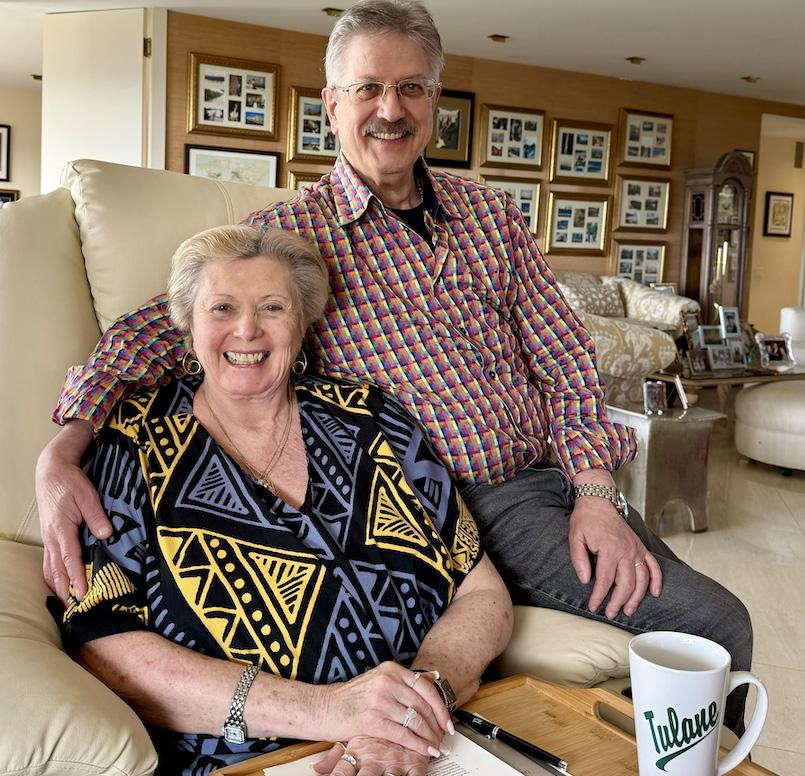
Martha Boswell
Lori Boswell and William Boswell
Margaretta Bourgeois and Lionel Bourgeois
Marie Bourgeois and Patrick O'Connor
Shannon Brady and Richard Brady
Mary Ann Brame and Scott Brame
Kathleen Branley
Elizabeth Brannon
Virginia Breedlove
Lindsay Brice
Barbara Bridges
Helen Brooks
Julia Broussard and Daniel Thompson
Paula Brown
Sheila Brown and F. Futterer
Katherine Broyles
Norma Bruce and Robert Bruce
Tosca Bruno-van Vijfeijken and James Bruno
Allison Buchalter and David Buchalter
Barbara Burk
Jessica Burt
Eurydice Bush-Harrison and Darryl Harrison
Denise Butler
Nancy Cadwallader and Daniel Cadwallader
Shala Carlson
Pamela Carnot
Kelsey Casano
Jane Cease
Bonnie Chapman
Elizabeth Cheesborough and George Owensby
Sarah Christie and Chadwick Christie
Chelsea Cipriano and Taylor Conrad
Holly Clement and Stephen Clement
Adele Cohen
Susan Collat
Jeannette Cook
Susan Cook and Clayton Cook
Martha Cooper
Heather Corbett
Katherine Cordova
Mary Ann Couch and Ellis Couch
Kaye Courington
Mary Cox
Jessica Creighton
Lisa Cristal and Bruce Cybul
Lindsay Cronk
Lania Cross
Mildred Currie and William Basco
Susan Currie
Allison Dandry and Bobby Dandry
Clare Daniel
Jennifer Daniel and Sara Slaughter
Sherrine Daniel
Andrea Daniels and Michael Daniels
James Daniels
Suzanne Danilson
Barbara Danos and Robert Danos
Frank Daspit
Frances Day and Richard Day
Michelle Delen and Franciscus Delen
Mary Dickson and Brooke Dickson
Mary Dietrich O'Reilly and Peter O'Reilly
Etta Dimitry and Richard Dimitry
Alandas Dobbins
Emily Doliner
Emma Dong
Joan Donovan and Robert Donovan
Annette Doskey
Clare Doyle
Hannah Duggan and John Nanfro
Linda Dunn
Elizabeth Duplantier
Marian Durfey and Allan Durfey
Elizabeth Dwyer
Catherine Edwards and David Edwards
Ellen Eglin and Thomas Eglin
Paula Eichenbrenner
Janice Elkin and David Elkin
Lauren Elkin and Matthew Jasie
Donna Esteves and Richard Esteves
Samantha Ethel
Stacie Goeddel and Michael Etheridge
Merri Ex and Mitchell Ex
Nancy Fellman and Ronald Fellman
Laura Felt and Robert Felt
Jill Fisher and Geoffrey Fisher
Amy FitzGerald and Todd FitzGerald
Carter Flemming
Bernadette Floresca
Ann Owens and Robin Forman
Leslie Franklin and Steven Franklin
Charles Freeman
Lauren Gaines
Judith Gainsburgh
Nancy Gajewski
Emily Galik
Sean Gallahan
Emily Garner and Douglas Garner
Mary Garrard
Katherine Gehr and David Gehr
Dana Gerard and Quin Gerard
Kimberly Frusciante and Taylor Gilbert
Elizabeth Gilmartin and J.J. Gilmartin
Rebecca Gipson and Ryland Gipson
Lisa Roberts and David Glass
Louisa Gleichman
Kimberly Glinert and Kenneth Glinert
Nancy Goedecke
Jacqueline Gold and Melvin Gold
DeAnn Golden and Craig Camasta
Doris Goldstein and Martin Goldstein
Donna Golub and Seth Golub
Abbey Graf and Jason Graf
Emily Greenfield and Aaron Viles
Mickey Greeson and Sharon Greeson
Susan Griffin and John Griffin
Cheryl Grisson
Judy Grosz and Keith Grosz
Maggie Grove and David Grove
Patricia Gruenberg and Alan Gruenberg
Nicolette Guillou
Allyson Halperin
Beth Hammerman and Neil Hammerman
Adia Handy
Renita Handy
Jacqueline Hantgan and Josh Zweiback
Lizabeth Harbin and Rodney (Rod) Harbin
Beatrice Harley
Gwen Harley and George Harley
Shanna Harper
Elizabeth Harrison Meyer
Elyse Harrison
Cynthia Harter and John Harter
Michelle Hatzis-Sullivan and John Sullivan
Kirsten Hawkins
Claire Hayes and G. Hayes
Ashley Hedemann and Stephen Hedemann
Rosaria Heide and Rudolph Heide
Jean Hendrickson and Robert Hendrickson
Jane Henning and Standish Henning
Julie Henriquez Aldana and Mynor Aldana
Paola Henriquez
Maggie Herman
Vicki Herman and Mark Herman
Martha Higgins and Christopher Higgins
Daphne Hill
Winifred Hills and John Hills
Lisa Hirsch-Solomon and Andrew Solomon
Nancy Hoffman and Phillip Hoffman
Paula Hoffman
Margaret Wild-Hogan and David Hogan
Elizabeth Holloway
Reva Holmes and Michael Holmes
Sarah Horrigan
Charlotte Hubbell and Fred Hubbell
Julia Hughes
Perri Huitt
Patricia Hurley and Kim Hill
Amie Hurst Adams and Gregory Adams
Ellen Hurwitz
Andrea Huseman and Jeffrey Huseman
Mary Lynn Hyde and Steven Rossi Camellia
Jacobs and Steven Jacobs
Mindy Jaffe and Irvin Jaffe
Caroline Jarboe and Brian Jarboe
Ella Jeffries
Talya Jeffries and Howard Jeffries
Beth Sundstrom and Bryan Joffe
Amanda Johnson
Beth Johnson
Isabella Johnson
Sabrina Johnson and Vincent Johnson
Terry Joiner
Cheryl Josephs-Zaccaro
Karen Kahn Weinberg and Daniel Weinberg
Ricki Kanter and Joel Kanter
Susan Kantrow and Byron Kantrow
Alexis Kaplan
Angela Keesee
Esther Kelly and Francis Kelly
Kathleen Kelly
Jessica Kennedy
Diana Khajautia-Bharucha
Stanley Khorosh
Suzanne Kinney and David Kinney
Anne Kocher
Jaye Kreller
Laura Kreller and Christopher Reeves
Molli Kuenstner
Rachael Kuntz and Shawn Kuntz
James Kuriath
Amelie Lanaux and Pierre Lanaux
Jacklyn Lane
Allison Lange
Andrea Lapsley and Robert Lapsley
Constance Larimer
Nancy Lassen
Laura Leach and Richard Lawrence
Ashley LeBlanc and David Curtin
Susan Lebow
Darilyn Lee
MaryBeth Leff and Jonathan Leff
Edward Legum
Blaine Legum-Levenson and Stephen Levenson
Alison Lehrer
Mary Ann Leo
Lawrence Lesperance
Lisa Lettau
Andrea Leverentz
Claudia Levin and Brandon Levin
Sharan Lieberman and Jordan Karlitz
Barbara Lief
Sandra Lipsitz and Louis Lipsitz
Barbara Livingston and Milton Livingston
Nia Lizanna
Loretta Loftus
Leann Logsdon
Geneva Longlois-Marney
Elizabeth Lopez
Alyssa Lovelace
Irene Lutkewitte and Thomas Lutkewitte
Katie Lynn
Janet MacDonell
Susan Mackler
Anna Mahoney and Patrick Mahoney
S. Mahorner
Catherine Makk
Sarah Mallonee
Denise Malone and Thomas Malone
Barbara Mansberg
Lori Maran and P. Maran
Diane Marcus
Helen Marsh
Suzanne Martin and Terry Martin
Theresa Martin
Mariana Martinez and Adam Martinez
Caroline Marvel
Kristen McCabe
Carolyn McCall
Rowena McClinton
Sonia McCormick
Mary Helen McCoy and Stephen McCoy
Ellen McGlinchey and Charles Monsted
Meredith McInturff
Katherine McLean
Kathleen McManus and Jorn Flatvoll
Sandra McNamee and Douglas McNamee
Madeline McNear
Patricia Meadows and William Meadows
Ann Meehan
Catherine Memory and Robert Memory
Melissa Mendoza and Charlotte Green
Katharine Merrell and James Merrell
Kimiko Meyers and Charles Meyers
Naomi Meyers
C. Courtenay Miller
Elaine Miller and Aaron Stambler
Leslie Miller and Brett Miller
Nancy Miller
Jennifer Mills
Priscilla Mims
Christina Miranda
Andrea Moffitt and Steven Moffitt
Mary Sandra Moise and Charles Moise
Ellen Monsees and Martin Monsees
Rachel Moody
Robin Morris and Jeffery Morris
Lamar Murphy and William Murphy
Alison Nelson and David Nelson
Theodora Nelson
Paula Newman and Robert Newman
Charles Nice
Jewelynn Nice
Amanda Nichols
Susan Nifenecker and Eugene Nifenecker
Jane Nighbert and Richard Nighbert
Colleen O'Donnell
Jeanne Olivier
Anneke Olson
Judith Olson and Leonard Olson
Martine Olson-Daniel and Nathan Olson-Daniel
Joanne Omang and David Burnham
Linda Orbach and Alexander Orbach
Statira Overstreet and W. Rich
Clare Owensby
Rachelle Parker and Nathan Parker
Marilyn Davis and Robert Passikoff
Janki Patel
Sybil Patten
Ann Pearce and Maunsel Pearce
Erin Peck
Marilyn Pecsok
Aditi Pemmaraju and Naveen Pemmaraju
Katherine Peres and Seth Krieger
Jessalyn Peters
Deirdre Phillips
Jessica Phillips
Paula Picker and Joel Picker
Suzanne Plaisance and Autrey Plaisance
Genevieve Pope and Jeremy Hunnewell
Catherine Posey
Paula Powers and Bernard Powers
Rebecca Powers
Andrea Price and Todd Price
Lee Prina
Dana Pudenz
Lindsey Purcell and James Purcell
Laura Purswell and Michal Purswell
Julie Qiu
Joseph Quarles
Maureen Quinn
Sarah Quintano
Mary Radford and Robert Dana
Linda Rafferty and Scott Rafferty
Anita Raj
Pooja Kharbanda and Atul Raj
Chathan Raj
Romesh Raj
Margaret Ratliff
Dana Ray
Elizabeth Reed
Jill Reynolds
Lisa Rice and Thomas Thompson
Martha Richard and Thomas Richard
Anne-Marie Richeme-Zweidler and Daniel Zweidler
Heather Rittenberg and Leon Rittenberg
Amanda Roberts and Sean Roberts
Shelley Roberts and Jeffrey Roberts
Kathryn Roman and James Roman
Camille Rome and Gregory Rome
Katharine Rose and Crawford Rose
Sharon Roth
Stephanie Rubin and M. Hooks
Nelle Sacknoff
Ann Salzer
Megan San Martin
Ruth Sang
Teresa Santa Coloma and Lynn Pyke
Christine Santhin
Carolyn Saunders
Sallie Scanlan
Lisa Scanlon and Sean Scanlon
JoAnn Schaub
Danette Schilling and Daniel Schilling
Janet Schinderman and Alberto Zmud
Alexa Schwartz and Victor Leyva
Julie Schweitzer and Richard Schweitzer
Maria Sebastian
Nancy See
Sandra Segel
Brittney Sheena
Michelle Sheena
Helene Sheena and Ronnie Sheena
Joan Shorter and Joseph Shorter
Lauren Siegel
Jay Silverman
Leonard Silverman
Yelena Silverman
Dee Silverthorn and Andrew Silverthorn
Jennifer Simmons and Michael Dunn
Jennifer Simoneaux and Robert Simoneaux
Lisa Simpson Hoover
Sherri Sklar and Jeffrey Sklar
Aidan Smith and Patrick Sullivan
Ashley Smith
Carol Smith
Christine Smith and Charles Smith
Nancy Smith and Mark Sirdevan
Leah Snyder
Melissa Sopher and Eben Timko
Luther Stacy
Ellen Stein
Jane Steinberg and Alan Kraut
Judith Steinberg
Melissa Striner and Jerome Steiner
Sarah Stevens and Thomas O'Toole
Rachel Stickney
Susan Stine
Carol Stivrins and Timothy Stivrins
Nicole Stone and Robert Stone
Jennifer Stowe
Kathleen Sukenik and Greg Sukenik
Jill Sullivan
Joanne Sullivan
Karen Sullivan and Michael Sullivan
Raleigh Susskind
Stephanie Swain
Nicole Tangen and Darren Tangen
Tammy Thaggert
Beena Thannickal and Victor Thannickal
Sarah Therriault and Russell Therriault
Stephanie Thibault and Kirk Thibault
Jakana Thomas
Patrice Thomas
Jenetta Thompson
Kathleen Timmins
Alisa Toney
Elena Toulios and Christopher Oliver
Sandra Turkel and Richard Turkel
Shelly Tyler and Emmett Kron
Barbara Unkel
Lianne Urada
Lisa Usdan and David Portnoy
Dolores Valtierra
Janice VandenBrink and Randy VandenBrink
Carmen Varley and John Varley
Carol Vatz and Joel Rosch
Catarina Vazquez
D. Veta and Mary Ann Dutton
Robbert Vorhoff
Claudia Ware
Joan Watkins
Susan Wedlan and Harold Rosen
Jocelyn Weinberg
Lauren Weinberg and Jordan Weinberg
Sue Robin Weinhauer and Robert Weinhauer
Riki Weinstein and Daniel Morrison
Martha Wells
Caroline Wendt
Lauren Wethers
Catherine Whalen and John Whalen
Mary Widmann and Harry Widmann
Nancy Wiener
Emily Wilkerson and Matthew Dupre
Sandra Willen and Jon Willen
Breegan Willey
Beth Willinger and Ian Lambert
Carol Wise
Judilyn Wise and Michael Wise
Marta Withers and John Withers
Amanda Wolfe and Jonathan Hackerman
Laura Wolford and Daniel Sharp
Susan Worley
Heather Yanak
Paula Zielonka and Carl Zielonka
Barbara Anne Zinker
Ronna Zoll and Steven Zoll
Emily Johnson-Zuppert and Robert Zuppert
American Endowment Foundation
Betancourt Stuttering Center
Birmingham Jewish Foundation
Blue Grass Community Foundation
Charities Aid Foundation of America
Community Foundation of Greater Des Moines
Delta Air Lines Foundation
Fidelity Charitable Gift Fund
Greater New Orleans Foundation
Hampton Roads Community Foundation
Hopewell Fund
Fred and Charlotte Hubbell Foundation
Jarvis Foundation
Kahn Education Foundation
Kanter Family Foundation
Morgan Stanley Global Impact Funding Trust Inc.
National Philanthropic Trust
Ross-Merrell Associates
Shell Oil Company Foundation
Vanguard Charitable Endowment Program
M.B. and Edna Zale Foundation
To make a gift, visit giving.tulane.edu/nci or use the QR code above.
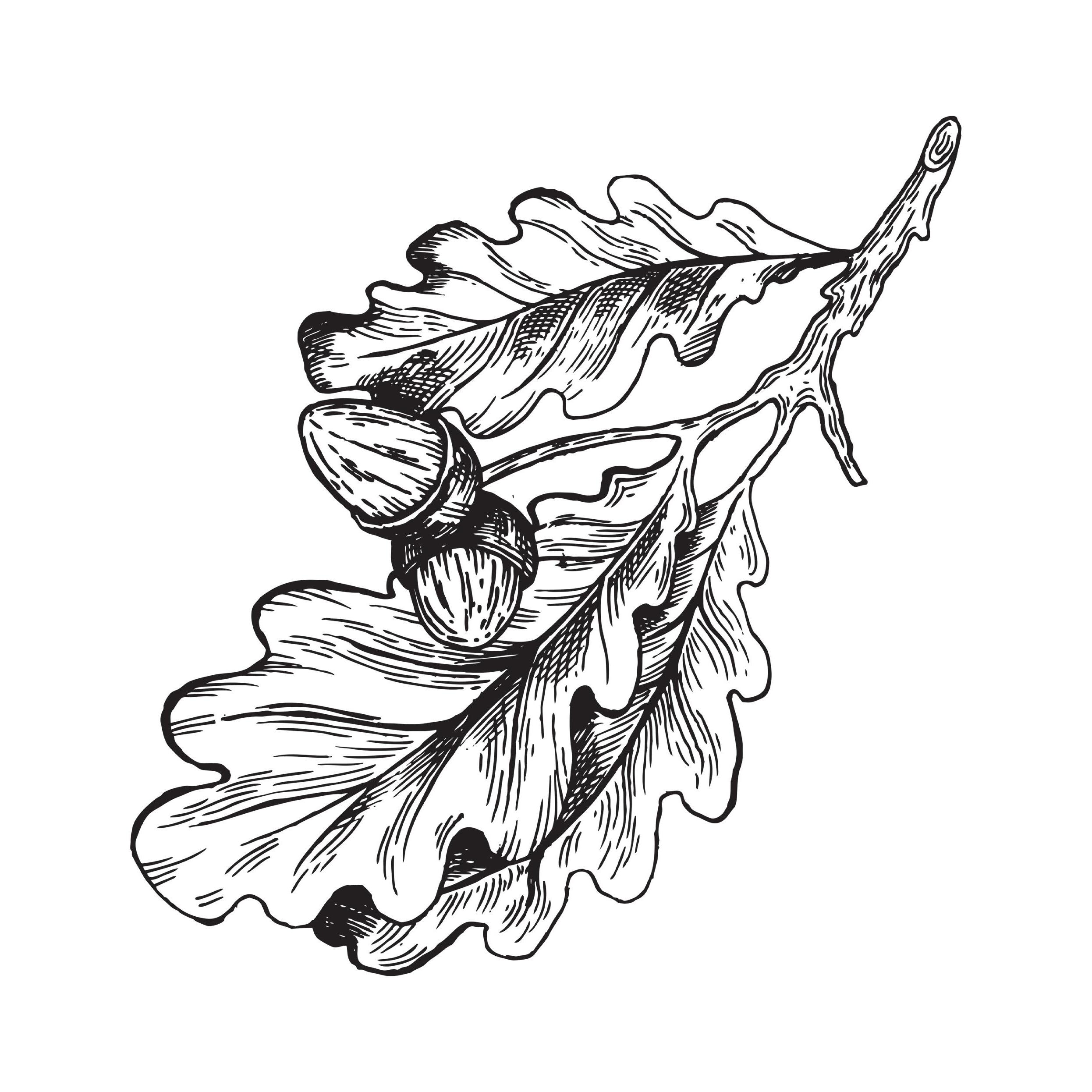
The H. Sophie Newcomb Memorial College Institute remembers the Newcomb College alumnae who have passed away in the last year.
Aline Longino McQuade (NC ‘51)
Alisa Strauss Warm (NC ‘90)
Alison Reimers Lyell (NC ‘62)
Amy Johnson (NC ‘99)
Andree Briant Lago (NC ‘55)
Ann Staples Perkins (NC ‘65)
Ann Richardson Peters-Calhoun (NC ‘53)
Ann Nicoll Baynard (NC ‘53)
Ann Franklin Maxwell (NC ‘53)
Ann Dubuisson Sturgill (NC ‘57)
Ann Marie Gandolfo Smith (NC ‘57)
Anne Jester Turner (NC ‘60)
Anne Robertson Sellin (NC ‘62)
Anne Pake Lowenburg (NC ‘50)
Ashley Beckerman Evans (NC ‘03)
Barbara Rosen Polmer (NC ‘68)
Barbara Kington Baldwin (NC ‘53)
Barbara Cohn Marcus (NC ‘53)
Barbara Dee Jacobs (NC ‘56)
Beth Boston Tedesco (NC ‘82)
Betsie Gillespie Tremant (NC ‘48, SW *53)
Betty Chen (NC ‘88, B ‘88)
Beverly Bringle (NC ‘60)
Bonita Rubenstein Dannen (NC ‘62)
Brooke Ray Arthurs (NC ‘70)
Carol Kaplan Segal (NC ‘55)
Carol Hamrick Ammons (NC ‘47, G *49)
Carole Mouchet Eubanks (NC ‘57)
Caroline Sutter Nusloch (NC ‘61)
Catherine Porter Hannahan (NC ‘63)
Cathy Goldstein Tasman (NC ‘69)
Cecile Felsenthal Prager (NC ‘61)
Chalita Menendez Baehr (NC ‘46)
Charlene Kaplan Smith (NC ‘52)
Clarisse Steeg Schleichardt (NC ‘43)
Claudia Borman Ware (NC ‘76)
Dana Boatwright (NC ‘98)
Deanna Schloegel Castanedo (NC ‘63)
Deborah Hacker (NC ‘87)
Deirdre Burke Provosty (NC ‘53)
Donnelly Eustis Rembert (NC ‘66)
Dorothy Johnson Callahan (NC ‘47)
Dorothy Iley Rogers (NC ‘50, G *52)
Elaine Dreyfus Lieber (NC ‘50)
Ella Montgomery Flower (NC ‘67)
Emilie Jane Dowrick Roeling (NC ‘51)
Eugenie Ricau Rocherolle (NC ‘58)
Eugenie Wilson Alsobrook (NC ‘56)
Frances Murphy (NC ‘91)
Geraldine Dye Parker (NC ‘49)
Harriett Drucker Rosin (NC ‘64)
Helen Barkerding Kammer (NC ‘72)
Imogene Whyte Murphy (NC ‘56)
Ina Lee Edrehi Sear (NC ‘52)
Jamie Covell (NC ‘68)
Jan Mercer Brown (NC ‘57)
Jane Armstrong Zimmerman (NC ‘47)
Jane Huff Caserta (NC ‘61)
Jane Pearlstine Meyerson (NC ‘53)
Jane Babst Truett (NC ‘60, B *86)
Jeanne Labouisse Cummings (NC ‘57)
Joan Kochman Weil (NC ‘65)
Joan Gillis Inman (NC ‘49)
Joan White Anderson (NC ‘52)
Joyce Caldwell Randazzo (NC ‘50)
Judith McNamar Howland (NC ‘65)
Judith Smith (NC ‘62)
Judith Agster Smith (NC ‘68)
Julia Claverie Gooch (NC ‘61)
Karen Kravtin-Shadrick (NC ‘85)
Kathleen McCarthy (NC ‘77)
Kelly Luck Cushing (NC ‘91)
Laura Herring Tanner (NC ‘64, L *67)
Laura Shiffman Cheney (NC ‘89)
Leila Rossner Thissell (NC ‘57)
Linda Lane Farmer (NC ‘67)
Lisa Young Donely (NC ‘59)
Lois Seidenbach Shepard (NC ‘47)
Lorraine Alexander Baroco (NC ‘66)
Lucie Pasquier Harris (NC ‘63)
Lynn McClure O’Brien (NC ‘55)
Lynne Trist Brennan (NC ‘56)
Marcia Suthon Pottle (NC ‘58)
Margaret Young Bell (NC ‘93, B *10)
Margaret Maier (NC ‘53)
Margot Klein Astrachan (NC ‘57)
Marilyn Hilbert Ruckstuhl (NC ‘57)
Marilyn Hoppmeyer Davidson (NC ‘51, G *53)
Marion Green Bolks (NC ‘48)
Marjorie Meriwether Milhas (NC ‘50)
Marjory Manget Lyman (NC ‘56)
Martha Fearon Mims (NC ‘68)
Martha Davis Odom (NC ‘59)
Martha Amsler McGlynn (NC ‘80)
Mary Touff Feldman (NC ‘78)
Mary Soulé Conroy (NC ‘49)
Mary Coutret Woodman (NC ‘58)
Mary O’Quinn Rowland (NC ‘61)
Mary Land (NC ‘55)
Mary Hanemann Lystad (NC ‘49, G *55)
Mary Foster Kock (NC ‘51)
Mary Akin Colbert (NC ‘57)
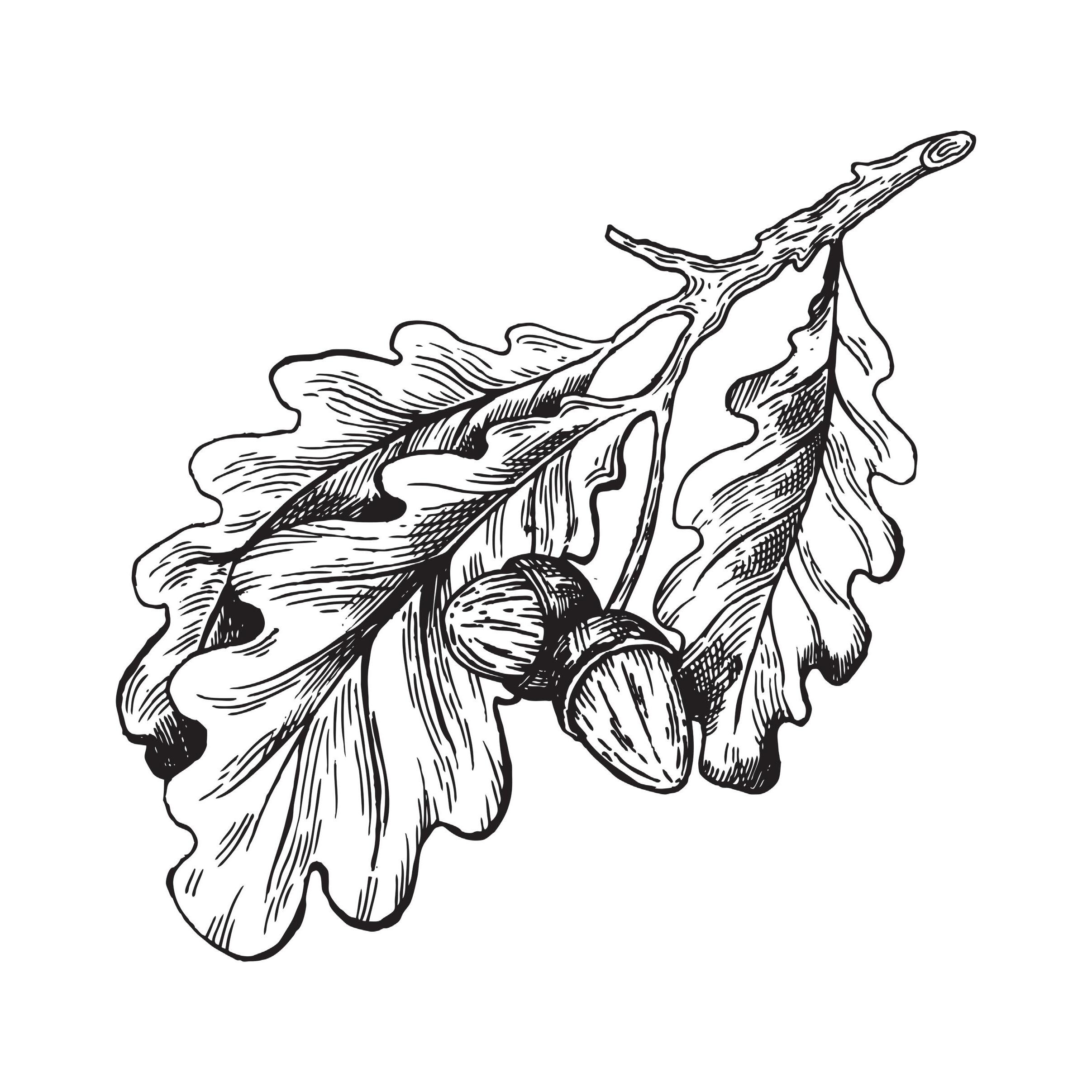
Mary Hebert McCowan (NC ‘65)
Mary Mears Gleason (NC ‘67)
Mary Anne McAlpin (NC ‘71)
Mary Elizabeth Patton Lamon (NC ‘52)
Myra Slawson (NC ‘55)
Patricia Coco Ellis (NC ‘65)
Patricia Ryan (NC ‘55, G *59)
Patricia Murphy Ames (NC ‘58)
Patricia Phillips Weiss (NC ‘57)
Rachel Sweeney Green (NC ‘01)
Ragan Kimbrell (NC ‘70, SW *76)
Rebecca Whitten Provenza (NC ‘72)
Rita Herold Hankins (NC ‘68)
Robin deArmas Terrebonne (NC ‘63)
Rosemary Janssen Orphys (NC ‘45)
Rozanna Brady Levine (NC ‘60)
Ruth Simon Rosenthal (NC ‘45)
Sandra Buzzalini Collie (NC ‘72)
Sandra Rosen Luxenberg (NC ‘59)
Sandra Brener Rosenthal (NC ‘64, G *65, G *67)
Sandy Bagalman Gittleson (NC ‘63)
Sarah Britton Neal (NC ‘57)
Sharon Weisler Leader (NC ‘74, SW *75)
Sherry Zox (NC ‘72)
Shin-Wei Fernandez (NC ‘89)
Shirley Mexic Watsky (NC ‘48)
Sidonie Evans Schmidt (NC ‘60)
Susan Simonton Tillinghast (NC ‘73, G *75)
Susan Valentine (NC ‘65)
Suzanne Peissel White (NC ‘64)
Sybil Cohen Adler (NC ‘68)
Sylvia Stahl Sterne (NC ‘54, G *74)
Teresa Schleh Bruff (NC ‘88)
Thomasine Kimbrough Kushner (NC ‘61)
Tuere Franklin (NC ‘99)
Virginia Bowen White (NC ‘49)
Vivian Eigenbrod Miller (NC ‘48)
Zelpha Corkern (NC ‘56)

